#for you to have found family expectations it can repeatedly subvert.
Text
BnHA Chapter 301: All My Todorokis
Previously on BnHA: We learned that when a bunch of superpowered villains are suddenly set loose with nobody around to stop them, things get fucked pretty quickly. Old Man Samurai and a bunch of other useless people decided to make “I pretend I do not see it” their new mantra, and resigned. Endeavor had a moment of despair on account of being crushed by the guilt of having ruined the lives of himself, his family, and basically everyone else in the entire world. For various reasons the heretical notion of “person who has done bad things feels sorry for doing them” sent fandom spiraling into a meltdown, so that was fun. The chapter ended with the entire Todoroki clan descending upon Enji’s hospital room to have a dramatic chat about Touya and All That General Fuckery.
Today on BnHA: Horikoshi is all “here’s the story of how Baby Touya slowly went insane trying to win his father’s love.” It’s a tale full of subverted expectations and heartbreaking inevitability, and also like twenty panels of the cutest fucking kids who ever existed on planet earth, who are so fucking cute that I can’t stop thinking about their cuteness even with all of the horrifying family tragedy unfolding around them. It is absolutely ridiculous how cute they are. Touya is out here pushing his tiny body past its limits because he inherited the same obsession as his dad and neither of them can put it aside even though it’s destroying them, and yet all I can think about is Baby Shouto’s (。・o・。) face. Anyways what a chapter.
so I have to confess that even though I managed to avoid being caught off-guard by the early leaks, the number of people reblogging my Endeavor posts from earlier this week and using the tag “bnha 301” kind of gave me an inkling that this chapter will include more Tododrama lol. that said, I don’t know anything else about it, so we’re still good spoiler-wise
AHHHHH FLAHSBAKC AHHHH. omg I know I typoed the shit out of that, but I’m just going to leave it lol I think it’s fitting
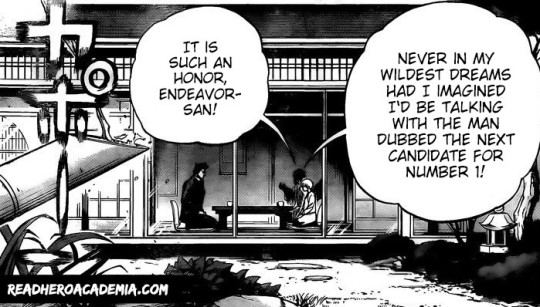
holy shit holy fuck. so this is Rei and Enji’s first meeting, then??
yepppp, oh shit
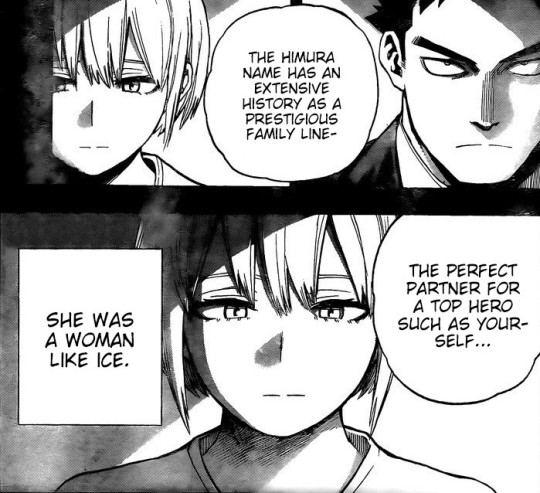
so wait, I know this is not even the slightest bit important, but are they meeting at Enji’s home or Rei’s? because I always figured that Enji was the one with the super-Japanese aesthetic, but maybe that was Rei’s side of the family all along
(ETA: from what I found during my very brief google search, omiai meetings are often held at fancy hotels or restaurants, so maybe that’s what this is.)
there’s such a period drama feel to this setting. like it’s so outrageously formal fff how can anyone stand this kind of atmosphere though seriously
OH THANK GOD
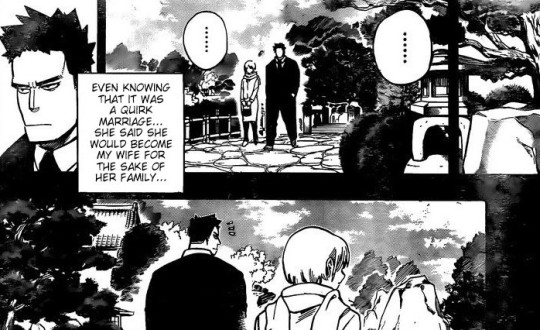
I mean they’re still stiff af but at least they’re not rigidly sitting in seiza and staring at each other unblinkingly anymore lol. Enji’s actually got his hands in his pockets now. why is this somehow almost cute
oh damn it’s the flowers
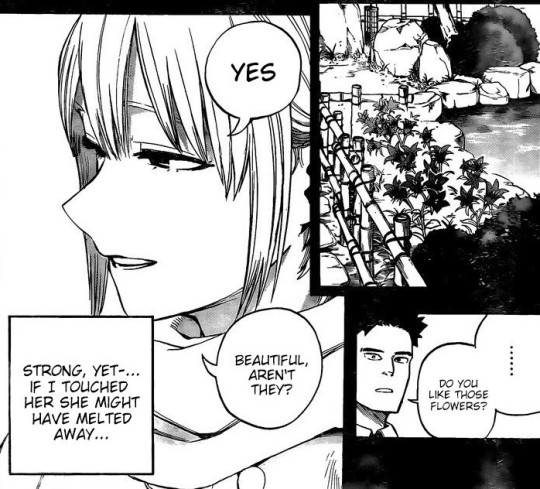
Rei seems so subdued and it’s so hard to get any idea of what she’s actually thinking. I want to see her side of this dammit
but anyway, so at least from Enji’s perspective it seems like even though the marriage was arranged and he picked her because of her quirk, he still loved his wife and wanted to do right by her. the fact that he was watching her and noticed that she liked the flowers, and remembered that detail for all these years -- there’s a reason why Horikoshi’s showing us this. we know what’s going to happen later on; we know how much fear and violence and breaking of trust is coming up ahead, and while it may seem like this scene is serving to soften Enji’s character further -- which to be fair it is -- it also helps drive home the full impact of his abuse. that it’s so terrible not only because of the trauma of the abuse itself, but also because of the way it retroactively destroys all of the good things as well. this could have potentially been such a sweet scene, but it’s inescapably tainted by the knowledge of what’s to come, at least for me. and that’s just brutal
anyways, shit. is the whole chapter going to be like this?? feel free to toss in something I can actually make a joke about sometime, Horikoshi
oop, back to the present
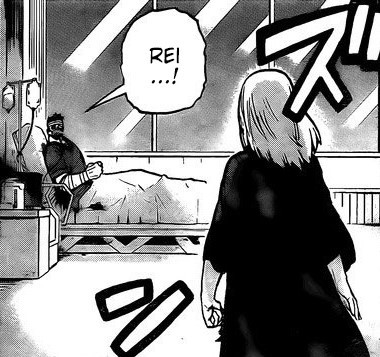
omfg lol
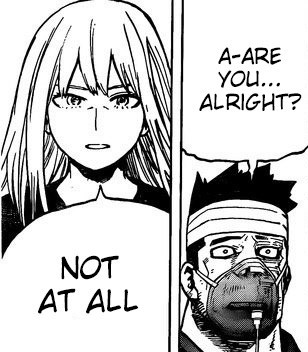
“are you all right” “NO I’M NOT ALL RIGHT WHAT THE FUCK.” “oh, right, because of all the stuff that’s happened with me abusing you and you having a mental breakdown and being hospitalized for ten years and then our son coming back to life and killing thirty people, right, right. I almost forgot.” whoops
omfg you guys I’m loving this new and improved steely-eyed Rei. I’m loving her a lot

and what do you mean “part one” fkjds how long is this going to be. TOO MUCH DRAMA FOR ONE CHAPTER TO HANDLE
oh, hello
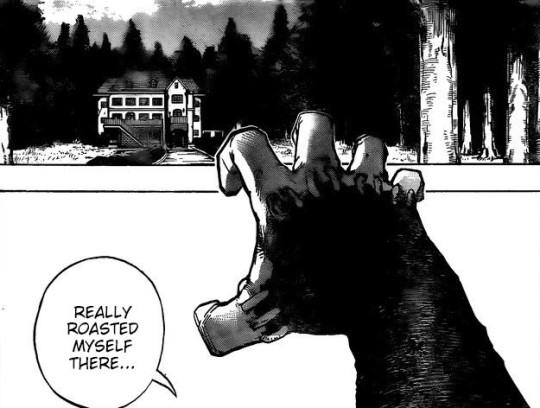
yeah I’ll say you did. didn’t seem to bother you much at the time, though
HMMMMMMMMMMMM
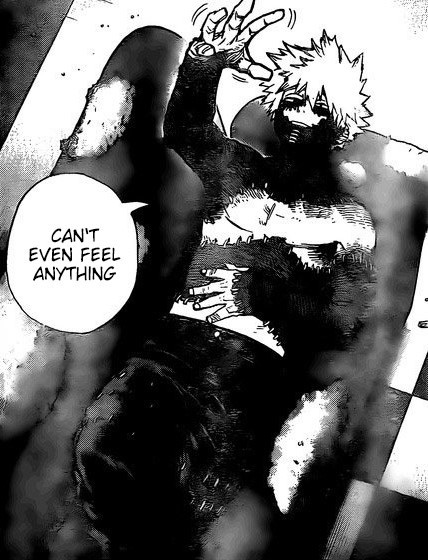
Dabi Is A Noumu intensifies even further. anyways though would you fucking look at this boy lounging on this moth-eaten couch doing his best DRAW ME LIKE YOUR FRENCH GIRLS impression wtf
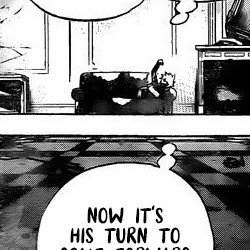
Dabi what if you actually had killed him??? what would you feel?? satisfaction?? regret?? anything at all?? tell me your secrets goddammit
who are you talking to buddy
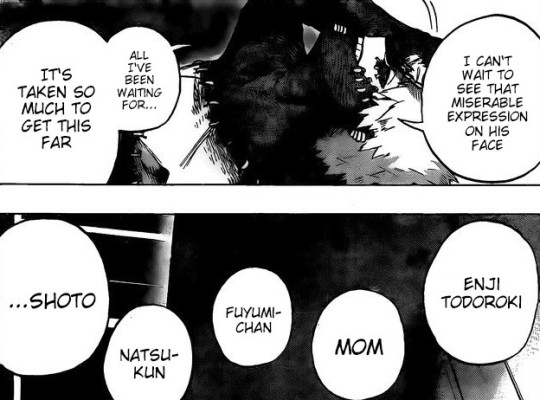
Fuyumi-chan, Natsu-kun (is it common for brothers to address each other as -kun?? can’t recall seeing that in many other anime, but hey), and “dot dot dot,,,,,, SHOUTO” lol thank you so much for this bountiful heaping of Tododrama Horikoshi we are blessed
AH, WHAT DID I SAY THE OTHER DAY
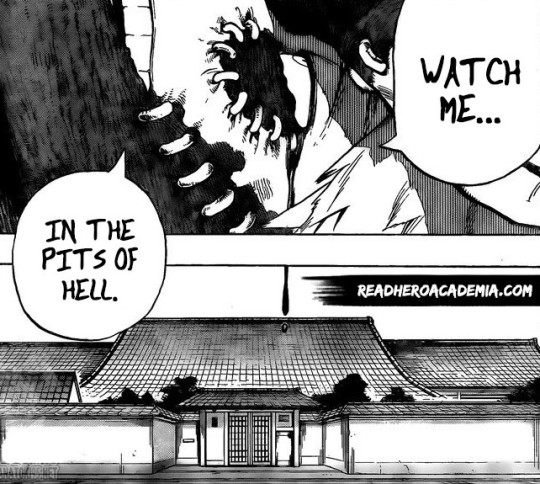
ULTIMATE MELODRAMATIC THEATER CHILD. “I’M JUST GOING TO LIE ON THIS COUCH SHIRTLESS AND ALONE AND MAKE SPEECHES TO MY FAMILY MEMBERS WHO AREN’T THERE AND SAY THINGS LIKE ‘WATCH ME IN THE PITS OF HELL’ WITH A STRAIGHT FACE BECAUSE NO ONE’S THERE TO JUDGE ME.” WELL JOKE’S ON YOU MISTER CHATTERBOX BECAUSE I AM IN FACT JUDGING THE SHIT OUT OF YOU LOL
(ETA: and on a more serious note, it’s interesting to see that “look at me”/”watch me” theme being used again though, because we see that same sentiment uttered repeatedly by the younger Touya in the flashback. well kid, you definitely got your wish at last. don’t know what else to say.)
OKAY HORIKOSHI HAS DECIDED THAT’S ENOUGH FUN, TIME FOR MORE FLASHBACKS
oh my sweet precious lord
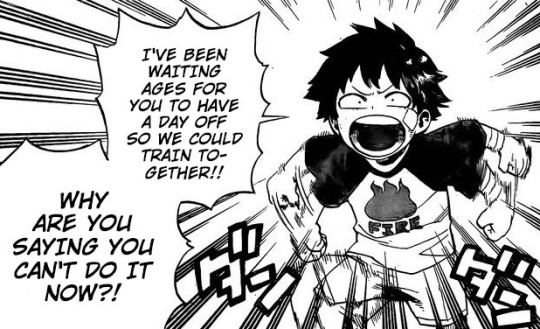
just as cute as we left him. giving us a child this cute when we all know full well what’s going to happen to him is just unspeakably cruel though
HOMG
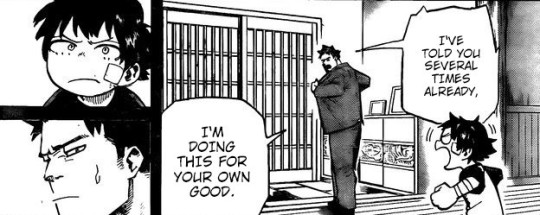
I’m fucking speechless. you broke me, congratulations. what am I even supposed to do with this





I can’t get over this. moving forward my life will be split into two distinct parts, B.P. (Before the Pout) and A.P. (After the Pout)
and meanwhile there’s ALL THIS BACKGROUND ANGST BUILDING UP, AND I CAN’T EVEN FOCUS ON IT. Touya’s arm and cheek are covered in bandages (I’m guessing this is shortly after that “ouch!” panel we got some chapters back), and Enji is deliberately avoiding training with him because he doesn’t want him to hurt himself further. I can’t fucking get over the irony that all this time everyone thought Touya had died because Enji pushed him too far in his training, and it turns out that it’s the opposite -- the tragedy ultimately happened because he didn’t want to push him. but I’m jumping ahead of myself though I guess
by the way,

remember this?? just wanted to remind you that it exists just in case you forgot
so now someone is talking and basically saying that Touya is the exact opposite of what Enji was hoping for when he decided to start playing with quirk genetics
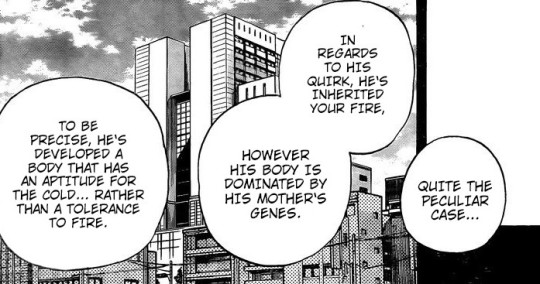
-- okay hold up
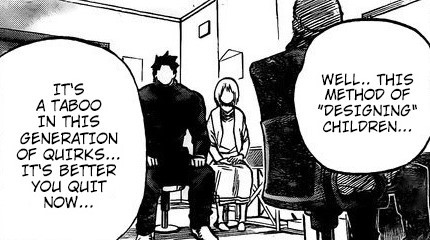
...lol no, never mind. for a second I thought “holy shit he looks kind of familiar WHAT IF IT’S UJIKO OMG” before I remembered that Enji would have recognized him during the hospital capture mission if that was the case. so NEVER MIND, PROCEED
IMAGINE THAT, ENJI DOESN’T QUITE SEEM SATISFIED WITH THIS SUGGESTION OF QUITTING NOW
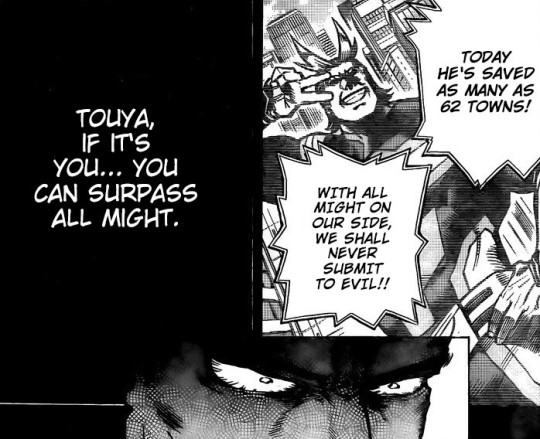
(ETA: how the fuck did this man go around saving 62 towns in a single day what even is All Might.)
[clicks tongue several times] trouble a’brewin’
MEANWHILE BABY TOUYA HAS UNFORTUNATELY INHERITED HIS DAD’S STUBBORN STREAK

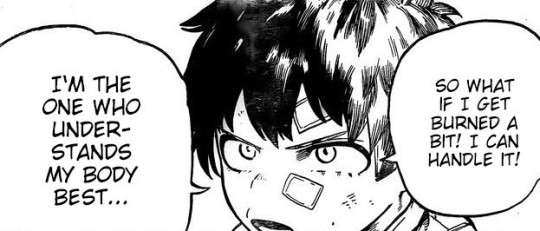
KLDIHWOEIJFL:KSDJ
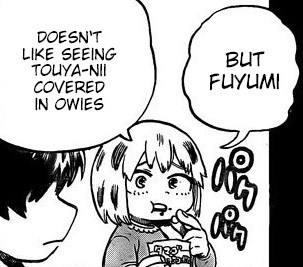
!!!!!!!!!!!


oh my god. oh my god. what is this chapter. WHAT IS IT
so now Touya is all “YOU JUST DON’T UNDERSTAND MY MANLY DESIRE TO BURN MYSELF ALIVE” well you got her there champ
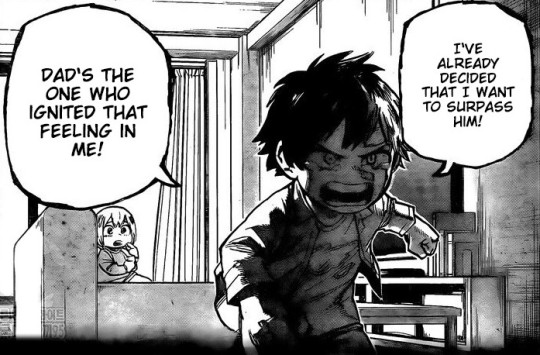
THEY’RE TOO CUTE. OH MY GOD. HIS FURIOUS LITTLE TEARS. HER CHUBBY LIL FACE. HIS STUBBY LIL FISTS. SOMEONE HELP ME
also are they just home alone lol or what. “hey Touya, you’re what, like six now?? do us a favor and look after your baby sister for a couple hours for us would you? make sure not to set yourself on fire or anything.” WHAT COULD POSSIBLY GO WRONG!!
now it’s nighttime and Enji and Rei are arguing, presumably about his decision not to train Touya anymore
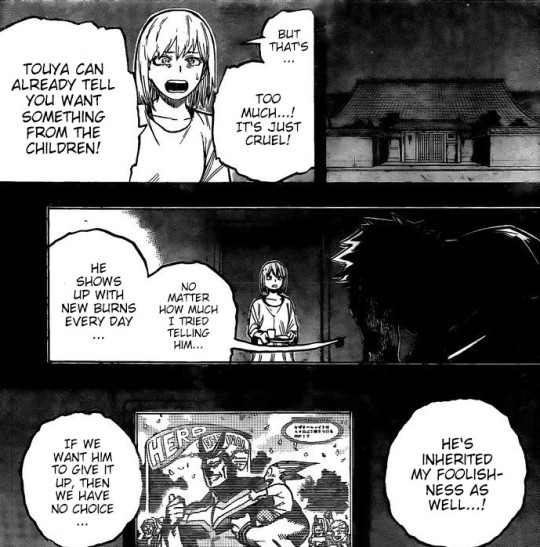
whew. okay. so, a couple of things here
1. first of all I think this conclusively shows that Enji really was trying to do the best he could for Touya. he stopped training him as soon as he realized it was hurting him, but Touya was still determined so he tried to make it work anyway, and even visited doctors to try and figure out if there was anything they could do. then, once they were absolutely sure that it wasn’t going to work, he tried multiple times to explain to Touya why they had to stop. he didn’t just abandon him out of the blue, which is really important to note. “no matter how much I tried telling him...”
so yeah, that debunks another common fandom accusation. so by the time he finally makes this decision, which we all know is going to turn out horribly, it’s basically because he’s already tried everything else he could think of. which, by the way, still doesn’t mean he handled this right. but at the very least he was taking Touya’s feelings into account and he was trying, and he didn’t just abruptly toss his son aside (at least not yet)
2. buuuut, then there’s this panel right below all that
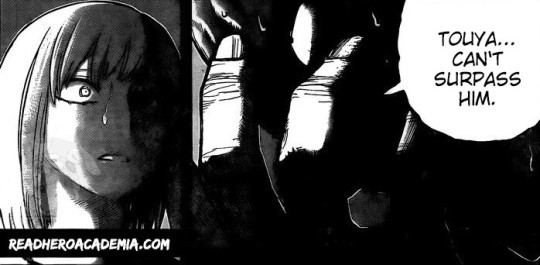
which is the other side of it. if he’d just quit like the doctor person advised him to, that would have been the end of it. Touya would still have been upset, but he would have eventually gotten over it and the family would have moved on and possibly even been happy. but what happens next happens because Enji can’t let go. he still has this maddening urge to surpass All Might, and so he and Rei keep having more children, and then Shouto is born, and Enji finally has a kid he can start projecting all of his hysterical ambitions onto once again, and everything starts spiraling out of control soon after
though p.s. none of that is Shouto’s fault though!! he’s one of the few good things to come out of this whole mess and I’m very happy that he exists. the tragedy is that his dad fucking lost his mind over his quirk and fucked everything up. but that’s on him, not Touya or Shouto
anyways, SLKFJLSHGLKJL

I CAN’T FUCKING TAKE THIS YOU GUYS??? LOOK AT THAT LIL BUTTON OF A NOSE??? I’M LOSING IT HERE???
AND TOUYA JUST SEEMS DEVASTATED OMG

because children aren’t stupid, after all. he understands that his dad is still looking to surpass All Might. and so he feels like a failure, and feels like his dad is trying to replace him because he wasn’t good enough. and even now, isn’t that what the adult Touya is trying to prove?? that he was good enough after all?? “I’ll show you what happens when you give up on me, dad”?? “I’ll show you what I can do”?? fuck my life fuck everything
AND YOU CAN SEE THE TOLL THAT IT’S ALL TAKING ON REI GETTING WORSE AND WORSE AS WELL OH GOD

really nice touch here with the panel outlines becoming all shimmery from the heat of Endeavor’s flames (and/or becoming more unstable as the family gets closer and closer to their breaking point). but man, Horikoshi I can’t handle this, please show us more cute kids or something I can’t
GKELKWFJLDKSHFLKL
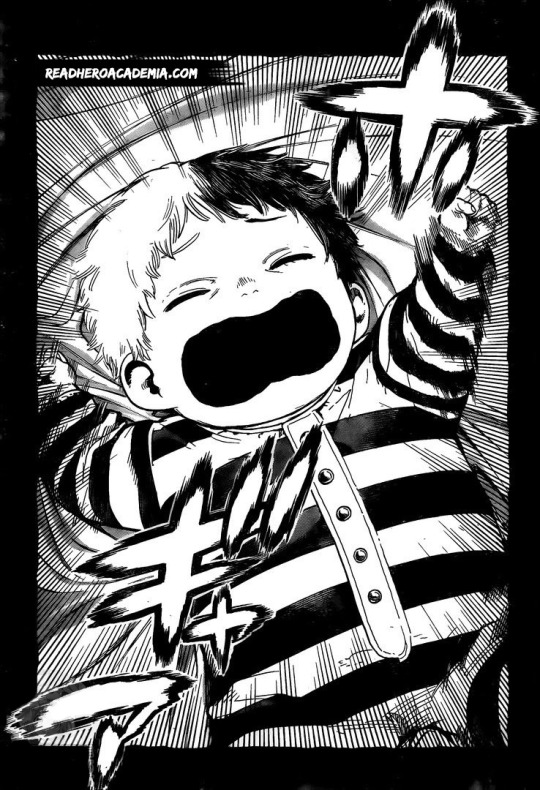
WITTLE BABE. BEEB. BUBS. SMOL. lkj; oh ouch a piece of my heart just detached and latched onto him huh look at that
TODOROKI “I’M SO SMALL AND I HAVE NO IDEA WHAT’S GOING ON AND I DIDN’T ASK TO BE HERE” SHOUTO AHHHHH
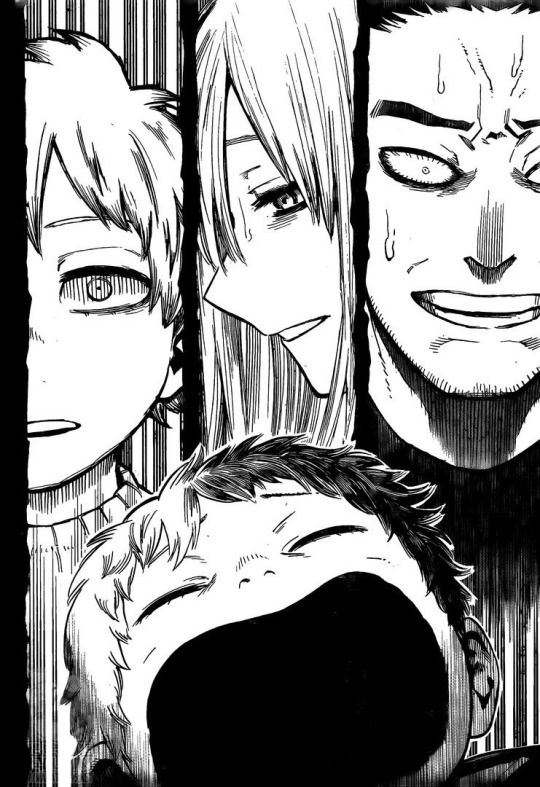
crazy how they all just seem to know right off the bat lol. kid doesn’t even have object permanence yet, let alone a quirk. but do they care?? IT’S THE HAIR, RIGHT. WE’RE ALL THINKING IT, I’M JUST GONNA COME OUT AND SAY IT. they knew the minute they looked at him lol
AND MEANWHILE TOUYA IS OFF HAVING UNSUPERVISED TRAINING/CRYING SESSIONS IN THE MOUNTAINS OR WHATEVER, AND, UH OH
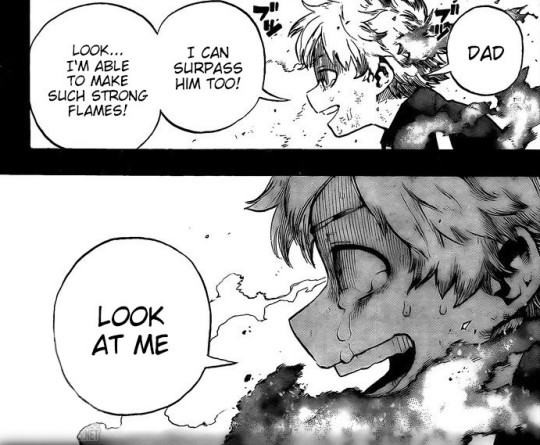
are those blue flames yet?? they seem pretty close
(ETA: this is one of the few cases where the manga being in black and white is infuriating lol.)
OH MY GOD AND STILL
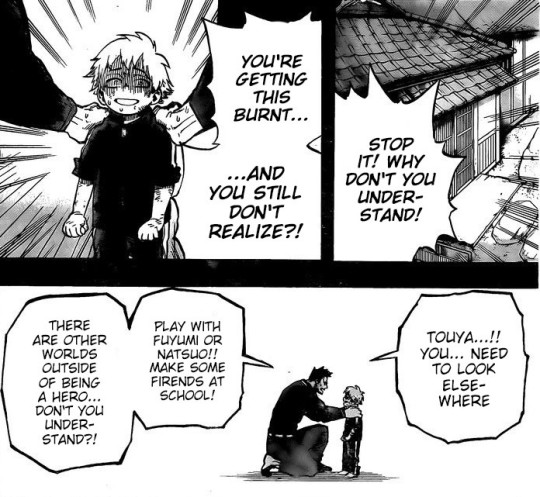
so it’s not like he was so disinterested that he didn’t notice what was happening, and he was still trying to stop it and get through to him. trying to reassure him that it wasn’t the end of the world and there were other things he could do with his life, but this one particular thing just wasn’t going to happen
fucking hell. it’s agonizing seeing how close they actually were to fixing it. if he’d only said the right words, or if he’d realized at this point how destructive his obsession could be to his kids, and backed off from putting that same pressure on Shouto. we came so close to possibly having a happy ending
AND ALSO THIS HAS NOTHING TO DO WITH ANYTHING BUT PLEASE LOOK AT HOW TOUYA IS LIKE THREE AND A HALF FEET TALL AND HIS DAD IS LIKE NINE AND A HALF FEET. Touya barely comes past his knees flkjlkg. the Todoroki household must have been so filled with like plastic stepstools to reach the bathroom sink and all the little baby toothbrushes, and baby gates to keep the kiddos out of the important grown-up rooms and stuff. and also days-old half-empty cups of water and stale crackers and hot wheels and my little ponies strewn everywhere
“BUT EVERYONE AT SCHOOL SAYS THEY’RE GONNA BE HEROES” a wild Deku parallel appears?? how bout that
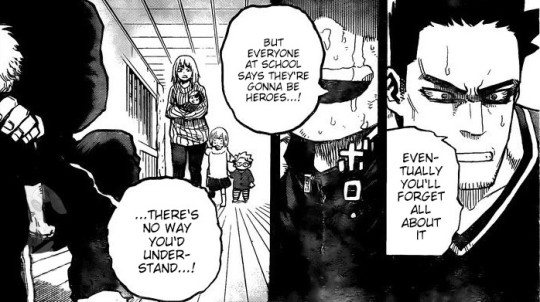
I know this is like a pivotal moment in the Todo Tragedy and all, but fucking look at this lil dumpling

“sup bro, it’s me, the manifestation of your fears of inadequacy and lack of fatherly affections. a GAAA. ba-baAA-baa [gurgling baby sounds]”
OHHHHH IT’S THE SOUND OF MY HEART BREAKING OH NO
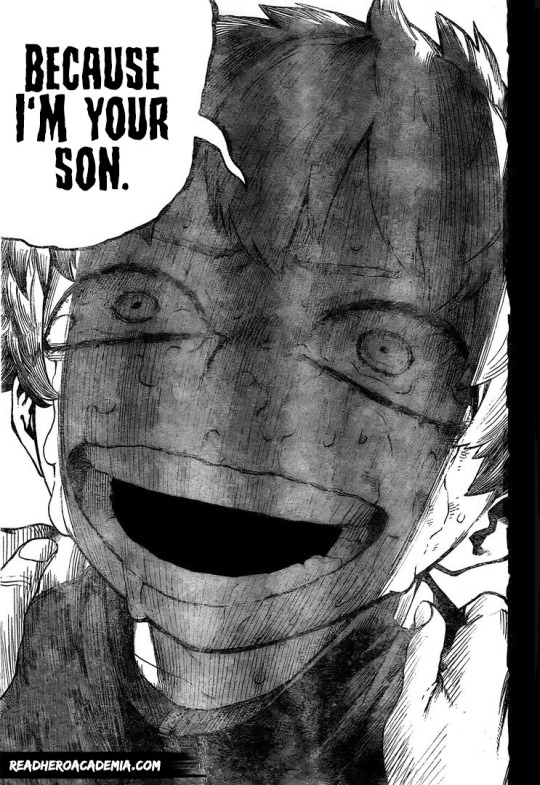
HE WANTS TO BE LIKE YOU ENJI. good lord somebody please just get this family some therapy
“DAD YOU IGNITED IT IN ME” flkjslkj nope, nope. not ready for this pain here
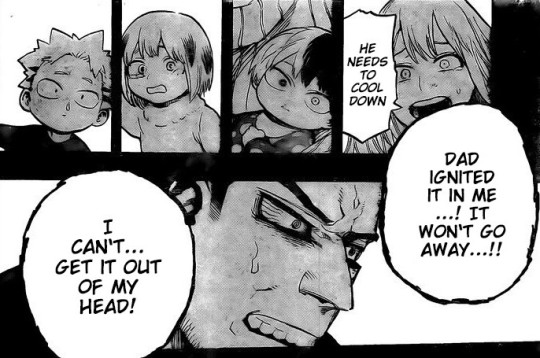
baby Shouto, would you like to weigh in on this affair? “DA!! ba-ga-daaa, [pacifier chewing noises]” oh my, you don’t say. so insightful for one so young
OH MY GODDDDDD
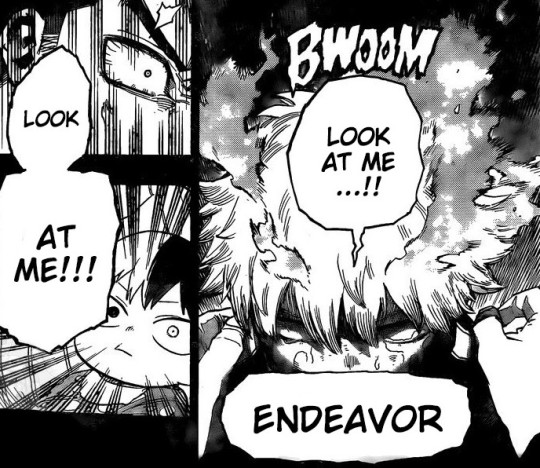
IT’S SO DRAMATIC BUT ALL I CAN THINK ABOUT ARE THE SHOUNEN WOOSH LINES SURROUNDING FOUR-MONTH-OLD SHOUTO LOL HE WAS LIKE THIS FROM BIRTH OH MY GOD I AM DYING HELP
SHOUTO YOU’RE RUINING THIS ENTIRE CHAPTER!?!?!
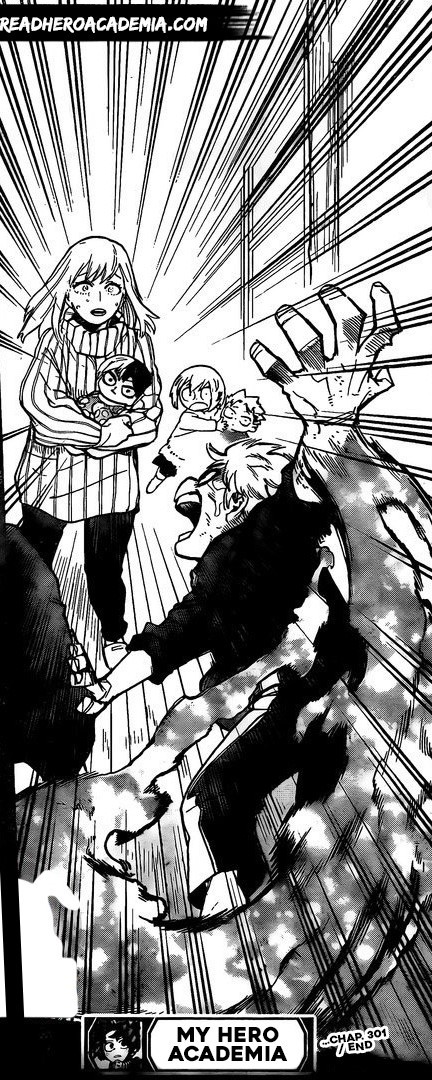

“yo, the fuck kind of family was I fucking born into” oh, son. if you only knew. IF YOU ONLY KNEW!!
(ETA: lmao I got so distracted by the ridiculous cuteness that I glossed over the fact that Baby Touya seems to possibly be aiming at him?? it’s hard to tell because he’s also super out of it from heatstroke and may just be losing control in his attempt to show off his upgrade.)
ANYWAY THAT’S THE END EXCEPT WHAT’S THIS LAST LINE OMG

ffffff. and we’re in for ANOTHER chapter of this next week?? MORE drama?? MORE BABIES?? MORE OF EIGHT-YEAR-OLD TOUYA’S SLOW DESCENT INTO MADNESS. MY HEART CAN’T TAKE IT, BUT ALSO YES PLEASE SIGN ME UP
#bnha 301#dabi#todoroki touya#endeavor#todoroki enji#todoroki rei#todoroki shouto#todoroki fuyumi#todoroki natsuo#bnha#boku no hero academia#bnha spoilers#mha spoilers#bnha manga spoilers#makeste reads bnha
395 notes
·
View notes
Text
Tangled Salt Marathon - “Rapunzel Knows Best!” ( A first half of S3 Recap)
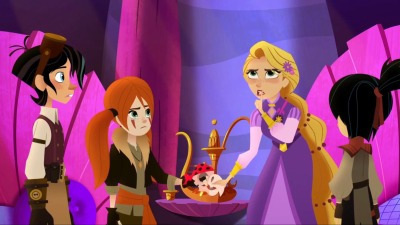
So I decided to place the recap after Be Very Afraid for several reasons. For starters it’s where the season three hiatus took place. It’s also framed like a cliffhanger episode the same as The Great Tree and Queen for a Day; so while Cassandra’s Revenge is technically the midseason finale, Be Very Afraid functionally servers this narrative purpose better. Finally I want to keep the Cassandra heavy stuff contained in it’s own recap later same as I did for Varian’s arc in season one.
Also keep in mind, everything I discussed in previous recaps still apply here. Nothings changed and you could argue that the issues I bring up now could have also apply to past seasons; they just happen to be at their worst here.
Here are the past recaps
To Filler or Not to Filler
Hey, What Ever Happened to That Varitas, Guy?
What Is the Point?
‘Whatta Twist’
And here are the episodes that’s covered in this recap
Rapunzel’s Return Part 1
Rapunzel’s Return Part 2
Return of the King
Who’s Afraid of the Big Bad Wolf
The Lost Treasure of Herz Der Sonne
No Time Like the Past
Beginnings
The King and Queen of Hearts
Day of the Animals
Be Very Afraid
Poorly Defined Conflicts

I’m not just talking about Cassandra’s lack of goals here either, though that is a part of it. I mean in several episodes the central conflict isn’t laid out clearly enough before being resolved. We flip from one set up to the next without ever resolving the first; like in Rapunzel’s Return when Cass and Varian fight for screen time or whenever Rapunzel is suppose to learn one lesson only for someone else to learn a completely different lesson in every other episode. And to this day I don’t know what Rapunzel and Feldspar’s subplot in Lost Treasure was suppose to be about.
There’s also of course the ill-defined overall conflict; which at this point has become convoluted and nonsensical to the extreme, and will only grow more aggravatingly stupid as the season progresses. The main villains lack clear goals, their motivations don’t align with previously stated facts, and the actual interesting conflict involving the threat of the rocks and their destruction of people’s lives and homes is just shoved under the rug and forgotten about.
There is no story without conflict. Having the conflict be all over the place is not only confusing but makes it harder for the audience to invest in what’s going on.
Failed Narrative Promises
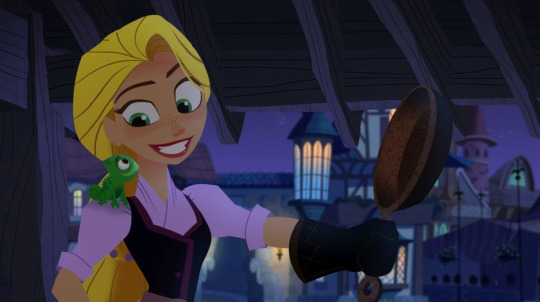
Tying in with the above statement regarding conflicts, we have failed narrative promises. Rapunzel is repeatedly told to that she needs to learn something in several episodes only for her not to learn it at all. She either learns some unrelated ‘lesson’ that wasn’t established, (like in Rapunzel’s Return with her pervious goal about ‘opening up to others’ being switched out for a generic ‘responsibility’ lesson that at the last minute, where she doesn’t even do anything responsible,) or she winds up ‘teaching’ the opposite lesson to a different character thereby rewarding her for her bad behavior.
And that’s just within the induvial episodes themselves; there’s also broken narrative promises through out the overall story arc; like...
no justice/redemption for Lady Caine,
no acknowledgment that the Saporians are the victims of colonization
no conclusion regarding Corona’s murky past
no satisfying ending to Varian’s plot that sees everyone in involve grow
a poor copout of an explanation for Cassandra’s face/heel turn
The Dark Prince reveal going nowhere
The Brotherhood being put on a bus
King Frederic, or any royal, not being held accountable for their past actions
Lance’s new found responsibilities just being thrown away for the tenth time
The Disciples plot being being dropped
next to nothing in season two winds up being relevant
And Rapunzel, the protagonist of a coming of age story, fails to learn anything at all
I could probably go on but you get the gist. Tangled is incredibly frustrating show to watch because doesn’t deliver what it promises. You’re not being clever by ‘subverting audiences expectations’ unless you can justify your narrative decisions with previous set up. Tangled is too lazy to build proper set ups so it’s ‘twists’ leave you wanting to punch things rather then impressing you.
Character Assassinations

Every single character in Tangled the Series gets thrown under a bus, driven off a cliff, and then allowed to drown in the ocean of their completely unaware self-congratulatory smugness.
Rapunzel is turned into a bully
Cassandra is given the idiot ball to hold permanently
The King and Queen are lobotomized
Quinin gets replaced by a robot
The rest of the Brotherhood are pale shadows of what they could have been
Edmund is transformed from tragic complex figure into a dumb jerkoff who abuses his kid for a laugh
Zhan Tiri, once an ancient demon warlock, is reduced to a floating impotent ghost girl
The Saporians become poor hipster parodies
Cap is put on a bus
Any villain who isn’t Cass is gets ignored
Lance is infantilized to the point of absurdity
Eugene becomes a doormat
and poor Varian is forced to become a complacent victim to his abusers as oppose to being allowed to keeping his dignity
I think the only person who escapes this mass murder of characterization is freaking Calliope, and she’s hasn’t even appeared yet! (Well okay her and Trevor, maybe)
This all ties back into the poorly defined conflict and failed narrative promises. Rather than let the characters drive the story, they’ve become puppets to the plot, and plot is really stupid and forced, and circles back in on itself and is full of contradictions.
Manipulating the Audience’s Empathy to Do the Work for the Writers
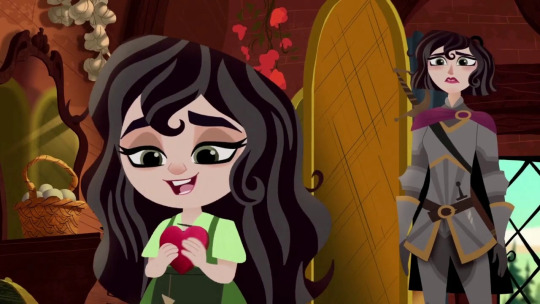
The reason why the creators believe they can get away with such poor characterization and lazy writing is because they expect the audience to do all the heavy lifting for them.
Cass isn’t given an on screen reason for what she does because they’re hoping her fans will just automatically excuse her because they like her/relate to her and not, you know, get mad at the writers for dumbing her down. And after all who doesn’t love the creator’s pet? Meanies! That’s who!
No one calls out Rapunzel’s bullshit on screen, because if everyone likes her, then you, viewing audience, should too. Because if you have any sort of independent critical thinking abilities and a sense of right and wrong then clearly you’re ‘just a hater’.
Everyone should just shut up and be satisfied that Varian is even on screen now and be grateful for the scraps that they get cause he’s not the real point of the show and according to Chris ‘Varian fans aren’t real fans’. Even though they make up most of his viewing audience.
I could go on, but it’s just variations of the above. The writing in this series is very fond of gaslighting the audience and trying to trick them into justifying the absolute worst behaviors while desperately hoping they doesn’t noticed the continued downgrading and dismissal of characters they do like or once liked.
And the sad thing is, it’s worked. There are people to this day that still try to justify this show’s shitty morals and bend over backwards to excuse the likes of Rapunzel, Frederic, Cassandra, and Edmund. Worst, there are loud sections of the fandom, (usually on twitter) who think bullying is okay and follow in Chris and his characters footsteps. Most of them young impressionable girls who are now ripe for TREFS to indoctrinate because they use the same bullying tactics and excuses for authoritarianism.
Media does effect reality, but not in the way purists and antis would have you believe. No one is going to become a violent manic from playing a video game nor a sex offender because they read a smut fic. But they very much will conform to toxic beliefs if it’s repeated enough at them by authorities they ‘trust’; like say the world wide leading company known for family entertainment and children’s media, and the ‘friends’ they find within the fandom for said company...
I’m not saying you can’t enjoy Tangled the series or that you’re some how wrong for liking it’s characters, nor do you have to engage with every or any criticism thrown it’s way. But yes you need to think about the media you consume on some level and valid criticism is very much important to the fandom experience for precisely the above reasons.
Conclusion
This isn’t even the tip of the iceberg of what’s wrong with this show, but it is most of its biggest problems laid bare. Anything that haven’t covered here or in the past recaps will be explored in the final recap. Cause this is it folks; the last leg of the journey for this retrospective. When come back, hopefully next week, we’ll tackle Pascal’s Dragon.
94 notes
·
View notes
Text
Some thoughts about The Magicians S4 finale
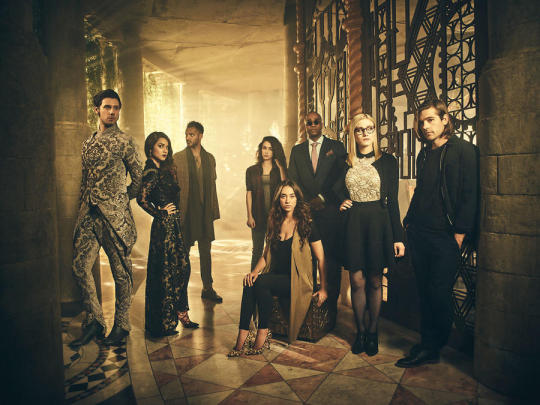
I want to write a bit (recreational activity for me) and I have thoughts about The Magicians, especially about what went down in S4, so there we go. It will probably turn out long and rambly, so buckle up. But first, a few disclaimers.
X
As I will discuss The Magicians plotlines & the writers' creative choices there will be spoilers. If you haven't seen S1-S4 and you don't want to be spoiled, don't read past this point.
X
I won't be discussing the writers actions after the finale, neither the silence nor the interviews. It's garbage fire and I don't have time for this. (It's rather baffling that in this day and age tv business professionals still handle the communication with the fanbase this badly.)
X
Now, I would not call myself a fan of The Magicians, but I got engaged in the story. I'm a fan of very few shows these days and usually I steer clear from the fandoms' open waters. I don't have the time or the energy, so I stick to the friends I've made back in the day.
As such, I haven't watched The Magicians until after the S4 finale. Recently I've been thinking about the treatment of the queer characters in the ongoing tv shows, so the Q's death controversy was right up my alley. I also had some time for a binge and some personal issues to be distracted from (no worries, I'm dealing with them, I just couldn't allow them to cause me obsessing over them).
X
I've tried to read Grossman's books when they first came out and I decided they weren't for me. I still think that. If you want some quality fantasy recs, hit me up.
When the show first came out I watched first few eps and then noped out of it. I thought it was pretty bad and full of issues and, and upon rewatch, that's still my opinion about the first half of the 1st season.
X
The show does get better. It's ocasionally great (S3 is pretty strong and thoroughly enjoyable – with eps 3.04 & 3.05 being really really good, the first one for its storytelling quality, the second one for its emotional payoff). However it has various issues throughout that would have made me mistrustful of the writers, even if I didn't know what happens to Q.
X
So, you may say I went in prepared and with my reservations. As a consequence I didn't really have the feeling of rage and betrayal that the long time fans did. But I get them and they are so valid. Take care of yourselves, take care of each other, take your time to process the grief in a way that works for you. And stay hydrated.
Now, processing what happened might include some action and engagement. I've seen fanfic writing, article writing, venting on different platforms, sharing the experiences of your lives and loves and mental health, #PeopleLikeMe campaign, Change petition, decisions to stop watching the show and fundrasing for the Trevor Project. Things big and small, heartbreaking and inspriring. The only thing we shouldn't do is harass the writers (and thankfully I've seen very little of that), because harassment is never ok. And we are better than that.
Creators can fuck up (and I will defend their right to fuck up, we're all only human) and we can call them out. Maybe they will learn from their mistakes, maybe not (and if not, well, fans will move on to the greener pastures, where we will get better and kinder stories), but maybe someone else will, someone who is or might become a creator themselves. And maybe there's a little consolation in that.
(And this is why we shouldn't stay silent.)
X
Thinking about it, I see two explanations for killing Q:
the writers did it for shock value, knowing it will get them some buzz (and they miscalculated how much and what kind of buzz)
the writers really don't understand their own show and characters
I believe it may be both.
Even in the first season, when Q introduces us to the world of the show as he himself gets introduced to it, I'd still say The Magicians are an ensemble show. And the show deals with Q being the „white male lead” in the S1 finale when Q gives Alice the knife (and has a speech dealig with that directly, the show does this kind of thing repeteadly, characters monologuing or explaining trope/plot to another character, it's terrible writing, but it's explicit, you can't say the show didn't say something) and uses the fact that the Beast sees him as the „hero” against it, providing distraction for Alice to act. And the show reinforces the notion of Q not being the main hero of the story repeatedly throughout the series and in various ways (Julia being the variable to make loop 40 successful, Eliot becoming High King and so on and so forth).
So when we arrive to S4 Q is:
one of a diverse group of pretty fucked up but still lovable friends (effectively a millenial found family)
average magician
dealing with his mental issues that didn't go away when he discovered magic/Fillory
canon bisexual
caring and loyal and nerdy and awkward
(Gee, how come so many people identified strongly with that.)
(Sorry for the snark.)
No one holds against Q that he isn't some kind of Chosen One, because it was never what his friends expected from him or valued him for. He sometimes/low-key expected it from himself, but the show dealt with that. Repeteadly. And that was fine and that was subverting tropes.
So when the writers first sideline him and then have him killed in S4 finale (in a pretty straightforward Heroic Sacrifice scene), they don't kill a straight white male hero wearing the plot armor, they kill a vulnerable young queer man with mental health issues. And guess how many of them we have on our screens.
What makes the matter even worse:
they handled Q's history of suicidal thoughts/tendencies horribly
it turns out that what looked like a clear setup for future romantic relationship between Q and Eliot was in fact a setup for Eliot's grief story (Right up the Bury Your Gays alley as if that's still the only story a gay man can get on tv. In 2019.)
X
I do belive you still can write a valuable and respectful story of a queer person comitting suicide and their family, friends and community being left to deal with the aftermath, but you'd need to put into it a lot more work, time, thought, talent and sensivity than The Magicians writers did or even are (in my opinion) capable of.
X
For all of the tropes subverting, sometimes very entertaining, The Magicians still were an escapist story at heart. And I really can't think of anything worthwhile the writers archieved by pulling the rug from under its fans.
X
Other issues with S4 finale that I might write about sometime in the future (but now maybe I’ll go and rewatch some Black Sails, Doom Patrol or Killing Eve):
treatment of Julia and Penny 23
treatment of Kady
treatment of the Monster (really)
treatment of Margo and Josh
resolution of the two main storylines (The Library & the Monsters)
#the magicians#the magicians finale#the magicians syfy#the magicians spoilers#the magicians s4#tw: death#tw: suicide#quentin coldwater#eliot waugh#tw: mental health
62 notes
·
View notes
Link
...There are two related, yet distinct, kinds of anti-Semitism that have snuck into mainstream politics. One is associated with the left and twists legitimate criticisms of Israel into anti-Semitic conspiracy theories. On the mainstream right, meanwhile, political leaders and media figures blame a cabal of wealthy Jews for mass immigration and left-wing cultural politics in classic anti-Semitic fashion.
[Rep. Ilhan Omar’s (D-MN)] tweet was a pretty clear example of the first kind of anti-Semitism. Plenty of Jews who are critical of the Israeli government, including me, found her comments offensive...
But it’s also clear that a lot of Omar’s critics don’t have much of a leg to stand on. Conservatives have been trying to label Omar an anti-Semite since she was elected in November, on the basis of fairly flimsy evidence. (...) Trump once told a room full of Jewish Republicans that “you’re not going to support me because I don’t want your money,” adding that “you want to control your politicians, that’s fine.”
The fact that Omar apologized under pressure, and that Trump and McCarthy have never faced real consequences for their use of anti-Semitic tropes, tells you everything you need know about the politics of anti-Semitism in modern America.
...There are two core truths about this incident. First, Omar’s statement was unacceptable. Second, Republicans going after her — including the president — should spend less time on Democrats and more time dealing with the far worse anti-Semitism problem on the right.
...In the day and a half since Omar’s initial comments, a number of left-wing writers have emerged to defend her. They argue that Omar was attempting to point out the financial clout of the pro-Israel lobby — the American Israel Public Affairs Committee, or AIPAC — and not to make generalizations about Jews. The pushback against Omar, they say, is part of a broader campaign to smear a young Muslim congresswoman and silence criticism of Israel.
...It’s true that in some cases, all criticism of Israel or AIPAC, even if it’s legitimate, is labeled anti-Semitic — and that’s a real problem. Omar’s faith has made her a particular target, and it’s fair to want to defend her against these smears in the abstract.
But the specifics of Omar’s tweet make things quite different. In the original context — where she was quote-tweeting [Glenn Greenwald]— she says that US lawmakers’ support for Israel is “all” about money. Yes, it’s a Puff Daddy reference, but she’s a member of Congress and maybe should be a little more careful about the implications of what she says...
There are two problems here: First, the tweet isn’t true. The US-Israel alliance has deeper and more fundamental roots than just cash, including the legacy of Cold War geopolitics, evangelical theology, and shared strategic interests in counterterrorism. Lobbying certainly plays a role, but to say that “US political leaders” defending Israel is “all” about money is to radically misstate how America’s Israel politics work (and discount the findings of the scholars who study it).
Second, and more important, totalizing statements like this play into the most troubling anti-Semitic stereotypes. The Protocols of the Elders of Zion, an infamous early-20th-century Russian forgery, describes a plot by Jewish moneyed interests to subvert and destroy Christian societies through their finances. This in turn draws on longstanding European anti-Semitic traditions that portray Jews as greedy and conniving.
After World War II and the creation of the state of Israel, the conspiracy theory shifted. Anti-Semites started using “Zionist” or “Zio” as a stand-in for “Jewish,” using Jewish activism in favor of the Jewish state as proof that they were right all along about the Jewish conspiracy. David Duke, the former Louisiana state representative and Ku Klux Klan grand wizard, released a YouTube video in 2014 that bills itself as an “illustrated” update of the Protocols. The video features footage of leading Democratic and Republican politicians speaking to pro-Israel groups, with the caption “both are in the grips of Zio money, Zio media, and Zio bankers.”
...Omar is, of course, not coming from the same hateful place as Duke is. But by using too-similar language, she unintentionally provides mainstream cover for these conspiracy theories. After her comments, Duke repeatedly defended her, even tweeting a meme that said “it took a Muslim congresswoman to actually stand up & tell the truth that we ALL know” (he rescinded the praise after her apology).
This is not to equate Duke and Omar — which, to be clear, would be absurd — but rather to point out how if you’re not careful when talking about pro-Israel lobbying, you can provide ammunition to some awful people. By saying that US support for Israel is “all” about money, Omar was essentially mainstreaming ideas that have their roots in anti-Semitism, helping make them more acceptable to voice on the left.
...There’s a real dilemma here. Pro-Palestinian activists, writers, and politicians have every right to point out what they see as the pernicious influence of groups like AIPAC. The group is undeniably powerful, and it’s worth mentioning in our conversations about both Israel policy and money in politics. You can and should be able to say, “AIPAC’s lobbying pushes America’s Israel policy in a hawkish pro-Israel direction,” without saying that it is literally only about dollars from (disproportionately) Jewish donors.
At the same time side, there is a special need on the left — where most pro-Palestinian sentiment resides — to be careful about just how you discuss those things. It’s not just a matter of providing ammunition to the David Dukes of the world; it’s about the moral corruption of the left and pro-Palestinian movement. If references to the baleful influence of Jews on Israel policy become too flip, too easy, things can go really wrong.
...When left-wing insurgent Jeremy Corbyn won the center-left Labour Party’s leadership [in Britain] in 2015, the people who inhabited these spaces seized control of the party power centers.
Corbyn, who had once referred to members of Hamas and Hezbollah as his “friends,” opened the floodgates for the language of Labour’s left flank to go mainstream. The result is a three-year roiling scandal surrounding anti-Semitism inside the party.
Dozens of Labour elected officials, candidates, and party members have been caught giving voice to anti-Semitic comments. One Labour official called Hitler “the greatest man in history,” and added that “it’s disgusting how much power the Jews have in the US.” Another Labour candidate for office said “it’s the super rich families of the Zionist lobby that control the world.” The party has received 673 complaints about anti-Semitism in its ranks in the last 10 months alone, an average of over two complaints per day.
...This is why Omar’s tweet was so troubling, and why the pushback from leadership really was merited. If the line isn’t drawn somewhere, the results for Jews — who still remain a tiny, vulnerable minority — can be devastating.
...The way Omar handled the controversy is interesting. Her apology was certainly given under immense pressure, but it reads (at least to me) as quite sincere[, and] this kind of sincere willingness to reconsider past comments is characteristic of Omar. She had previously gotten flak for a tweet about Israel “hypnotizing” the world, and recently gave a lengthy and thoughtful apology for the connection to anti-Semitic tropes during an appearance on The Daily Show.
“I had to take a deep breath and understand where people were coming from and what point they were trying to make, which is what I expect people to do when I’m talking to them, right, about things that impact me or offend me,” she told host Trevor Noah.
This is not the kind of behavior you see from deeply committed anti-Semites. Yair Rosenberg, a journalist at the Jewish magazine Tablet who frequently writes about anti-Semitism, argued on Monday that Omar has earned the benefit of the doubt:
“I’ve covered anti-Semitism for years on multiple continents, and this level of self-reflection among those who have expressed anti-Semitism is increasingly rare. Not only did Omar apologize for the specific sentiment, but she put herself in the shoes of her Jewish interlocutors and realized that she ought to extend to them the same sensitivity to anti-Semitism as she would want others to extend to racism.”
...This is what it looks like when the system works. A member of Congress says something offensive, most of her party explains why it’s wrong, and then she issues a sincere apology and demonstrates an interest in changing. That is a healthy party dealing with bad behavior in a healthy way.
This is not what you see on the Republican side when it comes to most forms of bigotry — up to and including anti-Semitism.
...Last summer, McCarthy sent a tweet accusing three Democratic billionaires of Jewish descent — George Soros, Tom Steyer, and Michael Bloomberg — of trying to buy the midterm election...
...Around the same time, President Trump claimed that protesters against Brett Kavanaugh were being paid by Soros...
And Florida Rep. Matt Gaetz suggested Soros was behind the so-called “migrant caravan” coming to the US through Mexico, a theory spread when Trump tweeted the video in Gaetz’s original tweet...
This all follows years of Soros demonization in the conservative press, with everyone from conspiracy theorist Alex Jones to Fox News anchors blaming the Jewish billionaire for various ills in the United States.
The defense of these lines is the same as the left-wing defense of Omar: It’s not anti-Semitic to simply state facts. But many of these “facts,” like Soros masterminding immigrant caravans, are false. Moreover, creating a narrative in which Soros and other left-wing Jews are puppet masters, using their money to undermine America from within, they are engaging in the same normalization of Protocols-style anti-Semitic tropes as Omar.
What’s more, they’ve done it with virtually no official pushback. The GOP has not reacted to the Soros hate and other anti-Semitic conspiracy theories with the same fierceness with which the Democrats responded to Omar’s comment. There has been no leadership statement condemning the mainstreaming of anti-Semitism; in fact, demonizing Soros has long been part of the overall party strategy. In 2016, Trump released a campaign ad that played a quote from one of his speeches over footage of Soros and former Fed Chair Janet Yellen (also Jewish) that comes across as an anti-Semitic dog whistle...
...“Don’t kid yourself that the most violent forms of hate have been aimed at others — blacks, Muslims, Latino immigrants. Don’t ever think that your government’s pro-Israel policies reflect a tolerance of Jews,” Jonathan Weisman, the New York Times’s deputy Washington editor and author of the new book (((Semitism))), writes. “We have to consider where power is rising, and the Nationalist Right is a global movement.”
...While the Democratic Party handled an offensive comment quickly, Republicans have never shown a willingness to do the same when it comes to right-wing anti-Semitism. There’s a reason most Jews in the United States are Democrats, and will likely remain so for the foreseeable future.
[Read Zack Beauchamp’s full piece at Vox.]
#long post#antisemitism#if you reblog or reply with antisemitism or any defense of antisemitism i will block you#if you reblog or reply with islamophobia anti blackness misogynoir or any other bigotry i will block you
145 notes
·
View notes
Text
Meeting & Subverting a Reader’s Expectations
A murder mystery needs to open with a murder!
Whenever a reader chooses something to read dictated by their own tastes and preferences they come to that story with expectations and preconceived notions in mind. A writer that managed to both fulfill and at the same time subvert those expectations and notions is going to be more successful than a writer who ignores them completely.
When you go to an action movie, you expect to see a big fight and hopefully some explosions. The faster you get to a fight scene the happier you're probably going to be. That's what you came for. And if the movie manages like The Expendables or Furious 7 to have a story that hangs on by more than a thread, then you're going to remember that movie more than a movie that doesn't. As a viewer, you got what you came for, fights, explosions, funny quips and then some, a meaningful story that made you think or tugged at the heart strings.
Every genre has conventions.
That's why they're genres. Authors ignore them at their peril. In a murder mystery, a writer needs to have a murder in the beginning of the book. If they're a detective, someone might bring them a case. If they're a bumbling amateur that is actually the town baker with an interest in history and crime then somehow they're going to stumble across this body and mystery one way or another. Or maybe they're a columnist for the local paper but aren't assigned to crime, but art or sports. Then there is another set of expectations added. The reader expects to learn something about baking or to learn something about whatever column the newspaper man is researching.
In a romance novel, the two main characters need to meet and find each other attractive. In an adventure novel, the characters are most likely going somewhere else and delivering at least one punch to the gut. In a thriller, the character needs to be escaping a deadly situation. In a mystery, a stolen item, a missing person, a dreadful secret, it all needs to be solved. In a fantasy novel... okay, that honestly depends on the fantasy novel. Speculative Fiction has gotten so fractured.
Think about the article about the "worst way to open a book from literary agents" that I linked the other day. In there two agents gave contradictory advice on how to open a book in the same genre. One said not to open with exposition and prose (such as describing the scenery or someone bringing you the mail, I suppose.) The other said not to open in the middle of a fight or an action scene. Which leaves a writer wondering what's left?
Here is the thing, it's conventional in the speculative fiction genre (fantasy and science fiction) for there to be lots of descriptions of the scenery and aliens, especially if it is harder scifi and high fantasy. The readers of those genres expect to read paragraphs about odd or magnificent landscapes. This was set in stone by writers such as Asimov, Tolkien and Burroughs. If you don't have those type of scenes in your speculative fiction novel the reader that loves that type of novel will be cheated of their expectations.
On the other hand, low fantasy, soft science fiction and most urban fantasy novels are expected to open with some sort of "action" to kick off the plot whether it's a fight or not. (Though many also go the exposition route.) In these genres, the readers care less about the scenery and the technology and the culture, they want to get to the action and to the characters as fast as possible. If there were long paragraphs about chewing the scenery, they'd be put off and go read something else.
Writers who meet the expectations of their genre in a believable way are more likely to be successful than writers that aren't.
In Shrek, the writers set up a bunch of expectations. This was a fantasy realm filled with characters we know out of fairy tales. Somewhere, there is a Princess in a tower waiting for her true love (no doubt a Prince) to rescue her. They set up a classic tale of a damsel in distress waiting for her hero. Then they made the local Lord the villain and sent an ogre to rescue her instead. Subverting all the expectations of the viewer. In fact, they built their entire marketing campaign around this. Then, in Shrek 2, they were able to do whatever they wanted because they'd already simultaneously fulfilled and subverted what the viewers of Shrek wanted to see. They wanted to see the Princess get rescued and live happily ever after. Except, she did it with an ogre. The writers didn't need to continue and write another fairy tale based story. They'd done that. They could move on to something different and potentially new. That's what made both Shrek and Shrek 2 so successful. By the end of Shrek, we wanted Shrek to win the day because he'd spent so much time talking with Donkey like they were both teenagers. And well, Shrek had done all these awesome things (without slaying the Dragon) in order to prove he was worthy of the girl. (Then found out he had some things in common with the girl. Still, two day romance, cringe.)
Of course, you don't have to be a parody to meet and subvert your reader's expectations.
Like, with the Expendables, you can write a story that caters to your readers needs and still include a message that is profound and meaningful. Or, you can choose a slightly different ending that is still plausible and then poke mild fun at what the expected ending would have been.
Going against the readers expectations are what writers and readers call twists. And as long as they are supported somehow in the story and don't come out of nowhere, then they can be surprising and feel natural. If they aren't foreshadowed in any way or feel like the writer reached into a hat of random ideas and pulled them out, then that's an unsuccessful twist. Even highly lauded writers have done bad endings and twists. And they've been called out on them, loudly and repeatedly.
Crime procedural are full of twists. Some stories have more than others over the course of the season. The writers of an episode set up several plausible suspects among the victims family, friends and coworkers. Then they'll knock them out leaving at least two as potentials and then go "ah hah, no it was really this third person all along!"
Shows like Criminal Minds also add a thriller element to their episodes. The perpetrator is still out there, committing crimes. Can they stop him before he kills another victim? (This is why I can't watch Criminal Minds, my nerves just can't take it.) The viewer expects the team to be able to find and apprehend the killer before they strike again. If they don't succeed they'd actually be subverting the viewers expectations and if it isn't made apparent that they didn't succeed this time because it's a bigger story arc, the viewers will feel cheated. They expected the heroes to win. (Because shows like Criminal Minds aren't actually reality.) If it is made apparent that they're going to try and catch the criminal another day, then the viewer will more likely feel intrigued that this is a new story arc and will continue to watch.
Timothy Zahn wrote a science fiction trilogy about humans conquering space and meeting aliens. In science fiction, you have the Star Trek types where seek out new life forms and try to be friendly. And then you have the alien invasion types like Starship Troopers, Ender's Game or Star Craft (though it's debatable on who is really doing the invading.) In the invasion types, the aliens can't or won't communicate with humans and in the Star Trek types, at least the aliens and humans share enough similar technology that they can talk to each other. Timothy Zahn took a Star Trek type situation where the humans wanted to be friendly and subverted it by making the aliens unable or unwilling to communicate. Both sides thought they other started the fight first. And it took 3 books to sort it out.
He set up an expectation, the aliens were obviously intelligent beings, but then instead of helping the humans, they in turn destroyed them and tried to attack them without explanation. As a subversion of genre expectations, it worked well. The readers still got what they came for, humans exploring space, aliens, pseudo science!
You can subvert a reader's expectations in a variety of ways, character roles, plot, a twist ending, and even setting. Star Trek was essentially "Horatio Hornblower in SPACE!" That's in a way, how urban fantasy came to be. "Fantasy creatures in the modern world!" It's okay to subvert your reader's expectations, as long as you do it consistently and still give them what they came for. Because if you don't, they may not read you ever again.
Enjoy my blog posts, please think about supporting me and buy me a Ko-Fi. Thank you!
5 notes
·
View notes
Text
The Misfit of Demon King Academy - S1E1
So when I was browsing anime on crunchyroll, I found this show that was pretty new. It only has 3 episodes released as of now, so I figured I’d give it a watch and keep watching and reviewing as I go on.
SPOILERS AHEAD - DUH!
The first episode begins with a slight exposition, giving us the basic premise: 2000 years ago, a demon king conquered the world and said he would reincarnate in 2000 years (aka now). Honestly, a pretty good premise, somewhat reminiscent of The Devil is a Part Timer. It takes the whole heroes vs bad guys and flips it on its head, making it so the bad guy has already won, let’s see what happens afterwards. It’s a lot to think about and It’s definitely different. However, in case you couldn’t guess, our main character is the reincarnated demon king, so we have this evil overlord demon king isekai, although to be fair, it didn’t take the age old trope of someone in modern times sleeping/dying/reading a book/playing a video game.
Interestingly enough, we don’t see the demon king’s original demise at first. Interestingly enough, we don’t meet our main protagonist first. We actually meet a female companion named Misha as she and our main character are about to take an exam at a demon academy. Almost immediately, we have a stereotypical bully-type character named Zepes, who is used as a bunching bag multiple times, once outside the academy and once more during the practical exam, where our main character kills him and resrurrects him multiple times, just because he can. In fact, in case the writers thought you were so dense you couldn’t comprehend how powerful our main character (as well as our first main female character) are, Misha gets a score in the 100,000 range while most scores are in the 100-300 range, and our main character gets a score of 0 and breaks the scale.
Yes, the writers are blatantly admitting how op the main character and his companion are compared to everyone else, and everyone else isn’t concerned, because LOGIC.
The only interesting parts of the exams was the aptitude test and the brief worldbuilding we get during the practical exam. During the aptitude test, we finally know our main character’s name, Anos Voldigord, and the fact that he burnt down his homeland to ressurect the populace into powerful zombies. Other than that, we sadly don’t get anymore information about the world, which I honestly would have preferred than multiple displays of how OP our main character is, which include killing Zepes multiple times with his heartbeat and snaps of his fingers. Just call him G-d at this point, except well, in his past life Anos killed the gods, so hooray? The other good part is at the beginning of the practical exam, where Zepes reveal anti-Demon armor that resists Anos’s original attack of magic being sent through the vibrations of his voice, only to be completely ignored 5 seconds later when Anos’s heartbeat, an attack that has magic sent through the vibrations of his heartbeat. Zebes also reveals a fire sword but it’s useless because Anos snuffs out the fire again. Whoopee, super interesting. I wonder if the combat will get as exciting as the practical exam.
After this mess of an intro, we get the gratuitous “the main character has a female friend, so let’s assume they’re dating and going to be married” trope, as Anos brings Misha to his place to celebrate them passing their exams. There, we meet Anos’s “parents”, as well as the fact that Anos’s reincarnated self is only a month old. Everyone is unreasonably cool, and it’s honestly stupid how now one, not even his parents, suspect that he is the resurrected Demon King based on how OP he is and how fast he has grown. What’s even more strange is how Misha responds to the parents calling her his “wife he brought home”, being unnaturally calm about it. I can see that it’s a way to subvert the classic trope, but it just feels like the same trope, but weaker now that Misha doesn’t give an actual embarrassing reaction. However, I can see that the writers were showing how Misha isn’t easily embarassed and is a different kind of female character than in normal Isekais, so it’s honestly fine, just kind of disappointing.
We end off the episode with Anos walking Misha home, and the topic of Anos being the Demon King still isn’t brought up, because everyone dumped their Wisdom stat and can’t relize that breaking the magic scale and killing a guy and resurrecting home over and over again, especially after audience members are shocked at the resurrection part due to it never having been performed recently, isn’t exactly normal. Suddenly, the arean from the practical exam gets copy-pasted around our heroes and Zepes’s older brother Leorg, along with some guards and Zepes himself, come to exact revenge on our hero because Anos embarassed Zepes. You see, they believe Anos is a hybrid, who is someone with magic who isn’t a noble. In other words, it’s the writers stuffing class warfare/discrimination into this anime because every fantasy anime has to have it at this point. So now we have nobles trying to kill Anos because he’s a filthy hybrid who’s better than them, yada-yada-yada, Leorg kills Zepes, Anos get ready to fight....WAIT WHAT?
Yeah. For some god-forsaken reason, Leorg kills his younger brother Zepes. The reasoning behind this is because Zepes embarssed his family. This doesn’t make sense. Leorg should want to keep his brother alive because in case Leorg dies, Zepes can immediately take over as the Demon Lord replacing his brother and keeping the family in power. Killing Zepes after being bested in combat isn’t honestly one of the stupidest things Leorg could have done. Anyway, now we get actual combat. Let’s hope Anos actually takes a step this time (spoiler alert, he doesn’t).
I swear, this anime should be called, how to beat up everyone while doing nothing, because that’s all Anos does with combat. First, Leorg and his guards try to launch magic attacks, but Anos thinks for a bit and causes their magic circles to spiral out of control, making them blow up in everyone’s faces. Next, Leorg decides it’s time to launch the big guns, and uses what is called origin magic. This is actually a neat concept that I’ve never seen before, so I have to give the writers credit for this one. Basically, origin magic takes magic from someones ancestor, in this case the demon king himself, and uses it temporarily. It’s like your parents letting you drive their car for a bit because your car is a piece of crap. So they launch it at Anos and Anos doesn’t move, surely he’s not dead, right?
Anos is untouched, and do you know why? Because origin magic can’t affect the origin, and because Anos is the Demon King, aka the origin, he can’t be affected by origin magic. It’s admiteddly kind of dumb and it’s really only used to make Anos seem cool, because i mean, I can still hypothetically run over my parents with their car, right?
Anyway, after that, Anos decides to zombify Zepes and show them how zombies work. Because one one has seen a zombie yet, this is a perfect time to explain to the audience that zombies gain more magic power and are full of revenge against their killer. Anos tries to make Leorg assert control over the zombie and get the both of them to attack Anos, but Leorg argues that it’s mindless and won’t follow his orders, so Anos tells Leorg to speak zombie Zepes’s name to stop him, but because their bond is weak, they both die. After the arena starts collapsing because Leorg is dead, Anos shows more how OP he is (for the billionth time) by stopping rocks, resurrecting everyone, and shielding Misha. Finally, because Leorg still doesn’t get that Anos is the Demon King, Anos introduces himself, and we get the credits.
Final thoughts:
The concept was what really brought me to start this anime, and when I found it was just another Isekai with random tweaks, I immediately got turned off. The writers are only writing to subvert expectations and not to write a good story, with the main protagonist showing off their power any chance they can get, getting only slight confusion from new inventions. It’s a story that’s been told time and time again with nothing new to add to the table. Overall, a bad first impression. I’ll still watch it, hoping that I might just be wrong, but I’m not expecting any miracles.
Additional Comments and Comparisons:
Here are some additional thoughts/questions about the episode. Throughout the episode, we can see Anos being kind. He picks up Misha’s letter, he defends Misha from Zepes, his parents describe how kind Anos is to Misha, etc. There’s a lot of kindness here, something that doesn’t seem right for a Demon King. As of now, this kindness isn’t addressed, which is understandble, but my question is, when will it be? Let me compare this instance of “is the bad guy pretending to be nice or nah” to how it was handled in The Devil is a Part Timer (This question may have been handled differently in the light novel or manga series but for the sake of argument, let’s focus solely on the anime). In it, Sadao Mao, aka Satan, retreats from his world, Ente Isla, to Earth, originally to plan his reconquering of Ente Isla. Throughout the series, Sadao’s intentions are repeatedly questioned by the Hero and her comrades, thinking that Sadao is simply being kind because it benefits him the most and that he will eventually turn on them and reconquer Ente Isla, despite how much he denies it. The truth is, this question, at least in the anime, is not fully answered. We don’t know Sadao’s intentions and we’re left wondering whether or not we should sympathize with Sado or not. It’s honestly great how they handled it because, at least in the anime, we don’t know. Also, on the topic of The Devil is a Part Timer, they handle Sadao’s power/OP-ness beautifully. It’s so simple, yet it solves the problem that many other Isekai protagonists struggle with. We know that Satan is powerful on Ente Isla, but when Sadao is on Earth, because Earth doesn’t have magic (or rather, it has very little magic), Sadao and anyone else from Ente Isla can’t use their magic. It’s a simple fact that keeps Sadao in check and reveals his true power only when it’s actually necessary. Sadao doesn’t waste magic on the Hero when she arrives, nor does he use it on anyone he feels like. He uses it only when necessary, unlike Anos, who’ll show off everything on a simple bully character.
0 notes
Text
Summer 2017 Anime Overview: My Hero Academia Season 2 and KiraKira Precure a la Mode
We return to our look at the summer 2017 anime. I’ve been reviewing the seven anime I watched from worst to best. Previously I talked about the two weakest anime I watched and an anime that was kind of mixed and middling. Now we’re going to talk about too anime I watched that I consider to be Very Good and would overall recommend (with some warnings and caveats regarding some stuff for one of them). Let’s dig in!
My Hero Academia Season 2

I found the first season of My Hero Academia to be pretty good but nothing to get excited about- but damn, this season officially sucked me in. I am now a Fan. Very unwillingly, I might add, but the show wrestled my doubting heart into submission with its endearing characters. fight-y fun and surprisingly good handling of growth and relationships (for the most part).
The basic concept behind My Hero Academia is that in a world where most people have some form of superpower, superheroism is considered a legit profession. Nerdy teenager Izuku Midoriya really wants to be a hero, but he’s one of the few people born without superpowers. However, when he encounters his idol, the number one hero All Might, everything changes and he soon finds himself enrolled in the top-ranked superhero academy.
MHA sparked my interest by being a superhero show (I’m a huge comics nerd) and kept me interested by having a legit adorable and sympathetic protagonist (Midoriya is very earnest and also cries a lot, both things I find intensely cute and relatable), good animation and generally solid fights and storytelling. But it wasn’t really until this season that it came into it’s own as an impressive ensemble show. It subverted quite a few expectations I had, in a really good way and delivered on some pretty incredible character work and interesting world building. Also, it has a great soundtrack.

The season opened with a tournament arc, and I usually find those pretty boring in shonen (though still good, they were easily my least fave parts of HXH, for instance) but this one really mixed things up by weaving in some really good emotional hooks for the one-on-one fights and actually *gasp* developing characters and rivalries that WEREN’T focused on the protagonist.
Rather than going the safe and expected route of having a big match-up be between Midoriya and his intimidating, violent explosion-happy rival, the series showed us a fight between explosion dude and the adorable, sweet main female character (whose superpowers were NOT well-suited for fighting his explosions) and used it to showcase her determination even against incredible odds and further her story along.
It also explored her motive for being a hero- her family isn’t well off and she wants to make some serious cash so they can live in comfort. She worried this motive was “unheroic” but was reassured it was admirable, which was nice to see, especially considering how female characters are generally discouraged from being ambitious.
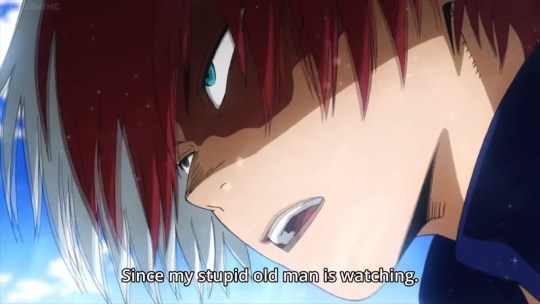
But the biggest highlight of the arc was the exploration of one character’s trauma and abuse. An arc revolved around a characrer (Todoroki Shouto) having difficulty using the powers he inherited from his abusive father. The story was heartbreaking and well-done and addressed in a very moving way with a very emotional “you are not your parents, it’s your power and body, not theirs” core- but what really impressed me was that the arc’s acknowledgement that this kid’s recovery would not be instantaneous and it was going to be a long and difficult process involving many other steps.
In most shows, once Todoroki had gotten his weird therapy session courtesy of the protagonist, Midoriya, and had been able to use his powers once, it would have been over, done, he’s fixed and he can totally use them now. But instead, the show acknowledged that being able to overcome his trauma enough to use them for a few minutes didn’t mean he’s now so recovered he can just use them whenever he wants. Todoroki realized that he had a lot of unresolved issues he needed to work through and a lot of steps he needed to take before he could recover enough to be truly comfortable with using his powers all the time. “It’s not that I’ve accepted anything, it’s just that, for a moment, I was able to forget about [my dad]”, as he put it. And the show showed us that it had every intention of following him through that recovery process.
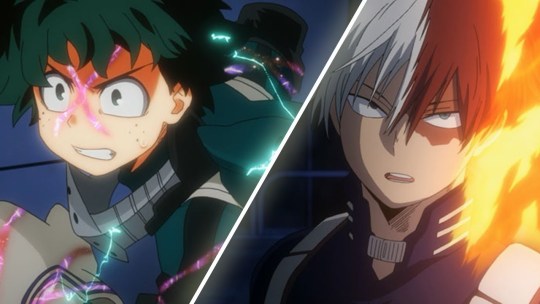
Seeing this over-the-top show about superpowers and fights where people suffer ridiculous injuries actually approach trauma recovery in a realistic and nuanced way really shocked me and also majorly tugged by heartstrings. The whole conflict also added some depth to the show’s world building- Todoroki’s scumbag dad is one of the top superheroes out there, despite being a totally horrible person. When being a superhero is a competitive profession rather than a calling you get people who aren’t necessarily “good” or into “saving people” as much as they are in it to make a profit and show off their powers. Which went nicely with the themes of the arc that followed the tournament arc.
The way the show plays around with typical shonen tropes is also great- the show has the highly gifted, arrogant once-upon-a-time-they-were-friends rival for our main character, but he doesn’t become insufferable like most of those characters because the show makes fun of him constantly. None of the other characters put up with his bullshit or take him seriously, he’s constantly called out and made fun of for his asshole attitude and the main character finds him genuinely unpleasant to be around and tried to avoid him socially. This allows his ANGRY EDGELORD nature to be funny rather than annoying, because the show’s in on it too.
And while Todoroki also could have also been a brooding asshole rival character, he’s pretty quickly to be revealed as a nice, kinda dorky guy who’s just quiet, awkward and introverted due to trauma and lack of social interaction. The show’s really self aware in how if plays with these character archetypes for the most part, and that makes it a pleasure to watch.

The show continued its solid character work, punctuated by dramatic and well done fight scenes, through the next arc. Almost every single kid on the show got a moment to shine this season, and you got to know them as characters and heroes and I came to realize- hey, I REALLY LIKE most of these characters.They’re being developed in a fun and interesting way, and they have lives and motivations that don’t just revolve around the main character. And the relationships and dynamics between the various characters are fun and heartwarming too.
And this includes the girls, who, while definitely outnumbered by the boys and underutilized compared to them, are really competent, interesting and have some great moments and arcs going. I especially enjoyed the mini-arc where one of the girls lost confidence in her ability to lead and thought a dude would be better at it, only for him to assure her she’s way better suited for it than him. Always nice to see ladies in command being respected by the dudes with them.

But that does bring us to the fact that while it has some good female characters, the show also has some pretty big sexism issues. All the older female heroes we’ve seen so far are basically walking sex jokes/fanservice dispensers and even some of the younger female characters are uncomfortably sexualized (Momo’s got the classic “oh she has to wear a ridiculously impractical costume because her powers require it” aka “I gave this teenage female character these powers specifically so I could sexualize her”). The fanservice gets to the point of distracting from the plot at times.
There’s a huge absence of female mentors so far (I hear that gets better later) and out of the entire teaching staff of the school, only one is a woman (and her character boils down to “bondage joke”) What’s more, while the girls are good fighters, their powers tend to be less offensive and "powerful” than the boys (this is especially obvs if you look at their official stats). Oh and there’s this fucker:

...who routinely sexually harasses and assaults his female classmates and it’s supposed to be funny and harmless. Every single time this asshole comes on screen u have to put up with a deluge of gross-ass comments and seeing the female characters repeatedly be objectified and have their space invaded. And no, them hitting him or other characters saying it’s gross does not make it okay. It’s still allowed, it’s still clearly there to be “funny” and “titillating” and it still uses girls being abused as a “fun” interlude. That’s NOT okay. It’s not funny. He adds nothing to the show, he just grinds everything to a halt and makes everything uncomfortable. It’s jarring, and takes you out of an otherwise well done story. I really want him and this type of “humor” to be ejected from the show.
But yeah, with those major issues in mind (and god I wish they weren’t there), I still really enjoyed MHA and can’t wait until the next season. The plot’s ramping up and I can’t wait to see where it goes next.
KiraKira Precure a la Mode

Kira Kira Precura a La Mode follows a group of magical girls with superpowers based on both sweets and animals. They run a pastry shop together and protect their city from monsters who want to suck the energy of people who are happily enjoying their favorite confections.
Okay, this is still ongoing, but I think it’s safe for me to say at this point that KiraKira is well on its way to being one of my favorite Precure shows, which considering how I’m a pretty big Precure fan, says a lot.
The writing is solid, the characters are fun and well-developed and the animation and art design is well-done and adorable.

This season added a few fun new touches to the Precure formula, including having two older girls on the team- a pair of 17 year olds hanging with the 14 yr olds (14 is the typical age for Precure protagonists). This pair is a butch and femme couple pretty clearly patterned after Haruka and Michiru- and yes, that also means they are fairly blatantly a lesbian couple.
There is in fact an entire episode revolving around Yukari (femme cat magical girl) trying to make Akira (butch dog magical girl) jealous by threatening to marry a prince and making Akira compete with him for her love. All the while, Akira struggles with whether she should share her true feelings with Yukari. This culminates in a big love confession scene that added ten years to my life. Seeing the younger girls aggressively encourage and support their relationship is great too.
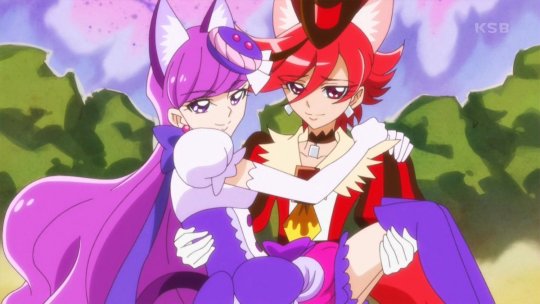
So yeah, about as blatant as S-season Haruka and Michiru- which, if you understand that reference, means there ARE some scenes that try to cast ambiguity on the relationship. This one, for instance, where Akira acts flustered in response to the prince’s suppositions about her relationship with Yukari (and his incorrect assumption about her gender), makes sense in the context of a just forming relationship, but also didn’t add much to show and was likely included so the show could make it seem ambiguous if Yukari and Akira will truly enter a relationship.
However, it has been a long time since we’ve gotten lesbians this blatant in a magical girl show aimed at young girls. Ever since the days of Cardcaptor Sakura and Sailor Moon, gay subtext and text in magical girl shows has been much lighter (and heck, even fanservicey aimed-at-guys magical girl shows don’t seem to have the guts to have girls kiss).

So the fact Precure is now deliberately homaging and emulating Haruka and Michiru and doing blatant love triangle/confession scenes IS a big deal and a step in the right direction. It’s sad we haven’t progressed since the days of Sailor Moon, but it’s good we’re at least not regressing anymore. And while Akira and Yukari haven’t gotten the word of god “Yes they are lesbians” confirmation Naoko Takeuchi gave Haruka and Michiru, (at least, not any we’ve heard of in the West), I wouldn’t say it’s outside the realm of possibility that could happen. (I really doubt the “lol we’re having sex” lines similar to what we got in Sailor Moon Stars will happen though, just because Precure doesn’t do sexual innuendo).
And it’s worth mentioning, we do have an official duet song for Yukari and Akira that’s VERY blatantly romantic. “Koi” is even in the title.
Yukari and Akira are a censored relationship for sure, and it’s obnoxious and wrong those censors are still in place (though not surprising, considering this is a big corporate studio running Precure). They should be able to kiss, they should be openly dating. However, they are obvious enough that if they were a straight couple, we’d be calling them canon at this point, so I’m gonna. Also, I have to shout out that they’ve poured on Utena references GALORE with these two, and I’m super into that.
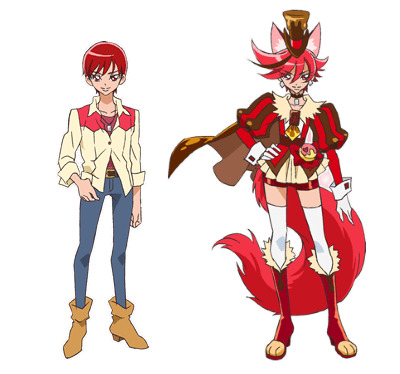
It should also be noted that Akira is allowed to maintain her butchness even after transforming into a magical girl- she gets a frilly PRINCE outfit. That’s a first for a magical girl show aimed at girls (unless you count Utena, which I don’t for various reasons). She’s never derided for her lack of femininity either (in fact she’s considered cool and attractive) which is a very good affirming message for young girls. There’s also another episode that frames rebellion against enforced traditional femininity as a good thing and has women standing up for and supporting other women who don’t follow gender roles.
To state the obvious, Precure is a show that exists in a capitalist society. So it’s focused on selling toys to little girls and those toys are often stereotypically hyper-feminine. However, it’s still valuable and positive that this show is casting non-gender conforming heroes in a positive light- if a little girl wants to play as Akira, she might have a pink compact, but she can use it to become a dashing butch prince. The lines are blurring in a good way.
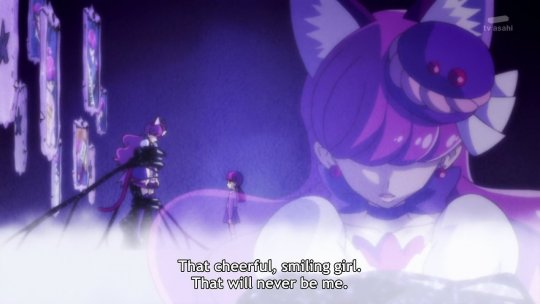
Yukari is also notable as a great character- she’s not the genki girl archetype, but messy, petty and a bit cynical. She’s complex. The episodes where she struggles with whether she’s a “good girl” are pretty inspiring and carry the message girls can be heroes even if they’re not all sunshine and daisies.
In fact, all the characters in the season are ALL pretty solid. Their relationships are fleshed out and so are their arcs. The dynamic the whole team has is great. The villains redemption arcs are strong as well. And as always, it’s cute as heck and bursting with lady friendship feels.
My biggest problem with this show would be pacing- it suffers from being two rushed a lot of the time, and often tries to cram way too much in one episode rather than giving conflicts and arcs room to breathe. But that’s my only big issue.
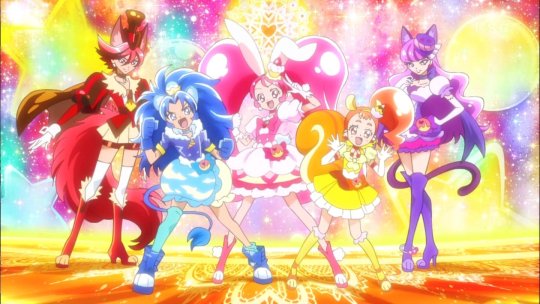
It’s possible KiraPre could have a disappointing finale, but I at least feel confident it won’t end in total disaster. It shows none of the warning signs shows like Hachepre did- there’ve been no love triangles, bland male love interests or anything of the sort shoehorned in, so I don’t feel I have to worry about the worst happening (the “worst” being “the finale revolves around soothing a dude’s wounded ego, with the bond between the magical girls and their power being sidelined for the sake of really uncomfortable and contrived het romance”, if you haven’t seen HachaPre).
Let’s hope KiraPre’s finish is as strong as the rest of it has been!
#my hero academia#kirakira precure a la mode#kira kira precure a la mode#anime overview#summer 2017 anime
52 notes
·
View notes
Text
For the Love of an Unworthy White Man
In October 2018, I finally saw Miss Saigon, after deliberately boycotting it for almost thirty years.
When it first opened in 1989, between the tired rehashing of Puccini’s Madama Butterfly and the yellowface casting controversy over Jonathan Pryce as the Engineer, there was nothing about this show that appealed to me, especially when I had already seen M. Butterfly, David Henry Hwang’s groundbreaking, Tony-winning play that turned the submissive Asian woman trope on its head. M. Butterfly literally changed my life at a time when I was just learning to navigate being an Asian woman in white America, and everything I read about Miss Saigon seemed to be in direct opposition to the lessons I learned from M. Butterfly: resist stereotypes, claim your heritage proudly, never let a man control the direction of your life.
So, despite my love of Broadway musical extravaganzas, and my hunger to see Asian performers onstage, I never went to see this blockbuster hit. Whenever a production of Miss Saigon rolled into the Bay Area, people who knew how I loved theatre would ask if I was going to see it, and I’d have to explain once again why I found the basic premise of the story offensive and refused to support it. I got the distinct impression that a lot of people were internally rolling their eyes at my futile protest, but I didn’t care. It was a matter of principle.
Until now.
So...what changed my mind?
Well, first and foremost, Soft Power. That was the Asian American musical extravaganza I’d been waiting for. David Henry Hwang’s absurdist semi-experimental comedy--about Hillary Clinton’s influence on a Chinese entertainment mogul that cast Asian American actors in whiteface and stands American cultural hegemony on its head--had me laughing and crying like nothing else I’ve ever experienced in my life. It was incredibly uplifting--especially in Trump’s America--to see so many Asian faces on the stage, dancing and singing, poking fun at clueless, self-important, white Americans, subverting stereotypes and challenging expectations. That was in July.
Then, I saw Two Mile Hollow by Leah Nanako Winkler at the Ferocious Lotus. And Straight White Men by Young Jean Lee, the first play by an Asian American woman ever produced on Broadway. And then To All the Boys I’ve Loved Before on Netflix. And finally, Crazy Rich Asians on the big screen in August.
In one glorious and unprecedented summer, I saw more Asian American representation on stage and screen than I had in my whole previous American life. Because I had always watched Chinese films and television shows, I had thought I was OK on the representation front, but really, it’s a totally different experience. Seeing Asian American representation, finally, fed my soul in a way that I hadn’t realized I needed, like I was starving and didn’t even know it until I feasted on all these wonderful stories about people like me.
So when I was offered free tickets to Miss Saigon, I was surprised to not feel the visceral anger that had always bubbled up when this show came to town. I decided to go see it, in order to understand it better, and in the hopes that this new revival would have addressed some of the more problematic parts of the story. Also, the tickets had already been paid for, so why not? I wasn’t supporting the production, they already had the money.
To be fair, I didn’t hate it, I just didn’t like it. I did try to look for positives: the set was well designed and efficient; the big helicopter scene was pretty epic, as promised; the whole flashback to the fall of Saigon was powerfully choreographed, and once again, I loved seeing so many Asian faces on stage. The kid who played Tam was adorably cute, too. He melted my grumpy heart a lot, for sure.
But that story! It was agonizing to watch it unfold, yet again, knowing that the Asian woman we’d been coerced into sympathizing with was going to negate herself, disappear conveniently, so everyone else would get to have everything they wanted.
It’s the lesson this world has been forcing down my throat for my entire life, and I’m tired of puking it back up in their faces.
And that doesn’t even begin to address all the other tired old tropes: desperate Asian prostitutes clinging to American johns as their only chance at a better life; smarmy, abusive pimps-of-color who are still, somehow, the most practical and clear-eyed counselor for our heroine; conflicted, guilt-ridden white saviors confronted with the limits of their power and privilege. I’d seen it all before, so many times, and it was exhausting to sit through yet another iteration of this sad, incomplete, stereotypical story.
Even worse, sitting there in the audience next to my white American husband, I felt embarrassed. I imagined the other playgoers--mostly older, mostly white--seeing us and thinking, “Oh how nice for them. What a lucky girl that one is, unlike poor Kim, to have won her white knight in the end.”
If you think I’m being melodramatic, I assure you, I’m not. I’ve encountered that condescending attitude from way too many people--including members of my own family--for three decades now. Because my husband is a conventionally handsome white man from a wealthy family, a ridiculous lot of people assume that he ‘rescued’ me, or ‘lifted me up,’ or was somehow my ticket to a ‘better’ life by conferring upon me proximal access to his privilege and power. They see his love and commitment as an asset that I’m fortunate to have added to my portfolio, as if our relationship was an investment and I’m getting a higher return than he is. The implication, of course, is that he doesn’t gain as much from being with me as I do from being with him, because I don’t bring anything as systemically powerful as white male privilege and hereditary wealth to the table. Instead, his love for me is viewed as beneficent, charitable, a gift I should be eternally grateful for, and so many people are puzzled that I am not.
In short, they think he is better than me, because he is white, he is a man, and he has money.
What they don’t see, or acknowledge, or recognize as valuable, is the emotional strength and intellectual clarity that I possess, and the very traits that my husband fell in love with, back when he was a troubled young man. What they cannot grasp--because these stories are rarely told, which is why I’m telling it, now--is that in reality, I rescued him from an empty, directionless life of dead-end work and weekend debauchery, and earning my love is what gives his life meaning.
When we met (in 1989, the same year Miss Saigon premiered in the West End, the same year I saw M. Butterfly for the first time), my husband was a twenty-three year old college dropout, working construction, drinking to excess, without a plan for the future or hope for a meaningful life. Sure, he came from a comfortably affluent family, but you’d never have known it from the way that he lived. He had rejected most of the trappings of privilege that he was born into, as well as its conventional, materialistic values, but had not yet formulated a coherent set of values for himself or discovered a purpose in life. He also espoused some really off-putting political views, half-jokingly idolized horrible, evil men like Richard Nixon and Charles Manson, and was prone to loud, obnoxious rants about things he clearly didn’t understand. I found nothing remotely attractive about him in our first few encounters.
For his part, he didn’t even notice me for the first eight months we were in each others’ social orbit. It wasn’t until we were thrown together in a booth at La Rondalla that he even remembered me for the first time. But for whatever reason--and in thirty years, l still haven’t gotten a clear answer about his reasons, introspection is not his strong suit--that night he decided that I was what he needed in his life, and he set about wooing me despite my initial rejection of his advances.
I did not take his courtship seriously at first. The trajectories of our lives were not in sync, and I had no intention of deviating from my goals. So far as I could tell, he had no goals, and I was reluctant to engage with someone who seemed so lost and unclear on his purpose in life. He was, quite simply, not worthy of my time or attention.
Luckily for him, he made his move at a time when I was bored, waiting for my life to start--I was taking a gap year, working as a bike messenger in San Francisco, and had just been accepted to my dream college, with four months to kill before heading off to Berkeley--so I agreed to go out with him, figuring it would be a summer fling that would end when I went to Cal. Much to my surprise and consternation, by the time school started, we were in love. This was not what I’d expected, and I tried, repeatedly, to break up with him during my freshman year, to no avail. Every time I worked up the courage to break his heart, I felt terrible and took him back a few days later. I hadn’t counted on that. I’d never been in love before.
One thing I’ve learned over the years...assuming there’s nothing fundamentally repulsive about them, it’s really hard to not love someone back who loves you wholeheartedly, without reservation. Chemistry is a mysterious thing, not always logical or rational, and what happens between two people can be hard to understand from outside the relationship.
Even though I loved him, it was not easy to live with him. The trollish, aggro behavior that initially turned me off took a long time to for him to unlearn. He was often blind to his own privilege, and harbored deep insecurities that he refused to address. It took years to convince him to seek help, to confront his demons, to become a better man, and it was exhausting to be the constant voice of reason in the household, holding everything together because he hadn’t figured his shit out, yet.
Over many years, he did slowly work through most of his issues, ultimately winning me over with his unwavering commitment and devotion, and most importantly, his willingness to change and grow in order to keep me in his life. After over three decades together, through many turbulent times, we’ve finally arrived at a relatively calm harbor in our relationship. It took a long time--a lot longer than I could have ever imagined when I first agreed to go out with him--but he has become worthy of my love.
But this isn’t what most people see when they see us.
What they see is a tall, handsome, successful, wealthy white man and the lucky immigrant Chinese girl who had the good fortune to snag him, lifting herself and their children into affluence in one generation.
What they refuse to consider is the simple fact that falling in love with me, and working hard to become a man worthy of my love is the best thing my husband has done with his life.
What they expect to see is 150 years of western imperialism in China played out in human form.
What they don’t see is who we really are.
Anyone who actually knows us, who understands the dynamics of our relationship, knows better. While my husband’s status and wealth is infinitely helpful in maintaining our materially comfortable lifestyle, and there is no question that he is a loving husband and father who works hard to provide for us, the entire construct of our lives is built upon my deep reserves of emotional strength, confidence, and resilience. I hold everything together, sometimes through sheer strength of will, fighting his self-destructive neuroses every step of the way. I suspect this is true in a lot of long-lasting relationships, but women are conditioned not to let people know this, lest it makes their man look weak. It’s time for strong women to break the silence, to stop hiding their strength in order to make men look stronger.
Not too long ago, someone whom I’ve never met, who doesn’t know us and only knew that his wife was Asian, asked him, “Does your wife even speak English?”
When he reported this exchange to me, laughing at the absurdity of other people’s assumptions about us, he was very surprised that I was furious that he thought it was funny. To him, and many other people, the fact that I am highly English proficient should take the sting out of these insulting assumptions about my language abilities. What they don’t understand is that the real assumption, the true insult, is that I am fundamentally less than he is, and there’s nothing fucking funny about that.
0 notes
Text
I have seen the Star Wars
And I liked it a lot. More under the cut because
SPOILERS! SPOILERS! SPOILERS!
I have managed to see this movie without knowing anything about it before (besides seeing the trailer), also thanks to tumblr new feature to blacklist content. I don’t remember the last time I saw a movie without knowing anything about it before, because especially with big movies like Star Wars or Marvel movies it gets really hard these days to avoid spoilers if you don’t want to avoid the internet all together. I have seen some (spoiler-free) first postive reviews, so I was a bit surprised to see wank/negative reviews on tumblr.
I admit that when it comes to Star Wars I am a casual fan. I have seen the movies, and as the guys I went to the cinema last night confirmed I do know what I’m talking about (also hopefully I found some new cinema buddies). I care about the characters and the story, but I am probably not as emotional invested as others. I like the idea of some ships, but very casual, and my entertainment of these movies is not influenced by any ships. That is not to say that I don’t get why some people might be upset about certain aspects about the movie. Everyone who follows this blog knows I ship Dean and Cas, and while there are many other aspects why I watch this show, I am emotional invested in this ship. So yeah, I get it.
Overall I liked this movie a lot. I need to see it a second (and third) time but for now I would say I liked it better than The Force Awakens. Which was a great movie, but as many noticed it kinda used Episode IV as a blueprint. Ironically I feel that many people back then critized this, who now critize that The Last Jedi no longer feels like Star Wars. I disagree. I felt that there where many parallels and references to the old movies, but at the same time they tried to do something new, to subvert some tropes and the audience’s expectations. Big movies, especially the Original trilogy, work a lot with tropes, so they took some risk here with breaking what the audience expected to see. I think in parts they already did this with Rogue One, which tone was different (read darker) than what you would expect from a Star Wars movie. Then again it was a stand alone movie, which allowed them to try out new things. Again I get why to some people feel like this isn’t Star Wars anymore, but I personally liked the new direction they are going.
Visually it was a great movie. There were a lot of iconic scenes/shots, and Rian Johnson certainly likes the colour red. The scenes that (visually) stand out for me were the fight between Rey and Ben vs the Red Guard and the whole big fight at the end on Crait. They do kow how to work with colours. But unlike other directors Johnson didn’t forget to focus on his characters first and foremost. They were a lot of great character moments, a lot of insight, though of course with the sheer amount of characters they couldn’t give every character the same focus.
I feel like the movie had some lengths in the second part. But then this is a general problem these days that I feel that every movie has to be at least 150 minutes long, where I think 120 minutes would have been enough (and does anyone remember 90 minutes long movies?). The other thing is that of course The Last Jedi is the second part of a trilogy, so naturally it feels like it is missing a proper end. The Force Awakens was the set up, and while The Last Jedi continues the story, it can not end it. We do get some answers but at the same time a lot of new questions.
I also feel like this was the darkest Star Wars movie yet (excluding Rogue One). There was a huge body count and the constant reminder that we are in the middle of a war. Yes, the Original Trilogy also took place during a rebellion, but they never showed the casualties so openly. Furthermore The Last Jedi repeatedly shows us our heroes failing their missions. We expect them to win, because they always do, but they don’t. People die and there is nothing to be gained expect heartbreak and grief. At the end of the movie the rebellion is at its lowest point, but yet they remain hopefull. They fight and they fail, but they never lose their hope.
Some other things:
- I liked that they gave Poe a bigger role this movie, though I hope that we do get to see more about his backstory in the last movie. I know that there are comics and books who explore his background more, but I would love to see some aspects of this in the movies. I want to know more about his relationship with Leia. I don’t think Poe was portrayed as making the wrong choices, and neither was Holdo (or Leia). They were trapped in a situation where they were no longer right or wrong choices. I think they made a good point to show us both Poe’s and Holdo’s thought process and to question each of their decisions. I’m glad Poe finally met Rey. I hope they become BFF. Oscar Isaac looked very good and I’m pretty sure some shots were only designed to remind us of this fact.
- Luke. Oh Luke. I admit that I had some trouble believing that he wanted to kill Ben. This is the same guy who convinced his father to give up the dark side, not through fighting, but through love and hope. I do believe that he had some doubts and that his exile was a punishment for the damage he had caused to Ben. Would he have killed Ben? No, I don’t think so. I don’t think it is completely out of character for him to be afraid of Ben going dark side. But I get why this scene caused so much debatte.
I could already tell that something was off about him when he appeared on Crait because the beard was wrong. I think narratively that his death made sense and the callback to the iconic two suns scene was beautiful. He died in peace, being one with the force. And seeing as this was the second death of one member of the original trio this continues the theme of letting go of the past.
- Speaking off. Luke burned down the last remains of the Jedi religion. Ben told Rey to let go of the past. The message here is clear. Star Wars is heading into a new direction. One that has its roots in the past, but who is trying out new ways and tries to form their own identity. I wouldn’t be surprised if the third movie marks the end of both the Jedi and the Sith/The First Order. The force, as Luke tells us, doesn’t belong to the Jedi. It is neither good or bad, the same as the force users are neither good or bad. The Force is all about balance. We know from the past that the Jedi haven’t been perfect either. Seeing as they already plan a new trilogy after this one ends, that will not feature any Skywalkers, we might also see an universe without Jedi and Sith.
- Reylo. I admit that this is a ship I couldn’t get behind after The Force Awakens, as I couldn’t see Rey falling for a guy who had just killed his own father. I’m still not sure about this ship or Ben’s character in general (I call him Ben, because that is a better name then Kylo, and Rey did so as well, so). I’m not sure if I want a redemption arc for him or how it could work. I know Vader got one, but it ended in his death. I am also not sure if their relationship is romantic. They are connected through the Force and the only other two characters we saw being connected like this were Luke and Leia. So, romantic false lead only to be revealed to be siblings/cousins/relatives? And yes I know that Ben told Rey about her parents, but I am not sure if this was the truth. On the one hand it would be cool to have a character like Rey, who doesn’t come from a powerful family, to be such a powerful Force user. But Ben’s line, that she is nobody except to him, I didn’t see it as romantic. If anything it was manipulative to tell her that nobody cared about her except for him. I think their relationship/dynamic is interesting and it certainly added more to Ben’s character. Still don’t ship it though.
- Force user Leia!!!!! I saw some people surprised by this, confirming to me that some people simply forget that Leia is a force user as well, even though she isn’t a Jedi. I obviously wish we would have seen more of her as this was Carrie Fisher’s last movies. Loved her interactions with Poe and that she had the chance to say goodbye to her brother.
- I loved Rose. I know some people complained about the lack of diversity but I honestly don’t see it like that. We had plenty POC and women, and even more women in leading positions, at least in the rebellion. Still missing a queer character though. But yeah, Rose. Lots of love. And I liked that their mission Cantonica put some focus on the complexities of the ongoing war. Showing us the people who became rich because they sold weapons (to both sides) and how the poor suffered. I have no feelings towards Rose/Finn. I think they were cute together but it is also not set in stone that they do become a thing. (Though I think it is still more likely we get Finn/Rey than Finn/Poe, because I don’t trust big movies with queer ships)
- Maze/ Captain Phasma. I feel like they wanted to include those two characters but then they didn’t know what to do with them. Especially Captain Phasma. In a way I’m glad they killed her off because they wasted the potential of this character completely.
I think this is all. May the force be with you.
2 notes
·
View notes
Note
As someone who enjoys reading your DR-related meta and opinions, whether NDRV3-focused or not, what are your feelings on the Impostor? I mean, I feel like I can guess to some degree, but I'm especially interested because it feels like a lot of the Impostor's qualities and actions (the realness of one's identity, having to navigate between telling lies and telling the truth, going to drastic security measures to prevent killing, self-sacrifice) are given major focus and exploration in NDRV3.
Honestly, the Impostor is one of my favorite sdr2characters. His concept is fascinating, his FTEs are solid, and I’ve alwaysfelt that the way they played around with expectations from the first game withhim was really, really fun. On a re-read, so many of his lines read entirelydifferently. It’s perfectly possible to see how easy it would be to tie him inwith the real Togami—but it’s also much easier to see all the foreshadowing andclues about his own past there, too.
Even in dr3 he was extremely enjoyable, despite the muchweaker writing, and the fact that they still didn’t clarify much about him. Butthe fact that he was there at all, and that he took such a prominent role inthe plot, was perhaps one of the few things I actually really did like aboutDespair Arc. It was very, very easy to see how the Impostor’s own desire to be “seen”and to find his own “sense of self” was meant to parallel Mitarai’s tendency tothrow away everything about himself that wasn’t directly related to working onhis anime.
The fact that he was one of those characters who, likeHoshi, initially seemed like he was going to be a “joke character” but thenmanaged to subvert the expectations made me really thankful. They gave him areal amount of depth to his character and made him incredibly interesting,rather than keeping him flat or one-dimensional. Honestly, he’s one of the sdr2characters I would’ve most liked to see make it to the end (although Iunderstand why he didn’t, considering his leadership would’ve been much too effective in later chapters, sohe was the perfect first target all around).
As you said, many of the themes regarding his character tiein perfectly with ndrv3 as a whole. As someone who “lies” to the entire worldand deceives others constantly, that “lie” has become a “reality,” at least forthe people who interact with him. His talent is so impeccable that no one whohe interacts with can tell the difference between him and the real thing unlessboth are standing side by side, which draws fascinating parallels with Tsumugi’sown cosplayer talent.
Unlike Tsumugi, who seems to be able to perfectly replicateappearances, voices, and ideals, but unable to really mimic anyone’s talentsper se, the Impostor’s talent is much less about impersonating the physical appearanceof a person (though he does take those factors into account in order to pass asthem convincingly) and much more about researching them and their talent sothoroughly that he’s literally able to embody it or become it. While Tsumugi’stalent is a blend of “real-fiction,” as she says repeatedly during the Chapter6 trial in ndrv3, the Impostor’s is much more bent on becoming “a convincingstand-in” or “back-up.” But in exchange, he’s never been allowed to be his ownperson even once.
Looking at the Impostor through the lens of some of thethemes in ndrv3 is really fun, honestly, because I feel he would’ve fit rightin with the cast as a character. I wouldn’t even be surprised if Kodaka kind oftook certain elements from his character in sdr2 and decided to recycle them toother uses in ndrv3, considering he definitely did that with other elements andcharacters from both of the previous games (re-playing dr1 I found a line in aMonokuma theater that I’d forgotten, about “Noah’s Ark” being sent off tospace, and I just stared at it for a while before shaking my head).
Ultimately, the Impostor is someone who has had no choicebut to lie in order to survive, and who is extremely tired of it. More thananything, he wants to be able to shed his disguise entirely and live as his ownperson—but he’s afraid that there isn’t any such thing, and that people willonly ever see him through the mask and lens of the people he’s impersonated.Having lived a life exclusively of lies, he wants to begin living a more honestlife with the people who put their trust in him, which is a very sympatheticgoal, in my opinion.
I also find it fascinating how his FTEs/Island Mode confirmthat Togami is the person he wanted to impersonate the most because hisexistence was so “absolute” and “concrete.” Togami’s own backstory as someonewho had to claw his way up and fight for the right to be the heir to the Togamifamily, clearly resonated with the Impostor. Togami is someone who has a veryundeniable, clear presence which is hard to ignore, which is the completeopposite of the Impostor’s own presence as someone with “no name, no birthcertificate, and no family,” who “had nothing.”
By impersonating someone like that, it was an almost liberatingtaste of what it was like to have that kind of “presence.” Despite the factthat he still had to act and talk according to “how Togami would behave,” theImpostor was still allowed to have a very strong and commanding presence in thegroup, and as a result many of his real thoughts and intentions often slipthrough, both in his FTEs and shortly before his death in Chapter 1. As someonewho wanted nothing more than to interact with his classmates and have an “ordinarylife,” it’s fascinating how he manages to experience that through living as someoneelse. But in the end, he still very much considers it “just a lie” and clearlywants to come clean about the whole thing at some point.
His desire to “become Togami” because of Togami’s presencebeing the complete opposite of his own actually reminds me quite a lot of thecharacters’ participation in the ndrv3 killing game. Considering the wholeappeal of willingly participating in Danganronpa was very likely to get a sayin becoming whatever kind of character you could want, and getting to live “withinthe world of Danganronpa,” there’s definitely the same sense of “wanting tobecome someone else,” which we see most clearly in some of the audition videosthat Tsumugi plays during the Chapter 6 trial. Saihara’s eager request tobecome a detective on the show, and Kaede specifically asking to be someone whocould trust and lead others because she’s “never really trusted people before,”are pretty interesting parallels to the Impostor’s desire to be noticed byothers and leave a strong impression on people.
I’d be pretty interested in seeing a take on the Impostor asa participant in an ndrv3-like killing game, actually, maybe in a fanfic orsomething. It’s really interesting to explore the idea of someone who wanted to“become” a previous character entirely, and I wonder if it’s something thatmight’ve happened in any of the other seasons before. Tsumugi’s talent allowedher to make up entirely new “characters” and identities as she saw fit,including the “character of Tsumugi Shirogane.” Anything worked for her as longas it was fictional, but the Impostor is specifically limited to impersonatingpreexisting characters.
In Saihara’s audition video, he makes references to “severaldetective characters” which have been on previous seasons of the show, and howhe “really likes all of them,” but he doesn’t mention any specifically by name(even though we know Kirigiri has to be included on the list). By contrast, I’dimagine that the Impostor in an ndrv3-type scenario might actually ask directlyto “become” one of the characters from a previous show. Togami’s the obviouspick, of course, since that’s “who he’d want to be if he could become anyoneelse.”
As for another point you mentioned, the Impostor’sself-sacrifice and leadership qualities are also part of why I love him so muchas a character. In ndrv3, it’s common for many of the characters to talk about “wantingthe killing game to end,” but many of them fall into the pitfalls of blindtrust and optimism, which is repeatedly lampshaded by the narrative. But whenthe Impostor makes his attempt to “end the killing game” in sdr2, what I findthe most interesting is that he does it specifically by doubting the others andkeeping an eye on them, further emphasizing Nanami’s point later on that “doubtand belief aren’t necessarily opposites.”
In order to truly believe someone and get to know them, youhave to doubt them first. This is exactly what the Impostor tries to do in hisplan to keep watch by throwing a party in Chapter 1. Because of Komaeda’sletter, he knew there would be a murder attempt, beyond a shadow of a doubt. Hedidn’t waste time with naïve excuses or blind trust, but resorted immediatelyto an attempt to keep a close eye on absolutely everyone and devise a scenarioin which it’d be impossible to kill someone. He was extremely careful andthorough, qualities which I’m pretty sure are entirely his own and not just aresult of him impersonating Togami. Honestly, if he’d been going up againstanyone other than Komaeda, whose luck played a huge factor in Chapter 1, Ithink his plan would actually have succeeded.
As someone who has had to lie constantly throughout hiswhole life, the Impostor clearly wants to be trusted and believed in by others,and as a result, wants to believe in people in turn. But, like characters likeKirigiri and Ouma, he was clearly aware that lies, doubt, and suspicion arerequired in a situation like the killing game. His ability to balance both liesand truth, as well as doubt and belief, made him a very ndrv3-like character inmy opinion (or rather, ndrv3 was a very Impostor-like game), and were theprecise reason he was so effective as a leader.
In any case, he’s a fantastic character despite hisrelatively short-lived appearance (though in general, I’d say the Chapter 1victims have a lot more long-lasting presence than most of the Chapter 1culprits). I always love seeing more of him, and his bonus mode events in ndrv3were really fun all around. Thank you for asking, anon!
#sdr2#super dangan ronpa 2#ultimate impostor#shsl impostor#twogami#ndrv3 spoilers //#my meta#okay to reblog#heavy ndrv3 spoilers are here mostly because i was comparing him to a lot of the themes of the game#anonymous
77 notes
·
View notes
Note
Re: your response to the discussion on Deancas in season 12, in previous metas you and others I think discussed how the overall season long arcs are often laid out and shown in ep 1 and close in the finale - thinking re: Deancas as such obvious hunter husbands in eps 1/2 and family/ belonging already clearly important... this must be an arc long story that will cumulate in the finale (with ups and downs along the way hence cas centric guilt/belonging episodes in between) - does this make sense ?
Yeah, there is some through-line from season to season, with plots that are ongoing, but for the most part the main character arcs are established in the first episode of the season. Or really, in the first couple of episodes, considering s11 and s12 both opened on what could easily be considered two-parters. In some seasons it’s more obvious right from the start, but in others it requires looking back from the end in order to see the entire journey and get that lightbulb AHA moment where it all comes together...
*season six i’m looking at you*
Depending on what angle you look at the season opener(s) from, it might be hammer-to-the-forehead obvious from the jump, from another perspective might not work at all. Llike s11 was to me, despite others feeling entirely unsatisfied with it all, and even feeling like the original intent behind the season’s arcs was “derailed.” I was looking at it from a different perspective. The series’ established patterns were subverted throughout, and what would’ve worked as the markers of “foreshadowing” in previous seasons functioned more like lenses into the past, or warnings that the characters were able to internalize and learn from rather than falling into those old traps yet again.
My response to that was FREAKING FINALLY! because we got what looked like the beginnings of some real character growth toward the end of s11. But people who were looking at the same signs I was through the lens of past history repeatedly saw these same things as “falling back into old patterns” and “perpetuating the codependency” despite the overall lesson of the ENTIRE FREAKING SEASON. No wonder people were caught off guard by the ending. They were expecting the worst, and we were given something completely different.
Basically what I’m saying is it’s all in how you look at it.
So what I saw in 12.01 (and 12.02) was that we’re going to be reexamining and redefining what family is in every way. @k-vichan laid this out well here:
https://k-vichan.tumblr.com/post/155923741334/so-i-rewatched-all-eight-episodes-of-season-12
But these aren’t new topics to Supernatural. After all, the show’s been about family, what you’ll do for family, and the Family Business since the pilot episode. It’s just finally getting hauled out into the sunshine for a close examination.
When I reblobbed that post, these were the tags I stuck on:
#winchester family dynamics #which was one of the tags that I predicted I'd be using A LOT this season along with #using your words #especially because like you said both mary and cas have wondered what their place in the winchester family is #and whether they even belong there at all or not #not to mention we know we'll be delving into these themes even more soon not only with the winchesters including cas #but also with crowley and rowena and gavin #so far s12 has been identity and belonging and what it means to belong and what ties people together or sets them apart #aka family right? what was dean's definition of family again? #family cares about YOU not what you can do for them #family's there through good; bad... all of it they got your back... even when it hurts. that's family. #who wrote that again? oh right it was Dabb >.> #this is an andrew dabb appreciation blog (except when it comes to car stuff)
That Dean quote was from 10.17 when he was having his little heart-to-heart with Crowley in the bar. Written by Dabb. A theme that a lot of Dabb’s episodes over the years have revolved around. Found family, what makes someone family. So yeah, I think those are going to be big things going forward into the middle bit of s12. As you said, the middle bit of the story is where everything seems to break down. Conflict is brought to the fore, and laid bare so that the characters can hopefully learn and grow, make better choices for themselves, and start looking for resolution as we move toward the end of the season.
So what will they resolve about their family, and their place in it?
21 notes
·
View notes
Text
on reylo being one-sided
(and why I’m not a huge fan of this scenario)
This is something I’ve wanted to address for a while---the fairly popular idea that the “only” romance we’re going to get in canon between Rey and Kylo will be one-sided on Kylo’s part. That there’s no way Rey can ever return his feelings (or, more accurately, his obsession), and will never forgive him for what he’s done.
I’m curious as to why this became so easy to believe in our corner of the fandom (and I mean specifically reylo shippers). Is this because we want to keep our expectations low? Is it because we recognize that some of the arguments “against” this ship are valid? Is it because, despite all meta and character analysis, we ultimately see Rey’s character as incompatible with Kylo’s, or we don’t believe in the writers’ ability to make her compatible without “ruining” her? Are there any actual signs of this dynamic being necessarily, intrinsically unrequited?
The answer to the last question, in my opinion, is no. Kind of the opposite. But I’ll get to this later; meanwhile, I’ll concede that this is probably the easiest, safest scenario to speculate on. Kylo being fixated on Rey is already de facto canon, we’re not exactly making wild speculation here. From “what girl?”, to "forget the droid, we have what we need”, to the way he watches her for who the hell knows how long while she’s unconscious, to “I can be your teacher”, it’s clear that our bad boy finds Rey fascinating, and it’s not a stretch of imagination at all to assume that this fixation will only get worse from this point on---that he’ll probably try again to kidnap or lure her again to his side, now that he knows how powerful she is. Villainous crushes are a Thing, so there’s nothing particularly outrageous or unrealistic about this.
Rey, however, is much more problematic. Her developing some feelings (whatever their nature) for Kylo really seems at odds with the way her character is portrayed and with her other main relationship (Finn). She doesn’t seem to feel anything but unadulterated hatred for Kylo at the end of the movie, and she has every reason to feel this way: the guy killed her newly found parental figure, hurt her best friend, is complicit in genocides and the destruction of an entire solar system, his every action proved that Leia was wrong about him. That Rey can ever feel even the slightest sympathy, let alone attraction, for such a person does sound like a stretch. "Falling” for Kylo would either irreparably taint her likability as a protagonist (what kind of person is attracted to someone who hurt her friends?), or, as many ant*s fear, turn her into an ooc, pallid imitation of the strong willed, independent, loyal young woman we’ve seen in TFA. Rey doesn’t have any real “reasons” to fall for Kylo, and the authors can’t make it happen unless they bend her character in really unpleasant ways. That’s the assumption.
But we shippers still want to see some romance---because what we saw blossoming in Kylo is unmistakable and too juicy not to be explored by the narrative. A tragic unrequited love on Kylo’s part that ends with him embracing the fact that Rey will never return his feelings, but still sacrificing himself for her safety, and redeeming himself with this purely selfless act---that sounds like a good compromise, right? Right. It’s not bad. It’s feasible from a storytelling perspective, it leaves Rey’s agency, personality, motivations etc. intact, while giving a payoff to Kylo’s anticipated *pull to the Light* without turning the story into a cheesy, bad trope-ridden romance in which the bad guy “gets the girl” as a prize for becoming good.
Still, I'm skeptical.
I’m 100% here for angst and a conflicted, tortured Kylo Ren who doesn’t know what to make of his feelings for the enemy, but do I really want to watch him chase a recalcitrant, disgusted Rey around the galaxy for the next two movies? Hell, no. Not only I’m afraid I’d find this repetitive and quickly exhausting, but the discourse around him would only get nastier, the “stalker” reading of his character more substantiated. Honestly, I don’t want to hear any of that.
But more importantly: even if it’s done well and the stalkey vibes are kept at minimum, it would work for Kylo, for his arc. Rey, on the other hand, would remain crystallized in her rejection of everything Kylo Ren is and stands for, which reeks of character stagnation, tbh. Especially compared to the enormous development that Kylo would undergo should he start to genuinely care for Rey.
You know, if you put all the burden of character evolution---of “meeting halfway”---on Kylo Ren and none on Rey, the inevitable risk is making him much more interesting than her. (honestly, he already is, because the writers bothered to give him some complexity, some flaws that read as flaws, and not just as endearing quirks that don’t compromise the overall adorableness of the character.)
I personally don’t see Rey as already whole, and I strongly reject the idea that “she shouldn’t change anything about herself”. Not changing anything about yourself doesn’t sound like a great idea if you’re the protagonist of a trilogy that is simultaneously a hero’s journey and a rite of passage into adulthood. Rey needs an identity arc, a trajectory. She starts as a character with a rather black/white sense of morality, that the narrative doesn’t really challenge or present as even remotely problematic. That’s definitely less complex than, for example, Finn, who has a moment of “fuck, I’m getting the hell out of dodge” and then comes around, who lies repeatedly to Rey, to Poe, to Han, to the Resistance, who has this huge shadow of his former identity as a stormtrooper looming above him for 3/4 of the movie. Finn is conflicted---he doesn’t share Rey’s unflinching loyalty to bb8 (although, unlike Rey, he did meet bb8′s owner), and his primary concern is getting the FO out of his system and saving Rey. Rey otoh jumps on the good guys’ bandwagon almost immediately, the only thing holding her back (her desire to go back to Jakku to wait for her family) conveniently pushed aside to shove her into action. Amazing, but two more movies of Rey never questioning herself, her loyalties, her assumptions, never showing a single flaw, never even being tempted, sound absolutely dull to me. Luke is so memorable as a hero because he evolves throughout the movies; he’s not stagnant. He begins his journey as an idealist, naive farm boy with a very black/white mentality (the same we find in Rey), but then he’s broken, he learns something that forces him to reconsider his place in the war (in the universe) and his perspective shifts, and he sees a man to save where he used to see only an enemy.
Of course, Rey’s arc doesn’t necessarily have to be similar to Luke’s, and her evolution surely doesn’t hinge on her relationship with the main (anti)villain. But the way they’ve framed her interactions with Kylo---including the fact that their duel represents the climax of the movie---tells me that this dynamic is going to be crucial. It would be a missed opportunity if Rey’s feelings weren’t as complex and layered as the ones Luke has for Vader.
I see the word “agency” tossed around a lot when promoting the idea of Rey never *falling* for Kylo. It’s a legitimate concern. But I think there’s a difference between:
a) feeling something for a person;
b) acting on those feelings;
c) letting those feelings define all you are or, worse, destroy who you are
d) becoming a passive object of someone else’s desire
I definitely don’t want options C & D for Rey, and I only want B with... reservations (that is, if Kylo stop being an aggressive, self entitled ass, and changes himself in turn) but I think A is crucial---not for Kylo, but for Rey’s arc and complexity as a character. Feelings don’t have to be explicitly romantic, and she might continue on her path without giving in to them (i.e., refuse to let them dictate her actions)... but that she’s never going to feel sympathy for him in her heart is nonsensical given the way they shaped them as each other’s foil.
It’s important to note that Rey’s esteem of Kylo has already hit rock bottom by the end of TFA. Henceforth, it either rises or remains static, and I think we can all agree we can’t just watch two more movies of Rey thinking of Kylo as a monster. Well, I suppose someone could, but I for one would be bored to tears. (storytelling-wise, a character screaming their hate against their enemy in such a transparent, literal way in the first act is only a good choice if it’s going to be subverted later.)
Unrequited love is also at odds with my perception of this dynamic as intrinsically mutual.
Everyone commented on the yin and yang subtext, that was possibly a source of inspiration for a lot of imagery surrounding Rey and Ren (starting from their curiously similar names). The thing about yin and yang is that they both need each other---they both strive to incorporate the other to achieve wholeness; it’s a two sided feedback. If Rey, the yang, doesn’t need, or care for, or feel temptation for Kylo, the yin, then you can throw the whole yin/yang narrative out of the window. There’s no yin/yang dynamic if the yang doesn’t need, or want, the yin.
Even at this early stage, it’s a give and take between them. Kylo invades Rey’s consciousness to grab the map, Rey turns the tables on him and “steals” power and knowledge from his mind. The duel is a power play, a battle for dominance where each of them gets to have the upper hand at some point. Everything Kylo does to Rey, Rey returns in spades, almost mirroring him. So far, their interactions have been essentially violent, but should Kylo begin to feel something akin to affection, or compassion, or attraction for Rey, it makes sense to me that this would stir something of the same nature in her, an equal but opposite reaction. Why? Because they’re linked through the Force, she “feels” him as he “feels” her. Because she learns his story, and realizes that he wasn’t born bad. Because she starts dealing with her own darkness, and this makes her see Kylo’s in a different... light, no pun intended. I think these issues are already solidly rooted in canon, and in the hands of a skilled writer (and I think the authors behind this trilogy are skilled, if maybe lacking a bit of courage), can become a perfectly realistic premise for Rey to start feeling “something” for Kylo while maintaining her complexity
tl;dr; “Rey redeems Kylo by doing absolutely nothing” is infinitely less interesting to me than “Rey and Kylo change and redefine each other through their collisions and interactions”. If I had to choose between a one sided romance on Kylo’s part and no romance at all (but rather, a mutual... friendship? ambiguous antagonism?) I’d choose the latter without blinking. I’m more interested in the mutual nature of whatever’s going on between them (even if it’s just platonic), than I am in any explicit (but one sided) depiction of romantic feelings.
35 notes
·
View notes
Text
The Untold Story of Robert Mueller’s Time in Combat
One day in the summer of 1969, a young Marine lieutenant named Bob Mueller arrived in Hawaii for a rendezvous with his wife, Ann. She was flying in from the East Coast with the couple’s infant daughter, Cynthia, a child Mueller had never met. Mueller had taken a plane from Vietnam.
After nine months at war, he was finally due for a few short days of R&R outside the battle zone. Mueller had seen intense combat since he last said goodbye to his wife. He’d received the Bronze Star with a distinction for valor for his actions in one battle, and he’d been airlifted out of the jungle during another firefight after being shot in the thigh. He and Ann had spoken only twice since he’d left for South Vietnam.
Despite all that, Mueller confessed to her in Hawaii that he was thinking of extending his deployment for another six months, and maybe even making a career in the Marines.
Ann was understandably ill at ease about the prospect. But as it turned out, she wouldn’t be a Marine wife for much longer. It was standard practice for Marines to be rotated out of combat, and later that year Mueller found himself assigned to a desk job at Marine headquarters in Arlington, Virginia. There he discovered something about himself: “I didn’t relish the US Marine Corps absent combat.”
So he headed to law school with the goal of serving his country as a prosecutor. He went on to hold high positions in five presidential administrations. He led the Criminal Division of the Justice Department, overseeing the US investigation of the Lockerbie bombing and the federal prosecution of the Gambino crime family boss John Gotti. He became director of the FBI one week before September 11, 2001, and stayed on to become the bureau’s longest-serving director since J. Edgar Hoover.
And yet, throughout his five-decade career, that year of combat experience with the Marines has loomed large in Mueller’s mind. “I’m most proud the Marines Corps deemed me worthy of leading other Marines,” he told me in a 2009 interview.
June 2018. Subscribe to WIRED.
Illustration by Jules Julien; Source Photo: Gerald Herbert/AP
Today, the face-off between Special Counsel Robert Mueller and President Donald Trump stands out, amid the black comedy of Trump’s Washington, as an epic tale of diverging American elites: a story of two men—born just two years apart, raised in similar wealthy backgrounds in Northeastern cities, both deeply influenced by their fathers, both star prep school athletes, both Ivy League educated—who now find themselves playing very different roles in a riveting national drama about political corruption and Russia’s interference in the 2016 election. The two men have lived their lives in pursuit of almost diametrically opposed goals—Mueller a life of patrician public service, Trump a life of private profit.
Those divergent paths began with Vietnam, the conflict that tore the country apart just as both men graduated from college in the 1960s. Despite having been educated at an elite private military academy, Donald Trump famously drew five draft deferments, including one for bone spurs in his feet. He would later joke, repeatedly, that his success at avoiding sexually transmitted diseases while dating numerous women in the 1980s was “my personal Vietnam. I feel like a great and very brave soldier.”
Mueller, for his part, not only volunteered for the Marines, he spent a year waiting for an injured knee to heal so he could serve. And he has said little about his time in Vietnam over the years. When he was leading the FBI through the catastrophe of 9/11 and its aftermath, he would brush off the crushing stress, saying, “I’m getting a lot more sleep now than I ever did in Vietnam.” One of the only other times his staff at the FBI ever heard him mention his Marine service was on a flight home from an official international trip. They were watching We Were Soldiers, a 2002 film starring Mel Gibson about some of the early battles in Vietnam. Mueller glanced at the screen and observed, “Pretty accurate.”
His reticence is not unusual for the generation that served on the front lines of a war that the country never really embraced. Many of the veterans I spoke with for this story said they’d avoided talking about Vietnam until recently. Joel Burgos, who served as a corporal with Mueller, told me at the end of our hour-long conversation, “I’ve never told anyone most of this.”
Yet for almost all of them—Mueller included—Vietnam marked the primary formative experience of their lives. Nearly 50 years later, many Marine veterans who served in Mueller’s unit have email addresses that reference their time in Southeast Asia: gunnysgt, 2-4marine, semperfi, PltCorpsman, Grunt. One Marine’s email handle even references Mutter’s Ridge, the area where Mueller first faced large-scale combat in December 1968.
The Marines and Vietnam instilled in Mueller a sense of discipline and a relentlessness that have driven him ever since. He once told me that one of the things the Marines taught him was to make his bed every day. I’d written a book about his time at the FBI and was by then familiar with his severe, straitlaced demeanor, so I laughed at the time and said, “That’s the least surprising thing I’ve ever learned about you.” But Mueller persisted: It was an important small daily gesture exemplifying follow-through and execution. “Once you think about it—do it,” he told me. “I’ve always made my bed and I’ve always shaved, even in Vietnam in the jungle. You’ve put money in the bank in terms of discipline.”
Mueller’s former Princeton classmate and FBI chief of staff W. Lee Rawls recalled how Mueller’s Marine leadership style carried through to the FBI, where he had little patience for subordinates who questioned his decisions. He expected his orders to be executed in the Hoover building just as they had been on the battlefield. In meetings with subordinates, Mueller had a habit of quoting Gene Hackman’s gruff Navy submarine captain in the 1995 Cold War thriller Crimson Tide: “We’re here to preserve democracy, not to practice it.”
Related Stories
Andy Greenberg
The White House Warns on Russian Router Hacking, But Muddles the Message
Garrett M. Graff
A Guide to Russia’s High Tech Tool Box for Subverting US Democracy
Garrett M. Graff
Robert Mueller Likely Knows How This All Ends
Discipline has certainly been a defining feature of Mueller’s Russia investigation. In a political era of extreme TMI—marked by rampant White House leaks, Twitter tirades, and an administration that disgorges jilted cabinet-level officials as quickly as it can appoint new ones—the special counsel’s office has been a locked door. Mueller has remained an impassive cypher: the stoic, silent figure at the center of America’s political gyre. Not once has he spoken publicly about the Russia investigation since he took the job in May 2017, and his carefully chosen team of prosecutors and FBI agents has proved leakproof, even under the most intense of media spotlights. Mueller’s spokesperson, Peter Carr, on loan from the Justice Department, has essentially had one thing to tell a media horde ravenous for information about the Russia investigation: “No comment.”
If Mueller’s discipline is reflected in the silence of his team, his relentlessness has been abundantly evident in the pace of indictments, arrests, and legal maneuvers coming out of his office.
His investigation is proceeding on multiple fronts. He is digging into Russian information operations carried out on Facebook, Twitter, Instagram, and other social media platforms. In February his office indicted 13 people and three entities connected to the Internet Research Agency, the Russian organization that allegedly masterminded the information campaigns. He’s also pursuing those responsible for cyber intrusions, including the hacking of the email system at the Democratic National Committee.
At the same time, Mueller’s investigators are probing the business dealings of Trump and his associates, an effort that has yielded indictments for tax fraud and conspiracy against Trump’s former campaign chair, Paul Manafort, and a guilty plea on financial fraud and lying to investigators by Manafort’s deputy, Rick Gates. The team is also looking into the numerous contacts between Trump’s people and Kremlin-connected figures. And Mueller is questioning witnesses in an effort to establish whether Trump has obstructed justice by trying to quash the investigation itself.
Almost every week brings a surprise development in the investigation. But until the next indictment or arrest, it’s difficult to say what Mueller knows, or what he thinks.
Before he became special counsel, Mueller freely and repeatedly told me that his habits of mind and character were most shaped by his time in Vietnam, a period that is also the least explored chapter of his biography.
This first in-depth account of his year at war is based on multiple interviews with Mueller about his time in combat—conducted before he became special counsel—as well as hundreds of pages of once-classified Marine combat records, official accounts of Marine engagements, and the first-ever interviews with eight Marines who served alongside Mueller in 1968 and 1969. They provide the best new window we have into the mind of the man leading the Russia investigation.
Mueller volunteered for the Marines in 1966, right after graduating from Princeton. By late 1968 he was a lieutenant leading a combat platoon in Vietnam.
Dan Winters; Archival Photo Courtesy of National Archives
Robert Swan Mueller III, the first of five children and the only son, grew up in a stately stone house in a wealthy Philadelphia suburb. His father was a DuPont executive who had captained a Navy submarine-chaser in World War II; he expected his children to abide by a strict moral code. “A lie was the worst sin,” Mueller says. “The one thing you didn’t do was to give anything less than the truth to my mother and father.”
He attended St. Paul’s prep school in Concord, New Hampshire, where the all-boys classes emphasized Episcopal ideals of virtue and manliness. He was a star on the lacrosse squad and played hockey with future US senator John Kerry on the school team. For college he chose his father’s alma mater, Princeton, and entered the class of 1966.
The expanding war in Vietnam was a frequent topic of conversation among the elite students, who spoke of the war—echoing earlier generations—in terms of duty and service. “Princeton from ’62 to ’66 was a completely different world than ’67 onwards,” said Rawls, a lifelong friend of Mueller’s. “The anti-Vietnam movement was not on us yet. A year or two later, the campus was transformed.”
On the lacrosse field, Mueller met David Hackett, a classmate and athlete who would profoundly affect Mueller’s life. Hackett had already enlisted in the Marines’ version of ROTC, spending his Princeton summers training for the escalating war. “I had one of the finest role models I could have asked for in an upperclassman by the name of David Hackett,” Mueller recalled in a 2013 speech as FBI director. “David was on our 1965 lacrosse team. He was not necessarily the best on the team, but he was a determined and a natural leader.”
After he graduated in 1965, Hackett began training to be a Marine, earning top honors in his officer candidate class. After that he shipped out to Vietnam. In Mueller’s eyes, Hackett was a shining example. Mueller decided that when he graduated the following year, he too would enlist in the Marines.
On April 30, 1967, shortly after Hackett had signed up for his second tour in Vietnam, his unit was ambushed by more than 75 camouflaged North Vietnamese troops who were firing down from bunkers with weapons that included a .50-caliber machine gun. According to a Marine history, “dozens of Marines were killed or wounded within minutes.”
Hackett located the source of the incoming fire and charged 30 yards across open ground to an American machine gun team to tell them where to shoot. Minutes later, as he was moving to help direct a neighboring platoon whose commander had been wounded, he was killed by a sniper. Posthumously awarded the Silver Star, Hackett’s commendation explained that he died “while pressing the assault and encouraging his Marines.”
By the time word of Hackett’s death filtered back to the US, Mueller was already making good on his pledge to follow him into military service. The news only strengthened his resolve to become an infantry officer. “One would have thought that the life of a Marine, and David’s death in Vietnam, would argue strongly against following in his footsteps,” Mueller said in that 2013 speech. “But many of us saw in him the person we wanted to be, even before his death. He was a leader and a role model on the fields of Princeton. He was a leader and a role model on the fields of battle as well. And a number of his friends and teammates joined the Marine Corps because of him, as did I.”
In mid-1966, Mueller underwent his military physical at the Philadelphia Naval Shipyard; this was before the draft lottery began and before Vietnam became a divisive cultural watershed. He recalls sitting in the waiting room as another candidate, a strapping 6-foot, 280-pound lineman for the Philadelphia Eagles, was ruled 4-F—medically unfit for military service. After that it was Mueller’s turn to be rejected: His years of intense athletics, including hockey and lacrosse, had left him with an injured knee. The military declared that it would need to heal before he would be allowed to deploy.
In the meantime, he married Ann Cabell Standish—a graduate of Miss Porter’s School and Sarah Lawrence—over Labor Day weekend 1966, and they moved to New York, where he earned a master’s degree in international relations at New York University.
Once his knee had healed, Mueller went back to the military doctors. In 1967—just before Donald Trump received his own medical deferment for heel spurs—Mueller started Officer Candidate School at Quantico, Virginia.
For high school, Mueller attended St. Paul’s School in Concord, New Hampshire. As a senior in 1962, Mueller (#12) played on the hockey team with future US senator John Kerry (#18).
Dan Winters; Archival Photo by Rick Friedman/Getty Images
Like Hackett before him, Mueller was a star in his Officer Candidate School training class. “He was a cut above,” recalls Phil Kellogg, who had followed one of his fraternity brothers into the Marines after graduating from the College of Santa Fe in New Mexico. Kellogg, who went through training with Mueller, remembers Mueller racing another candidate on an obstacle course—and losing. It’s the only time he can remember Mueller being bested. “He was a natural athlete and natural student,” Kellogg says. “I don’t think he had a hard day at OCS, to be honest.” There was, it turned out, only one thing he was bad at—and it was a failing that would become familiar to legions of his subordinates in the decades to come: He received a D in delegation.
During the time Mueller spent in training, from November 1967 through July 1968, the context of the Vietnam War changed dramatically. The bloody Tet Offensive—a series of coordinated, widespread, surprise attacks across South Vietnam by the Viet Cong and North Vietnamese in January 1968—stunned America, and with public opinion souring on the conflict, Lyndon Johnson declared he wouldn’t run for reelection. As Mueller’s training class graduated, Walter Cronkite declared on the CBS Evening News that the war could not be won. “For it seems now more certain than ever,” Cronkite told his millions of viewers on February 27, 1968, “that the bloody experience of Vietnam is to end in a stalemate.”
The country seemed to be descending into chaos; as the spring unfolded, both Martin Luther King Jr. and Robert F. Kennedy were assassinated. Cities erupted in riots. Antiwar protests raged. But the shifting tide of public opinion and civil unrest barely registered with the officer candidates in Mueller’s class. “I don’t remember anyone having qualms about where we were or what we were doing,” Kellogg says.
That spring, as Donald J. Trump graduated from the University of Pennsylvania and began working for his father’s real estate company, Mueller finished up Officer Candidate School and received his next assignment: He was to attend the US Army’s Ranger School.
Arriving in Vietnam, Mueller was well trained, but he was also afraid. “You were scared to death of the unknown,” he says. “More afraid in some ways of failure than death.”
Mueller knew that only the best young officers went on to Ranger training, a strenuous eight-week advanced skills and leadership program for the military’s elite at Fort Benning, Georgia. He would be spending weeks practicing patrol tactics, assassination missions, attack strategies, and ambushes staged in swamps. But the implications of the assignment were also sobering to the newly minted officer: Many Marines who passed the course were designated as “recon Marines” in Vietnam, a job that often came with a life expectancy measured in weeks.
Mueller credits the training he received at Ranger School for his survival in Vietnam. The instructors there had been through jungle combat themselves, and their stories from the front lines taught the candidates how to avoid numerous mistakes. Ranger trainees often had to function on just two hours of rest a night and a single daily meal. “Ranger School more than anything teaches you about how you react with no sleep and nothing to eat,” Mueller told me. “You learn who you want on point, and who you don’t want anywhere near point.”
After Ranger School, he also attended Airborne School, aka jump school, where he learned to be a parachutist. By the fall of 1968, he was on his way to Asia. He boarded a flight from Travis Air Force Base in California to an embarkation point in Okinawa, Japan, where there was an almost palpable current of dread among the deploying troops.
From Okinawa, Mueller headed to Dong Ha Combat Base near the so-called demilitarized zone—the dividing line between North and South Vietnam, established after the collapse of the French colonial regime in 1954. Mueller was determined and well trained, but he was also afraid. “You were scared to death of the unknown,” he says. “More afraid in some ways of failure than death, more afraid of being found wanting.” That kind of fear, he says “animates your unconscious.”
For American troops, 1968 was the deadliest year of the war, as they beat back the Tet Offensive and fought the battle of Hue. All told, 16,592 Americans were killed that year—roughly 30 percent of total US fatalities in the war. Over the course of the conflict, more than 58,000 Americans died, 300,000 were wounded, and some 2 million South and North Vietnamese died.
Just 18 months after David Hackett was felled by a sniper, Mueller was being sent to the same region as his officer-training classmate Kellogg, who had arrived in Vietnam three months earlier. Mueller was assigned to H Company—Hotel Company in Marine parlance—part of the 2nd Battalion of the 4th Marine Regiment, a storied infantry unit that traced its origins back to the 1930s.
The regiment had been fighting almost nonstop in Vietnam since May 1965, earning the nickname the Magnificent Bastards. The grueling combat took its toll. In the fall of 1967, six weeks of battle reduced the battalion’s 952 Marines to just 300 fit for duty.
During the Tet Offensive, the 2nd Battalion had seen bitter and bloody fighting that never let up. In April 1968, it fought in the battle of Dai Do, a days-long engagement that killed nearly 600 North Vietnamese soldiers. Eighty members of the 2nd Battalion died in the fight, and 256 were wounded.
David Harris, who arrived in Vietnam in May, joined the depleted unit just after Dai Do. “Hotel Company and all of 2/4 was decimated,” he says. “They were a skeleton crew. They were haggard, they were beat to death. It was just pitiful.”
By the time Mueller was set to arrive six months later, the unit had rebuilt its ranks as its wounded Marines recovered and filtered back into the field; they had been tested and emerged stronger. By coincidence, Mueller was to inherit leadership of a Hotel Company platoon from his friend Kellogg. “Those kids that I had and Bob had, half of them were veterans of Dai Do,” Kellogg says. “They were field-sharp.”
A corpsman of Company H aids a wounded Leatherneck of 2nd Battalion, 4th Marines, during Operation Saline II in the Quang Tri Province of Vietnam in 1968.
Dan Winters; Archival Photo Courtesy of National Archives
Second Lieutenant Mueller, 24 years and 3 months old, joined the battalion in November 1968, one of 10 new officers assigned to the unit that month. He knew he was arriving at the so-called pointy end of the American spear. Some 2.7 million US troops served in Vietnam, but the vast majority of casualties were suffered by those who fought in “maneuver battalions” like Mueller’s. The war along the demilitarized zone was far different than it was elsewhere in Vietnam; the primary adversary was the North Vietnamese army, not the infamous Viet Cong guerrillas. North Vietnamese troops generally operated in larger units, were better trained, and were more likely to engage in sustained combat rather than melting away after staging an ambush. “We fought regular, hard-core army,” Joel Burgos says. “There were so many of them—and they were really good.”
William Sparks, a private first class in Hotel Company, recalls that Mueller got off the helicopter in the middle of a rainstorm, wearing a raincoat—a telltale sign that he was new to the war. “You figured out pretty fast it didn’t help to wear a raincoat in Vietnam,” Sparks says. “The humidity just condensed under the raincoat—you were just as wet as you were without it.”
As Mueller walked up from the landing zone, Kellogg—who had no idea Mueller would be inheriting his platoon—recognized his OCS classmate’s gait. “When he came marching up the hill, I laughed,” Kellogg says. “We started joking.” On Mueller’s first night in the field, his brand-new tent was destroyed by the wind. “That thing vanished into thin air,” Sparks says. He didn’t even get to spend one night.”
Over the coming days, Kellogg passed along some of his wisdom from the field and explained the procedures for calling in artillery and air strikes. “Don’t be John Wayne,” he said. “It’s not a movie. Marines tell you something’s up, listen to them.”
“The lieutenants who didn’t trust their Marines went to early deaths,” Kellogg says.
And with that, Kellogg told their commander that Mueller was ready, and he hopped aboard the next helicopter out.
Today, military units usually train together in the US, deploy together for a set amount of time, and return home together. But in Vietnam, rotations began—and ended—piecemeal, driven by the vagaries of injuries, illness, and individual combat tours. That meant Mueller inherited a unit that mixed combat-experienced veterans and relative newbies.
A platoon consisted of roughly 40 Marines, typically led by a lieutenant and divided into three squads, each led by a sergeant, which were then divided into three four-man “fire teams” led by corporals. While the lieutenants were technically in charge, the sergeants ran the show—and could make or break a new officer. “You land, and you’re at the mercy of your staff sergeant and your radioman,” Mueller says.
Marines in the field knew to be dubious of new young second lieutenants like Mueller. They were derided as Gold Brickers, after the single gold bar that denoted their rank. “They might have had a college education, but they sure as hell didn’t have common sense,” says Colin Campbell, who was on Hotel Company’s mortar squad.
Mueller knew his men feared he might be incompetent or worse. “The platoon was petrified,” he recalls. “They wondered whether the new green lieutenant was going to jeopardize their lives to advance his own career.” Mueller himself was equally terrified of assuming field command.
As he settled in, talk spread about the odd new platoon leader who had gone to both Princeton and Army Ranger School. “Word was out real fast—Ivy League guy from an affluent family. That set off alarms. The affluent guys didn’t go to Vietnam then—and they certainly didn’t end up in a rifle platoon,” says VJ Maranto, a corporal in H Company. “There was so much talk about ‘Why’s a guy like that out here with us?’ We weren’t Ivy Leaguers.”
Indeed, none of his fellow Hotel Company Marines had written their college thesis on African territorial disputes before the International Court of Justice, as Mueller had. Most were from rural America, and few had any formal education past high school. Maranto spent his youth on a small farm in Louisiana. Carl Rasmussen, a lance corporal, grew up on a farm in Oregon. Burgos was from the Mississippi Delta, where he was raised on a cotton plantation. After graduating from high school, David Harris had gone to work in a General Motors factory in his home state of Ohio, then joined the Marines when he was set to be drafted in the summer of 1967.
Many of the Marines under Mueller’s command had been wounded at least once; 19-year-old corporal John C. Liverman had arrived in Vietnam just four months after a neighbor of his from Silver Spring, Maryland, had been killed at Khe Sanh—and had seen heavy combat much of the year. He’d been hit by shrapnel in March 1968 and then again in April, but after recovering in Okinawa, he had agitated to return to combat.
Hotel Company quickly came to understand that its new platoon leader was no Gold Bricker. “He wanted to know as much as he could as fast as he could about the terrain, what we did, the ambushes, everything,” Maranto says. “He was all about the mission, the mission, the mission.”
Second Battalion’s mission, as it turned out, was straightforward: Search and destroy. “We stayed out in the bush, out in the mountains, just below DMZ, 24 hours a day,” David Harris says. “We were like bait. It was the same encounter: They’d hit us, we’d hit them, they’d disappear.”
Frequent deaths and injuries meant that turnover in the field was constant; when Maranto arrived at Hotel Company, he was issued a flak jacket that had dried blood on it. “We were always low on men,” Colin Campbell says.
Mueller’s unit was constantly on patrol; the battalion’s records described it as “nomadic.” Its job was to keep the enemy off-kilter and disrupt their supply lines. “You’d march all day, then you’d dig a foxhole and spend all night alternating going on watch,” says Bill White, a Hotel Company veteran. “We were always tired, always hungry, always thirsty. There were no showers.”
In those first weeks, Mueller’s confidence as a leader grew as he won his men’s trust and respect. “You’d sense his nervousness, but you’d never see that in his demeanor,” Maranto says. “He was such a professional.”
The members of the platoon soon got acquainted with the qualities that would be familiar to everyone who dealt with Mueller later as a prosecutor and FBI director. He demanded a great deal and had little patience for malingering, but he never asked for more than he was willing to give himself. “He was a no-bullshit kind of guy,” White recalls.
Sgt. Michael Padilla (left) with Cpl. Agustin Rosario (right), who was killed in action on December 11, 1968, during the operation at Mutter’s Ridge.
Dan Winters; Archival Photo Courtesy of Michael Padilla
Mueller’s unit began December 1968 in relative quiet, providing security for the main military base in the area, a glorified campground known as Vandegrift Combat Base, about 10 miles south of the DMZ. It was one of the only organized outposts nearby for Marines, a place for resupply, a shower, and hot food. Lance Corporal Robert W. Cromwell, who had celebrated his 20th birthday shortly before beginning his tour of duty, entertained his comrades with stories from his own period of R&R: He’d met his wife and parents in Hawaii to be introduced to his newborn daughter. “He was so happy to have a child and wanted to get home for good,” Harris says.
On December 7 the battalion boarded helicopters for a new operation: to retake control of a hill in an infamous area known as Mutter’s Ridge.
The strategically important piece of ground, which ran along four hills on the southern edge of the DMZ, had been the scene of fighting for more than two years and had been overrun by the North Vietnamese months before. Artillery, air strikes, and tank attacks had long since denuded the ridge of vegetation, but the surrounding hillsides and valleys were a jungle of trees and vines. When Hotel Company touched down and fanned out from its landing zones to establish a perimeter, Mueller was arriving to what would be his first full-scale battle.
As the American units advanced, the North Vietnamese retreated. “They were all pulling back to this big bunker complex, as it turned out,” Sparks says. The Americans could see the signs of past battles all around them. “You’d see shrapnel holes in the trees, bullet holes,” Sparks says.
After three days of patrols, isolated firefights with an elusive enemy, and multiple nights of American bombardment, another unit in 2nd Battalion, Fox Company, received the order to take some high ground on Mutter’s Ridge. Even nearly 50 years later, the date of the operation remains burned into the memories of those who fought in it: December 11, 1968.
None of Mueller’s fellow Marines had written their college thesis on African territorial disputes before the International Court of Justice, as Mueller had.
That morning, after a night of air strikes and artillery volleys meant to weaken the enemy, the men of Fox Company moved out at first light. The attack went smoothly at first; they seized the western portions of the ridge without resistance, dodging just a handful of mortar rounds. Yet as they continued east, heavy small-arms fire started. “As they fought their way forward, they came into intensive and deadly fire from bunkers and at least three machine guns,” the regiment later reported. Because the vegetation was so dense, Fox Company didn’t realize that it had stumbled into the midst of a bunker complex. “Having fought their way in, the company found it extremely difficult to maneuver its way out, due both to the fire of the enemy and the problem of carrying their wounded.”
Hotel Company was on a neighboring hill, still eating breakfast, when Fox Company was attacked. Sparks remembers that he was drinking a “Mo-Co,” C-rations coffee with cocoa powder and sugar, heated by burning a golf-ball-sized piece of C-4 plastic explosive. (“We were ahead of Starbucks on this latte crap,” he jokes.) They could hear the gunfire across the valley.
“Lieutenant Mueller called, ‘Saddle up, saddle up,’” Sparks says. “He called for first squad—I was the grenade launcher and had two bags of ammo strapped across my chest. I could barely stand up.” Before they could even reach the enemy, they had to fight their way through the thick brush of the valley. “We had to go down the hill and come up Foxtrot Ridge. It took hours.”
“It was the only place in the DMZ I remember seeing vegetation like that,” Harris says. “It was thick and entwining.”
When the platoon finally crested the top of the ridge, they confronted the horror of the battlefield. “There were wounded people everywhere,” Sparks recalls. Mueller ordered everyone to drop their packs and prepare for a fight. “We assaulted right out across the top of the ridge,” he says.
It wasn’t long before the unit came under heavy fire from small arms, machine guns, and a grenade launcher. “There were three North Vietnamese soldiers right in front of us that jumped right up and sprayed us with AK-47s,” Sparks says. They returned fire and advanced. At one point, a Navy corpsman with them threw a grenade, only to have it bounce off a tree and explode, wounding one of Hotel Company’s corporals. “It just got worse from there,” Sparks says.
In the next few minutes, numerous men went down in Mueller’s unit. Maranto remembers being impressed that his relatively green lieutenant was able to stay calm while under attack. “He’d been in-country less than a month—most of us had been in-country six, eight months,” Maranto says. “He had remarkable composure, directing fire. It was sheer terror. They had RPGs, machine gun, mortars.”
Mueller realized quickly how much trouble the platoon was in. “That day was the second heaviest fire I received in Vietnam,” Harris says. “Lieutenant Mueller was directing traffic, positioning people and calling in air strikes. He was standing upright, moving. He probably saved our hide.”
Cromwell, the lance corporal who had just become a father, was shot in the thigh by a .50-caliber bullet. When Harris saw his wounded friend being hustled out of harm’s way, he was oddly relieved at first. “I saw him and he was alive,” Harris says. “He was on the stretcher.” Cromwell would finally be able to spend some time with his wife and new baby, Harris figured. “You lucky sucker,” he thought. “You’re going home.”
But Harris had misjudged the severity of his friend’s injury. The bullet had nicked one of Cromwell’s arteries, and he bled to death before he reached the field hospital. The death devastated Harris, who had traded weapons with Cromwell the night before—Harris had taken Cromwell’s M-14 rifle and Cromwell took Harris’ M-79 grenade launcher. “The next day when we hit the crap, they called for him, and he had to go forward,” Harris says. Harris couldn’t shake the feeling that he should have been the one on the stretcher. “I’ve only told two people this story.”
The battle atop and around Mutter’s Ridge raged for hours, with the North Vietnamese fire coming from the surrounding jungle. “We got hit with an ambush, plain and simple,” Harris says. “The brush was so thick, you had trouble hacking it with a machete. If you got 15 meters away, you couldn’t see where you came from.”
As the fighting continued, the Marines atop the ridge began to run low on supplies. “Johnny Liverman threw me a bag of ammo. He’d been ferrying ammo from one side of the ridge to the other,” Sparks recalls. Liverman was already wounded, but he was still fighting; then, during one of his runs, he came under more fire. “He got hit right through the head, right when I was looking at him. I got that ammo, I crawled up there and got his M-16 and told him I’d be back.”
Sparks and another Marine sheltered behind a dead tree stump, trying to find any protection amid the firestorm. “Neither of us had any ammo left,” Sparks recalls. He crawled back to Liverman to try to evacuate his friend. “I got him up on my shoulder, and I got shot, and I went down,” he says. As he was lying on the ground, he heard a shout from atop the ridge, “Who’s that down there—are they dead?”
It was Lieutenant Mueller.
Sparks hollered back, “Sparks and Liverman.”
“Hold on,” Mueller said, “We’re coming down to get you.”
A few minutes later, Mueller appeared with another Marine, known as Slick. Mueller and Slick slithered Sparks into a bomb crater with Liverman and put a battle dress on Sparks’ wound. They waited until a helicopter gunship passed overhead, its guns clattering, to distract the North Vietnamese, and hustled back toward the top of the hill and comparative safety. An OV-10 attack plane overhead dropped smoke grenades to help shield the Marines atop the ridge. Mueller, Sparks says, then went back to retrieve the mortally wounded Liverman.
The deaths mounted. Corporal Agustin Rosario—a 22-year-old father and husband from New York City—was shot in the ankle, and then, while he tried to run back to safety, was shot again, this time fatally. Rosario, too, died waiting for a medevac helicopter.
Finally, as the hours passed, the Marines forced the North Vietnamese to withdraw. By 4:30 pm, the battlefield had quieted. As his commendation for the Bronze Star later read, “Second Lieutenant Mueller’s courage, aggressive initiative and unwavering devotion to duty at great personal risk were instrumental in the defeat of the enemy force and were in keeping with the highest traditions of the Marine Corps and of the United States Naval Service.”
As night fell, Hotel and Fox held the ground, and a third company, Golf, was brought forward as additional reinforcement. It was a brutal day for both sides; 13 Americans died and 31 were wounded. “We put a pretty good hurt on them, but not without great cost,” Sparks says. “My closest friends were all killed there on Foxtrot Ridge.”
As the Americans explored the field around the ridge, they counted seven enemy dead left behind, in addition to seven others killed in the course of the battle. Intelligence reports later revealed that the battle had killed the commander of the 1st Battalion, 27th North Vietnamese Army Regiment, “and had virtually decimated his staff.”
For Mueller, the battle had proved both to him and his men that he could lead. “The minute the shit hit the fan, he was there,” Maranto says. “He performed remarkably. After that night, there were a lot of guys who would’ve walked through walls for him.”
That first major exposure to combat—and the loss of Marines under his command—affected Mueller deeply. “You’re standing there thinking, ‘Did I do everything I could?’” he says. Afterward, back at camp, while Mueller was still in shock, a major came up and slapped the young lieutenant on the shoulder, saying, “Good job, Mueller.”
“That vote of confidence helped me get through,” Mueller told me. “That gesture pushed me over. I wouldn’t go through life guilty for screwing up.”
The heavy toll of the casualties at Mutter’s Ridge shook up the whole unit. Cromwell’s death hit especially hard; his humor and good nature had knitted the unit together. “He was happy-go-lucky. He looked after the new guys when they came in,” Bill White recalls. For Harris, who had often shared a foxhole with Cromwell, the death of his best friend was devastating.
White also took Cromwell’s death hard; overcome with grief, he stopped shaving. Mueller confronted him, telling him to refocus on the mission ahead—but ultimately provided more comfort than discipline. “He could’ve given me punishment hours,” White says, “but he never did.”
Robert Mueller receives an award from his regimental commander Col. Martin “Stormy” Sexton in Dong Ha, South Vietnam in 1969.
Dan Winters; Archival Photo Courtesy of the office of Robert Mueller
Decades later, Mueller would tell me that nothing he ever confronted in his career was as challenging as leading men in combat and watching them be cut down. “You see a lot, and every day after is a blessing,” he told me in 2008. The memory of Mutter’s Ridge put everything, even terror investigations and showdowns with the Bush White House, into perspective. “A lot is going to come your way, but it’s not going to be the same intensity.”
When Mueller finally did leave the FBI in 2013, he “retired” into a busy life as a top partner at the law firm WilmerHale. He taught some classes in cybersecurity at Stanford, he investigated the NFL’s handling of the Ray Rice domestic violence case, and he served as the so-called settlement master for the Volkswagen Dieselgate scandal. While in the midst of that assignment—which required the kind of delicate give-and-take ill-suited to a hard-driving, no-nonsense Marine—the 72-year-old Mueller received a final call to public service. It was May 2017, just days into the swirling storm set off by the firing of FBI director James Comey, and deputy attorney general Rod Rosenstein wanted to know if Mueller would serve as the special counsel in the Russia investigation. The job—overseeing one of the most difficult and sensitive investigations ever undertaken by the Justice Department—may only rank as the third-hardest of Mueller’s career, after the post-9/11 FBI and after leading those Marines in Vietnam.
Having accepted the assignment as special counsel, he retreated into his prosecutor’s bunker, cut off from the rest of America.
In January 1969, after 10 days of rain showers and cold weather, the unit got a three-day R&R break at Cua Viet, a nearby support base. They listened to Super Bowl III on the radio as Joe Namath and the Jets defeated the Baltimore Colts. “One touch of reality was listening to that,” Mueller says.
In the field, they got little news about what was transpiring at home. In fact, later that summer, while Mueller was still deployed, Neil Armstrong took his first steps on the moon—an event that people around the world watched live on TV. Mueller wouldn’t find out until days afterward. “There was this whole segment of history you missed,” he says.
R&R breaks were also rare opportunities to drink alcohol, though there was never much of it. Campbell says he drank just 15 beers during his 18 months in-country. “I can remember drinking warm beer—Ballantines,” he says. In camp, the men traded magazines like Playboy and mail-order automotive catalogs, imagining the cars they would soup up when they returned to the States. They passed the time playing rummy or pinochle.
For the most part, Mueller skipped such activities, though he was into the era’s music (Creedence Clearwater Revival was—and is—a particular favorite). “I remember several times walking into a bunker and finding him in a corner with a book,” Maranto says. “He read a lot, every opportunity.”
Throughout the rest of the month, they patrolled, finding little contact with the enemy, although plenty of signs of their presence: Hotel Company often radioed in reports of finding fallen bodies and hidden supply caches, and they frequently took incoming mortar rounds from unseen enemies.
Command under such conditions wasn’t easy; drug use was a problem, and racial tensions ran high. “Many of the GIs were draftees; they didn’t want to be there,” Maranto says. “When new people rotated in, they brought what was happening in the United States with them.”
Mueller recalls at times struggling to get Marines to follow orders—they already felt that the punishment of serving in the infantry in Vietnam was as bad as it could get. “Screw that,” they’d reply sharply when ordered to do something they didn’t want to do. “What are you going to do? Send me to Vietnam?”
Yet the Marines were bonded through the constant danger of combat. Everyone had close calls. Everyone knew that luck in the combat zone was finite, fate pernicious. “If the good Lord turned over a card up there, that was it,” Mueller says.
Nights particularly were filled with dread; the enemy preferred sneak attacks, often in the hours before dawn. Colin Campbell recalls a night in his foxhole when he turned around to find a North Vietnamese soldier, armed with an AK-47, right behind him. “He’d gotten inside our perimeter. He had our back,” Campbell says. “Why didn’t he kill me and the other guy in the foxhole?” Campbell shouted, and the infiltrator bolted. “Another Marine down the line shot him dead.”
Mueller was a constant presence in the field, regularly reviewing the code signs and passwords that identified friendly units to one another. “He was quiet and reserved. The planning was meticulous and detailed. He knew at night where every position was,” Maranto recalls. “It wouldn’t be unusual for him to come out and make sure the fire teams were correctly placed—and that you were awake.”
The men I talked to who served alongside Mueller, men now in their seventies, mostly had strong memories of the type of leader Mueller had been. But many didn’t know, until I told them, that the man who led their platoon was now the special counsel investigating Russian interference in the election. “I had no idea,” Burgos told me. “When you’ve been in combat that long, you don’t remember names. Faces you remember,” he says.
Maranto says he only put two and two together recently, although he’d wondered for years if that guy who was the FBI director had served with him in Vietnam. “The name would ring a bell—you know that’s a familiar name—but you’re so busy with everyday life,” Maranto says.
At the makeshift landing zone getting briefed before being airlifted to join the rest of the operation. Mueller is standing on the right with his back to the camera.
Dan Winters; Archival Photo Courtesy of VJ Maranto
April 1969 marked a grim American milestone: The Vietnam War’s combat death toll surpassed the 33,629 Americans killed while fighting in Korea. It also brought a new threat to Hotel Company’s area: a set of powerful .50-caliber machine gun nests that the North Vietnamese had set up to harass helicopters and low-flying planes. Hotel Company—and the battalion’s other units—devoted much of the middle of the month to chasing down the deadly weapons. Until they were found, resupply helicopters were limited, and flights were abandoned when they came under direct fire. One Marine was even killed in the landing zone. Finally, on April 15 and 16, Hotel Company overran the enemy guns and forced a retreat, uncovering 10 bunkers and three gun positions.
The next day, at around 10 am, Mueller’s platoon was attacked while on patrol. Facing small-arms fire and grenades, they called for air support. An hour later four attack runs hit the North Vietnamese position.
Five days later, on April 22, one of the 3rd Platoon’s patrols came under similar attack—and the situation quickly became desperate. Sparks, who had returned to Hotel Company that winter after recovering from his wound at Mutter’s Ridge, was in the ambushed patrol. “We lost the machine gun, jammed up with shrapnel, and the radio,” he recalls. “We had to pull back.”
Nights particularly were filled with dread; the enemy preferred sneak attacks, often in the hours before dawn.
With radio contact lost, Mueller’s platoon was called forward as reinforcement. American artillery and mortars pounded the North Vietnamese as the platoon advanced. At one point, Mueller was engaged in a close firefight. The incoming fire was so intense—the stress of the moment so all-consuming, the adrenaline pumping so hard—that when he was shot, Mueller didn’t immediately notice. Amid the combat, he looked down and realized an AK-47 round had passed clean through his thigh.
Mueller kept fighting.
“Although seriously wounded during the firefight, he resolutely maintained his position and, ably directing the fire of his platoon, was instrumental in defeating the North Vietnamese Army force,” reads the Navy Commendation that Mueller received for his action that day. “While approaching the designated area, the platoon came under a heavy volume of enemy fire from its right flank. Skillfully requesting and directing supporting Marine artillery fire on the enemy positions, First Lieutenant Mueller ensured that fire superiority was gained over the hostile unit.”
Two other members of Hotel Company were also wounded in the battle. One of them had his leg blown off by a grenade; it was his first day in Vietnam.
Mueller’s days in combat ended with him being lifted out by helicopter in a sling. As the aircraft peeled away, Mueller recalls thinking he might at least get a good meal out of the injury on a hospital ship, but he was delivered instead to a field hospital near Dong Ha, where he spent three weeks recovering.
Maranto, who was on R&R when Mueller was wounded, remembers returning to camp and hearing word that their commander had been shot. “It could happen to any one of us,” Maranto says. “When it happened to him, there was a lot of sadness. They enjoyed his company.”
Mueller recovered and returned to active duty in May. Since most Marine officers spent only six months on a combat rotation—and Mueller had been in the combat zone since November—he was sent to serve at command headquarters, where he became an aide-de-camp to Major General William K. Jones, the head of the 3rd Marine Division.
By the end of 1969, Mueller was back in the US, his combat tour complete, working at the Marine barracks near the Pentagon. Soon thereafter, he sent off an application to the University of Virginia’s law school. “I consider myself exceptionally lucky to have made it out of Vietnam,” Mueller said years later in a speech. “There were many—many—who did not. And perhaps because I did survive Vietnam, I have always felt compelled to contribute.”
Over the years, a few of his former fellow Marines from Hotel Company recognized Mueller and have watched his career unfold on the national stage over the past two decades. Sparks recalls eating lunch on a July day in 2001 with the news on: “The TV was on behind me. ‘We’re going to introduce the new FBI director, Robert … Swan … Mueller.’ I slowly turned, and I looked, and I thought, ‘Golly, that’s Lieutenant Mueller.’” Sparks, who speaks with a thick Texas accent, says his first thought was the running joke he’d had with his former commander: “I’d always call him ‘Lieutenant Mew-ler,’ and he’d say, ‘That’s Mul-ler.’”
More recently, his former Marine comrade Maranto says that after spending six months in combat with Mueller, he has watched the coverage of the special counsel investigation unfold and laughed at the news reports. He says he knows Mueller isn’t sweating the pressure. “I watch people on the news talking about the distractions getting to him,” he says. “I don’t think so.”
Garrett M. Graff (@vermontgmg) is a contributing editor at WIRED and author of The Threat Matrix: Inside Robert Mueller’s FBI and the War on Global Terror. He can be reached at [email protected].
This article appears in the June issue. Subscribe now.
Listen to this story, and other WIRED features, on the Audm app.
More Great WIRED Stories
If Trump is laundering Russian money here’s how it would work
Spot the contraband in these airport baggage x-rays
How a DNA transfer nearly convicted an innocent man of <a href=“https://www.wired.com/story/dna-transfer-framed-murder/?mbid=BottomR
from All Of Beer http://allofbeer.com/the-untold-story-of-robert-muellers-time-in-combat/
from All of Beer https://allofbeercom.tumblr.com/post/177389887717
0 notes
Text
The Untold Story of Robert Mueller’s Time in Combat
One day in the summer of 1969, a young Marine lieutenant named Bob Mueller arrived in Hawaii for a rendezvous with his wife, Ann. She was flying in from the East Coast with the couple’s infant daughter, Cynthia, a child Mueller had never met. Mueller had taken a plane from Vietnam.
After nine months at war, he was finally due for a few short days of R&R outside the battle zone. Mueller had seen intense combat since he last said goodbye to his wife. He’d received the Bronze Star with a distinction for valor for his actions in one battle, and he’d been airlifted out of the jungle during another firefight after being shot in the thigh. He and Ann had spoken only twice since he’d left for South Vietnam.
Despite all that, Mueller confessed to her in Hawaii that he was thinking of extending his deployment for another six months, and maybe even making a career in the Marines.
Ann was understandably ill at ease about the prospect. But as it turned out, she wouldn’t be a Marine wife for much longer. It was standard practice for Marines to be rotated out of combat, and later that year Mueller found himself assigned to a desk job at Marine headquarters in Arlington, Virginia. There he discovered something about himself: “I didn’t relish the US Marine Corps absent combat.”
So he headed to law school with the goal of serving his country as a prosecutor. He went on to hold high positions in five presidential administrations. He led the Criminal Division of the Justice Department, overseeing the US investigation of the Lockerbie bombing and the federal prosecution of the Gambino crime family boss John Gotti. He became director of the FBI one week before September 11, 2001, and stayed on to become the bureau’s longest-serving director since J. Edgar Hoover.
And yet, throughout his five-decade career, that year of combat experience with the Marines has loomed large in Mueller’s mind. “I’m most proud the Marines Corps deemed me worthy of leading other Marines,” he told me in a 2009 interview.
June 2018. Subscribe to WIRED.
Illustration by Jules Julien; Source Photo: Gerald Herbert/AP
Today, the face-off between Special Counsel Robert Mueller and President Donald Trump stands out, amid the black comedy of Trump’s Washington, as an epic tale of diverging American elites: a story of two men—born just two years apart, raised in similar wealthy backgrounds in Northeastern cities, both deeply influenced by their fathers, both star prep school athletes, both Ivy League educated—who now find themselves playing very different roles in a riveting national drama about political corruption and Russia’s interference in the 2016 election. The two men have lived their lives in pursuit of almost diametrically opposed goals—Mueller a life of patrician public service, Trump a life of private profit.
Those divergent paths began with Vietnam, the conflict that tore the country apart just as both men graduated from college in the 1960s. Despite having been educated at an elite private military academy, Donald Trump famously drew five draft deferments, including one for bone spurs in his feet. He would later joke, repeatedly, that his success at avoiding sexually transmitted diseases while dating numerous women in the 1980s was “my personal Vietnam. I feel like a great and very brave soldier.”
Mueller, for his part, not only volunteered for the Marines, he spent a year waiting for an injured knee to heal so he could serve. And he has said little about his time in Vietnam over the years. When he was leading the FBI through the catastrophe of 9/11 and its aftermath, he would brush off the crushing stress, saying, “I’m getting a lot more sleep now than I ever did in Vietnam.” One of the only other times his staff at the FBI ever heard him mention his Marine service was on a flight home from an official international trip. They were watching We Were Soldiers, a 2002 film starring Mel Gibson about some of the early battles in Vietnam. Mueller glanced at the screen and observed, “Pretty accurate.”
His reticence is not unusual for the generation that served on the front lines of a war that the country never really embraced. Many of the veterans I spoke with for this story said they’d avoided talking about Vietnam until recently. Joel Burgos, who served as a corporal with Mueller, told me at the end of our hour-long conversation, “I’ve never told anyone most of this.”
Yet for almost all of them—Mueller included—Vietnam marked the primary formative experience of their lives. Nearly 50 years later, many Marine veterans who served in Mueller’s unit have email addresses that reference their time in Southeast Asia: gunnysgt, 2-4marine, semperfi, PltCorpsman, Grunt. One Marine’s email handle even references Mutter’s Ridge, the area where Mueller first faced large-scale combat in December 1968.
The Marines and Vietnam instilled in Mueller a sense of discipline and a relentlessness that have driven him ever since. He once told me that one of the things the Marines taught him was to make his bed every day. I’d written a book about his time at the FBI and was by then familiar with his severe, straitlaced demeanor, so I laughed at the time and said, “That’s the least surprising thing I’ve ever learned about you.” But Mueller persisted: It was an important small daily gesture exemplifying follow-through and execution. “Once you think about it—do it,” he told me. “I’ve always made my bed and I’ve always shaved, even in Vietnam in the jungle. You’ve put money in the bank in terms of discipline.”
Mueller’s former Princeton classmate and FBI chief of staff W. Lee Rawls recalled how Mueller’s Marine leadership style carried through to the FBI, where he had little patience for subordinates who questioned his decisions. He expected his orders to be executed in the Hoover building just as they had been on the battlefield. In meetings with subordinates, Mueller had a habit of quoting Gene Hackman’s gruff Navy submarine captain in the 1995 Cold War thriller Crimson Tide: “We’re here to preserve democracy, not to practice it.”
Related Stories
Andy Greenberg
The White House Warns on Russian Router Hacking, But Muddles the Message
Garrett M. Graff
A Guide to Russia’s High Tech Tool Box for Subverting US Democracy
Garrett M. Graff
Robert Mueller Likely Knows How This All Ends
Discipline has certainly been a defining feature of Mueller’s Russia investigation. In a political era of extreme TMI—marked by rampant White House leaks, Twitter tirades, and an administration that disgorges jilted cabinet-level officials as quickly as it can appoint new ones—the special counsel’s office has been a locked door. Mueller has remained an impassive cypher: the stoic, silent figure at the center of America’s political gyre. Not once has he spoken publicly about the Russia investigation since he took the job in May 2017, and his carefully chosen team of prosecutors and FBI agents has proved leakproof, even under the most intense of media spotlights. Mueller’s spokesperson, Peter Carr, on loan from the Justice Department, has essentially had one thing to tell a media horde ravenous for information about the Russia investigation: “No comment.”
If Mueller’s discipline is reflected in the silence of his team, his relentlessness has been abundantly evident in the pace of indictments, arrests, and legal maneuvers coming out of his office.
His investigation is proceeding on multiple fronts. He is digging into Russian information operations carried out on Facebook, Twitter, Instagram, and other social media platforms. In February his office indicted 13 people and three entities connected to the Internet Research Agency, the Russian organization that allegedly masterminded the information campaigns. He’s also pursuing those responsible for cyber intrusions, including the hacking of the email system at the Democratic National Committee.
At the same time, Mueller’s investigators are probing the business dealings of Trump and his associates, an effort that has yielded indictments for tax fraud and conspiracy against Trump’s former campaign chair, Paul Manafort, and a guilty plea on financial fraud and lying to investigators by Manafort’s deputy, Rick Gates. The team is also looking into the numerous contacts between Trump’s people and Kremlin-connected figures. And Mueller is questioning witnesses in an effort to establish whether Trump has obstructed justice by trying to quash the investigation itself.
Almost every week brings a surprise development in the investigation. But until the next indictment or arrest, it’s difficult to say what Mueller knows, or what he thinks.
Before he became special counsel, Mueller freely and repeatedly told me that his habits of mind and character were most shaped by his time in Vietnam, a period that is also the least explored chapter of his biography.
This first in-depth account of his year at war is based on multiple interviews with Mueller about his time in combat—conducted before he became special counsel—as well as hundreds of pages of once-classified Marine combat records, official accounts of Marine engagements, and the first-ever interviews with eight Marines who served alongside Mueller in 1968 and 1969. They provide the best new window we have into the mind of the man leading the Russia investigation.
Mueller volunteered for the Marines in 1966, right after graduating from Princeton. By late 1968 he was a lieutenant leading a combat platoon in Vietnam.
Dan Winters; Archival Photo Courtesy of National Archives
Robert Swan Mueller III, the first of five children and the only son, grew up in a stately stone house in a wealthy Philadelphia suburb. His father was a DuPont executive who had captained a Navy submarine-chaser in World War II; he expected his children to abide by a strict moral code. “A lie was the worst sin,” Mueller says. “The one thing you didn’t do was to give anything less than the truth to my mother and father.”
He attended St. Paul’s prep school in Concord, New Hampshire, where the all-boys classes emphasized Episcopal ideals of virtue and manliness. He was a star on the lacrosse squad and played hockey with future US senator John Kerry on the school team. For college he chose his father’s alma mater, Princeton, and entered the class of 1966.
The expanding war in Vietnam was a frequent topic of conversation among the elite students, who spoke of the war—echoing earlier generations—in terms of duty and service. “Princeton from ’62 to ’66 was a completely different world than ’67 onwards,” said Rawls, a lifelong friend of Mueller’s. “The anti-Vietnam movement was not on us yet. A year or two later, the campus was transformed.”
On the lacrosse field, Mueller met David Hackett, a classmate and athlete who would profoundly affect Mueller’s life. Hackett had already enlisted in the Marines’ version of ROTC, spending his Princeton summers training for the escalating war. “I had one of the finest role models I could have asked for in an upperclassman by the name of David Hackett,” Mueller recalled in a 2013 speech as FBI director. “David was on our 1965 lacrosse team. He was not necessarily the best on the team, but he was a determined and a natural leader.”
After he graduated in 1965, Hackett began training to be a Marine, earning top honors in his officer candidate class. After that he shipped out to Vietnam. In Mueller’s eyes, Hackett was a shining example. Mueller decided that when he graduated the following year, he too would enlist in the Marines.
On April 30, 1967, shortly after Hackett had signed up for his second tour in Vietnam, his unit was ambushed by more than 75 camouflaged North Vietnamese troops who were firing down from bunkers with weapons that included a .50-caliber machine gun. According to a Marine history, “dozens of Marines were killed or wounded within minutes.”
Hackett located the source of the incoming fire and charged 30 yards across open ground to an American machine gun team to tell them where to shoot. Minutes later, as he was moving to help direct a neighboring platoon whose commander had been wounded, he was killed by a sniper. Posthumously awarded the Silver Star, Hackett’s commendation explained that he died “while pressing the assault and encouraging his Marines.”
By the time word of Hackett’s death filtered back to the US, Mueller was already making good on his pledge to follow him into military service. The news only strengthened his resolve to become an infantry officer. “One would have thought that the life of a Marine, and David’s death in Vietnam, would argue strongly against following in his footsteps,” Mueller said in that 2013 speech. “But many of us saw in him the person we wanted to be, even before his death. He was a leader and a role model on the fields of Princeton. He was a leader and a role model on the fields of battle as well. And a number of his friends and teammates joined the Marine Corps because of him, as did I.”
In mid-1966, Mueller underwent his military physical at the Philadelphia Naval Shipyard; this was before the draft lottery began and before Vietnam became a divisive cultural watershed. He recalls sitting in the waiting room as another candidate, a strapping 6-foot, 280-pound lineman for the Philadelphia Eagles, was ruled 4-F—medically unfit for military service. After that it was Mueller’s turn to be rejected: His years of intense athletics, including hockey and lacrosse, had left him with an injured knee. The military declared that it would need to heal before he would be allowed to deploy.
In the meantime, he married Ann Cabell Standish—a graduate of Miss Porter’s School and Sarah Lawrence—over Labor Day weekend 1966, and they moved to New York, where he earned a master’s degree in international relations at New York University.
Once his knee had healed, Mueller went back to the military doctors. In 1967—just before Donald Trump received his own medical deferment for heel spurs—Mueller started Officer Candidate School at Quantico, Virginia.
For high school, Mueller attended St. Paul’s School in Concord, New Hampshire. As a senior in 1962, Mueller (#12) played on the hockey team with future US senator John Kerry (#18).
Dan Winters; Archival Photo by Rick Friedman/Getty Images
Like Hackett before him, Mueller was a star in his Officer Candidate School training class. “He was a cut above,” recalls Phil Kellogg, who had followed one of his fraternity brothers into the Marines after graduating from the College of Santa Fe in New Mexico. Kellogg, who went through training with Mueller, remembers Mueller racing another candidate on an obstacle course—and losing. It’s the only time he can remember Mueller being bested. “He was a natural athlete and natural student,” Kellogg says. “I don’t think he had a hard day at OCS, to be honest.” There was, it turned out, only one thing he was bad at—and it was a failing that would become familiar to legions of his subordinates in the decades to come: He received a D in delegation.
During the time Mueller spent in training, from November 1967 through July 1968, the context of the Vietnam War changed dramatically. The bloody Tet Offensive—a series of coordinated, widespread, surprise attacks across South Vietnam by the Viet Cong and North Vietnamese in January 1968—stunned America, and with public opinion souring on the conflict, Lyndon Johnson declared he wouldn’t run for reelection. As Mueller’s training class graduated, Walter Cronkite declared on the CBS Evening News that the war could not be won. “For it seems now more certain than ever,” Cronkite told his millions of viewers on February 27, 1968, “that the bloody experience of Vietnam is to end in a stalemate.”
The country seemed to be descending into chaos; as the spring unfolded, both Martin Luther King Jr. and Robert F. Kennedy were assassinated. Cities erupted in riots. Antiwar protests raged. But the shifting tide of public opinion and civil unrest barely registered with the officer candidates in Mueller’s class. “I don’t remember anyone having qualms about where we were or what we were doing,” Kellogg says.
That spring, as Donald J. Trump graduated from the University of Pennsylvania and began working for his father’s real estate company, Mueller finished up Officer Candidate School and received his next assignment: He was to attend the US Army’s Ranger School.
Arriving in Vietnam, Mueller was well trained, but he was also afraid. “You were scared to death of the unknown,” he says. “More afraid in some ways of failure than death.”
Mueller knew that only the best young officers went on to Ranger training, a strenuous eight-week advanced skills and leadership program for the military’s elite at Fort Benning, Georgia. He would be spending weeks practicing patrol tactics, assassination missions, attack strategies, and ambushes staged in swamps. But the implications of the assignment were also sobering to the newly minted officer: Many Marines who passed the course were designated as “recon Marines” in Vietnam, a job that often came with a life expectancy measured in weeks.
Mueller credits the training he received at Ranger School for his survival in Vietnam. The instructors there had been through jungle combat themselves, and their stories from the front lines taught the candidates how to avoid numerous mistakes. Ranger trainees often had to function on just two hours of rest a night and a single daily meal. “Ranger School more than anything teaches you about how you react with no sleep and nothing to eat,” Mueller told me. “You learn who you want on point, and who you don’t want anywhere near point.”
After Ranger School, he also attended Airborne School, aka jump school, where he learned to be a parachutist. By the fall of 1968, he was on his way to Asia. He boarded a flight from Travis Air Force Base in California to an embarkation point in Okinawa, Japan, where there was an almost palpable current of dread among the deploying troops.
From Okinawa, Mueller headed to Dong Ha Combat Base near the so-called demilitarized zone—the dividing line between North and South Vietnam, established after the collapse of the French colonial regime in 1954. Mueller was determined and well trained, but he was also afraid. “You were scared to death of the unknown,” he says. “More afraid in some ways of failure than death, more afraid of being found wanting.” That kind of fear, he says “animates your unconscious.”
For American troops, 1968 was the deadliest year of the war, as they beat back the Tet Offensive and fought the battle of Hue. All told, 16,592 Americans were killed that year—roughly 30 percent of total US fatalities in the war. Over the course of the conflict, more than 58,000 Americans died, 300,000 were wounded, and some 2 million South and North Vietnamese died.
Just 18 months after David Hackett was felled by a sniper, Mueller was being sent to the same region as his officer-training classmate Kellogg, who had arrived in Vietnam three months earlier. Mueller was assigned to H Company—Hotel Company in Marine parlance—part of the 2nd Battalion of the 4th Marine Regiment, a storied infantry unit that traced its origins back to the 1930s.
The regiment had been fighting almost nonstop in Vietnam since May 1965, earning the nickname the Magnificent Bastards. The grueling combat took its toll. In the fall of 1967, six weeks of battle reduced the battalion’s 952 Marines to just 300 fit for duty.
During the Tet Offensive, the 2nd Battalion had seen bitter and bloody fighting that never let up. In April 1968, it fought in the battle of Dai Do, a days-long engagement that killed nearly 600 North Vietnamese soldiers. Eighty members of the 2nd Battalion died in the fight, and 256 were wounded.
David Harris, who arrived in Vietnam in May, joined the depleted unit just after Dai Do. “Hotel Company and all of 2/4 was decimated,” he says. “They were a skeleton crew. They were haggard, they were beat to death. It was just pitiful.”
By the time Mueller was set to arrive six months later, the unit had rebuilt its ranks as its wounded Marines recovered and filtered back into the field; they had been tested and emerged stronger. By coincidence, Mueller was to inherit leadership of a Hotel Company platoon from his friend Kellogg. “Those kids that I had and Bob had, half of them were veterans of Dai Do,” Kellogg says. “They were field-sharp.”
A corpsman of Company H aids a wounded Leatherneck of 2nd Battalion, 4th Marines, during Operation Saline II in the Quang Tri Province of Vietnam in 1968.
Dan Winters; Archival Photo Courtesy of National Archives
Second Lieutenant Mueller, 24 years and 3 months old, joined the battalion in November 1968, one of 10 new officers assigned to the unit that month. He knew he was arriving at the so-called pointy end of the American spear. Some 2.7 million US troops served in Vietnam, but the vast majority of casualties were suffered by those who fought in “maneuver battalions” like Mueller’s. The war along the demilitarized zone was far different than it was elsewhere in Vietnam; the primary adversary was the North Vietnamese army, not the infamous Viet Cong guerrillas. North Vietnamese troops generally operated in larger units, were better trained, and were more likely to engage in sustained combat rather than melting away after staging an ambush. “We fought regular, hard-core army,” Joel Burgos says. “There were so many of them—and they were really good.”
William Sparks, a private first class in Hotel Company, recalls that Mueller got off the helicopter in the middle of a rainstorm, wearing a raincoat—a telltale sign that he was new to the war. “You figured out pretty fast it didn’t help to wear a raincoat in Vietnam,” Sparks says. “The humidity just condensed under the raincoat—you were just as wet as you were without it.”
As Mueller walked up from the landing zone, Kellogg—who had no idea Mueller would be inheriting his platoon—recognized his OCS classmate’s gait. “When he came marching up the hill, I laughed,” Kellogg says. “We started joking.” On Mueller’s first night in the field, his brand-new tent was destroyed by the wind. “That thing vanished into thin air,” Sparks says. He didn’t even get to spend one night.”
Over the coming days, Kellogg passed along some of his wisdom from the field and explained the procedures for calling in artillery and air strikes. “Don’t be John Wayne,” he said. “It’s not a movie. Marines tell you something’s up, listen to them.”
“The lieutenants who didn’t trust their Marines went to early deaths,” Kellogg says.
And with that, Kellogg told their commander that Mueller was ready, and he hopped aboard the next helicopter out.
Today, military units usually train together in the US, deploy together for a set amount of time, and return home together. But in Vietnam, rotations began—and ended—piecemeal, driven by the vagaries of injuries, illness, and individual combat tours. That meant Mueller inherited a unit that mixed combat-experienced veterans and relative newbies.
A platoon consisted of roughly 40 Marines, typically led by a lieutenant and divided into three squads, each led by a sergeant, which were then divided into three four-man “fire teams” led by corporals. While the lieutenants were technically in charge, the sergeants ran the show—and could make or break a new officer. “You land, and you’re at the mercy of your staff sergeant and your radioman,” Mueller says.
Marines in the field knew to be dubious of new young second lieutenants like Mueller. They were derided as Gold Brickers, after the single gold bar that denoted their rank. “They might have had a college education, but they sure as hell didn’t have common sense,” says Colin Campbell, who was on Hotel Company’s mortar squad.
Mueller knew his men feared he might be incompetent or worse. “The platoon was petrified,” he recalls. “They wondered whether the new green lieutenant was going to jeopardize their lives to advance his own career.” Mueller himself was equally terrified of assuming field command.
As he settled in, talk spread about the odd new platoon leader who had gone to both Princeton and Army Ranger School. “Word was out real fast—Ivy League guy from an affluent family. That set off alarms. The affluent guys didn’t go to Vietnam then—and they certainly didn’t end up in a rifle platoon,” says VJ Maranto, a corporal in H Company. “There was so much talk about ‘Why’s a guy like that out here with us?’ We weren’t Ivy Leaguers.”
Indeed, none of his fellow Hotel Company Marines had written their college thesis on African territorial disputes before the International Court of Justice, as Mueller had. Most were from rural America, and few had any formal education past high school. Maranto spent his youth on a small farm in Louisiana. Carl Rasmussen, a lance corporal, grew up on a farm in Oregon. Burgos was from the Mississippi Delta, where he was raised on a cotton plantation. After graduating from high school, David Harris had gone to work in a General Motors factory in his home state of Ohio, then joined the Marines when he was set to be drafted in the summer of 1967.
Many of the Marines under Mueller’s command had been wounded at least once; 19-year-old corporal John C. Liverman had arrived in Vietnam just four months after a neighbor of his from Silver Spring, Maryland, had been killed at Khe Sanh—and had seen heavy combat much of the year. He’d been hit by shrapnel in March 1968 and then again in April, but after recovering in Okinawa, he had agitated to return to combat.
Hotel Company quickly came to understand that its new platoon leader was no Gold Bricker. “He wanted to know as much as he could as fast as he could about the terrain, what we did, the ambushes, everything,” Maranto says. “He was all about the mission, the mission, the mission.”
Second Battalion’s mission, as it turned out, was straightforward: Search and destroy. “We stayed out in the bush, out in the mountains, just below DMZ, 24 hours a day,” David Harris says. “We were like bait. It was the same encounter: They’d hit us, we’d hit them, they’d disappear.”
Frequent deaths and injuries meant that turnover in the field was constant; when Maranto arrived at Hotel Company, he was issued a flak jacket that had dried blood on it. “We were always low on men,” Colin Campbell says.
Mueller’s unit was constantly on patrol; the battalion’s records described it as “nomadic.” Its job was to keep the enemy off-kilter and disrupt their supply lines. “You’d march all day, then you’d dig a foxhole and spend all night alternating going on watch,” says Bill White, a Hotel Company veteran. “We were always tired, always hungry, always thirsty. There were no showers.”
In those first weeks, Mueller's confidence as a leader grew as he won his men’s trust and respect. “You’d sense his nervousness, but you’d never see that in his demeanor,” Maranto says. “He was such a professional.”
The members of the platoon soon got acquainted with the qualities that would be familiar to everyone who dealt with Mueller later as a prosecutor and FBI director. He demanded a great deal and had little patience for malingering, but he never asked for more than he was willing to give himself. “He was a no-bullshit kind of guy,” White recalls.
Sgt. Michael Padilla (left) with Cpl. Agustin Rosario (right), who was killed in action on December 11, 1968, during the operation at Mutter’s Ridge.
Dan Winters; Archival Photo Courtesy of Michael Padilla
Mueller’s unit began December 1968 in relative quiet, providing security for the main military base in the area, a glorified campground known as Vandegrift Combat Base, about 10 miles south of the DMZ. It was one of the only organized outposts nearby for Marines, a place for resupply, a shower, and hot food. Lance Corporal Robert W. Cromwell, who had celebrated his 20th birthday shortly before beginning his tour of duty, entertained his comrades with stories from his own period of R&R: He’d met his wife and parents in Hawaii to be introduced to his newborn daughter. “He was so happy to have a child and wanted to get home for good,” Harris says.
On December 7 the battalion boarded helicopters for a new operation: to retake control of a hill in an infamous area known as Mutter’s Ridge.
The strategically important piece of ground, which ran along four hills on the southern edge of the DMZ, had been the scene of fighting for more than two years and had been overrun by the North Vietnamese months before. Artillery, air strikes, and tank attacks had long since denuded the ridge of vegetation, but the surrounding hillsides and valleys were a jungle of trees and vines. When Hotel Company touched down and fanned out from its landing zones to establish a perimeter, Mueller was arriving to what would be his first full-scale battle.
As the American units advanced, the North Vietnamese retreated. “They were all pulling back to this big bunker complex, as it turned out,” Sparks says. The Americans could see the signs of past battles all around them. “You’d see shrapnel holes in the trees, bullet holes,” Sparks says.
After three days of patrols, isolated firefights with an elusive enemy, and multiple nights of American bombardment, another unit in 2nd Battalion, Fox Company, received the order to take some high ground on Mutter’s Ridge. Even nearly 50 years later, the date of the operation remains burned into the memories of those who fought in it: December 11, 1968.
None of Mueller's fellow Marines had written their college thesis on African territorial disputes before the International Court of Justice, as Mueller had.
That morning, after a night of air strikes and artillery volleys meant to weaken the enemy, the men of Fox Company moved out at first light. The attack went smoothly at first; they seized the western portions of the ridge without resistance, dodging just a handful of mortar rounds. Yet as they continued east, heavy small-arms fire started. “As they fought their way forward, they came into intensive and deadly fire from bunkers and at least three machine guns,” the regiment later reported. Because the vegetation was so dense, Fox Company didn’t realize that it had stumbled into the midst of a bunker complex. “Having fought their way in, the company found it extremely difficult to maneuver its way out, due both to the fire of the enemy and the problem of carrying their wounded.”
Hotel Company was on a neighboring hill, still eating breakfast, when Fox Company was attacked. Sparks remembers that he was drinking a “Mo-Co,” C-rations coffee with cocoa powder and sugar, heated by burning a golf-ball-sized piece of C-4 plastic explosive. (“We were ahead of Starbucks on this latte crap,” he jokes.) They could hear the gunfire across the valley.
“Lieutenant Mueller called, ‘Saddle up, saddle up,’” Sparks says. “He called for first squad—I was the grenade launcher and had two bags of ammo strapped across my chest. I could barely stand up.” Before they could even reach the enemy, they had to fight their way through the thick brush of the valley. “We had to go down the hill and come up Foxtrot Ridge. It took hours.”
“It was the only place in the DMZ I remember seeing vegetation like that,” Harris says. “It was thick and entwining.”
When the platoon finally crested the top of the ridge, they confronted the horror of the battlefield. “There were wounded people everywhere,” Sparks recalls. Mueller ordered everyone to drop their packs and prepare for a fight. “We assaulted right out across the top of the ridge,” he says.
It wasn’t long before the unit came under heavy fire from small arms, machine guns, and a grenade launcher. “There were three North Vietnamese soldiers right in front of us that jumped right up and sprayed us with AK-47s,” Sparks says. They returned fire and advanced. At one point, a Navy corpsman with them threw a grenade, only to have it bounce off a tree and explode, wounding one of Hotel Company’s corporals. “It just got worse from there,” Sparks says.
In the next few minutes, numerous men went down in Mueller’s unit. Maranto remembers being impressed that his relatively green lieutenant was able to stay calm while under attack. “He’d been in-country less than a month—most of us had been in-country six, eight months,” Maranto says. “He had remarkable composure, directing fire. It was sheer terror. They had RPGs, machine gun, mortars.”
Mueller realized quickly how much trouble the platoon was in. “That day was the second heaviest fire I received in Vietnam,” Harris says. “Lieutenant Mueller was directing traffic, positioning people and calling in air strikes. He was standing upright, moving. He probably saved our hide.”
Cromwell, the lance corporal who had just become a father, was shot in the thigh by a .50-caliber bullet. When Harris saw his wounded friend being hustled out of harm’s way, he was oddly relieved at first. “I saw him and he was alive,” Harris says. “He was on the stretcher.” Cromwell would finally be able to spend some time with his wife and new baby, Harris figured. “You lucky sucker,” he thought. “You’re going home.”
But Harris had misjudged the severity of his friend’s injury. The bullet had nicked one of Cromwell’s arteries, and he bled to death before he reached the field hospital. The death devastated Harris, who had traded weapons with Cromwell the night before—Harris had taken Cromwell’s M-14 rifle and Cromwell took Harris’ M-79 grenade launcher. “The next day when we hit the crap, they called for him, and he had to go forward,” Harris says. Harris couldn’t shake the feeling that he should have been the one on the stretcher. “I’ve only told two people this story.”
The battle atop and around Mutter’s Ridge raged for hours, with the North Vietnamese fire coming from the surrounding jungle. “We got hit with an ambush, plain and simple,” Harris says. “The brush was so thick, you had trouble hacking it with a machete. If you got 15 meters away, you couldn’t see where you came from.”
As the fighting continued, the Marines atop the ridge began to run low on supplies. “Johnny Liverman threw me a bag of ammo. He’d been ferrying ammo from one side of the ridge to the other,” Sparks recalls. Liverman was already wounded, but he was still fighting; then, during one of his runs, he came under more fire. “He got hit right through the head, right when I was looking at him. I got that ammo, I crawled up there and got his M-16 and told him I’d be back.”
Sparks and another Marine sheltered behind a dead tree stump, trying to find any protection amid the firestorm. “Neither of us had any ammo left,” Sparks recalls. He crawled back to Liverman to try to evacuate his friend. “I got him up on my shoulder, and I got shot, and I went down,” he says. As he was lying on the ground, he heard a shout from atop the ridge, “Who’s that down there—are they dead?”
It was Lieutenant Mueller.
Sparks hollered back, “Sparks and Liverman.”
“Hold on,” Mueller said, “We’re coming down to get you.”
A few minutes later, Mueller appeared with another Marine, known as Slick. Mueller and Slick slithered Sparks into a bomb crater with Liverman and put a battle dress on Sparks’ wound. They waited until a helicopter gunship passed overhead, its guns clattering, to distract the North Vietnamese, and hustled back toward the top of the hill and comparative safety. An OV-10 attack plane overhead dropped smoke grenades to help shield the Marines atop the ridge. Mueller, Sparks says, then went back to retrieve the mortally wounded Liverman.
The deaths mounted. Corporal Agustin Rosario—a 22-year-old father and husband from New York City—was shot in the ankle, and then, while he tried to run back to safety, was shot again, this time fatally. Rosario, too, died waiting for a medevac helicopter.
Finally, as the hours passed, the Marines forced the North Vietnamese to withdraw. By 4:30 pm, the battlefield had quieted. As his commendation for the Bronze Star later read, “Second Lieutenant Mueller’s courage, aggressive initiative and unwavering devotion to duty at great personal risk were instrumental in the defeat of the enemy force and were in keeping with the highest traditions of the Marine Corps and of the United States Naval Service.”
As night fell, Hotel and Fox held the ground, and a third company, Golf, was brought forward as additional reinforcement. It was a brutal day for both sides; 13 Americans died and 31 were wounded. “We put a pretty good hurt on them, but not without great cost,” Sparks says. “My closest friends were all killed there on Foxtrot Ridge.”
As the Americans explored the field around the ridge, they counted seven enemy dead left behind, in addition to seven others killed in the course of the battle. Intelligence reports later revealed that the battle had killed the commander of the 1st Battalion, 27th North Vietnamese Army Regiment, “and had virtually decimated his staff.”
For Mueller, the battle had proved both to him and his men that he could lead. “The minute the shit hit the fan, he was there,” Maranto says. “He performed remarkably. After that night, there were a lot of guys who would’ve walked through walls for him.”
That first major exposure to combat—and the loss of Marines under his command—affected Mueller deeply. “You’re standing there thinking, ‘Did I do everything I could?’” he says. Afterward, back at camp, while Mueller was still in shock, a major came up and slapped the young lieutenant on the shoulder, saying, “Good job, Mueller.”
“That vote of confidence helped me get through,” Mueller told me. “That gesture pushed me over. I wouldn’t go through life guilty for screwing up.”
The heavy toll of the casualties at Mutter’s Ridge shook up the whole unit. Cromwell’s death hit especially hard; his humor and good nature had knitted the unit together. “He was happy-go-lucky. He looked after the new guys when they came in,” Bill White recalls. For Harris, who had often shared a foxhole with Cromwell, the death of his best friend was devastating.
White also took Cromwell’s death hard; overcome with grief, he stopped shaving. Mueller confronted him, telling him to refocus on the mission ahead—but ultimately provided more comfort than discipline. “He could’ve given me punishment hours,” White says, “but he never did.”
Robert Mueller receives an award from his regimental commander Col. Martin “Stormy” Sexton in Dong Ha, South Vietnam in 1969.
Dan Winters; Archival Photo Courtesy of the office of Robert Mueller
Decades later, Mueller would tell me that nothing he ever confronted in his career was as challenging as leading men in combat and watching them be cut down. “You see a lot, and every day after is a blessing,” he told me in 2008. The memory of Mutter’s Ridge put everything, even terror investigations and showdowns with the Bush White House, into perspective. “A lot is going to come your way, but it’s not going to be the same intensity.”
When Mueller finally did leave the FBI in 2013, he “retired” into a busy life as a top partner at the law firm WilmerHale. He taught some classes in cybersecurity at Stanford, he investigated the NFL’s handling of the Ray Rice domestic violence case, and he served as the so-called settlement master for the Volkswagen Dieselgate scandal. While in the midst of that assignment—which required the kind of delicate give-and-take ill-suited to a hard-driving, no-nonsense Marine—the 72-year-old Mueller received a final call to public service. It was May 2017, just days into the swirling storm set off by the firing of FBI director James Comey, and deputy attorney general Rod Rosenstein wanted to know if Mueller would serve as the special counsel in the Russia investigation. The job—overseeing one of the most difficult and sensitive investigations ever undertaken by the Justice Department—may only rank as the third-hardest of Mueller’s career, after the post-9/11 FBI and after leading those Marines in Vietnam.
Having accepted the assignment as special counsel, he retreated into his prosecutor’s bunker, cut off from the rest of America.
In January 1969, after 10 days of rain showers and cold weather, the unit got a three-day R&R break at Cua Viet, a nearby support base. They listened to Super Bowl III on the radio as Joe Namath and the Jets defeated the Baltimore Colts. “One touch of reality was listening to that,” Mueller says.
In the field, they got little news about what was transpiring at home. In fact, later that summer, while Mueller was still deployed, Neil Armstrong took his first steps on the moon—an event that people around the world watched live on TV. Mueller wouldn’t find out until days afterward. “There was this whole segment of history you missed,” he says.
R&R breaks were also rare opportunities to drink alcohol, though there was never much of it. Campbell says he drank just 15 beers during his 18 months in-country. “I can remember drinking warm beer—Ballantines,” he says. In camp, the men traded magazines like Playboy and mail-order automotive catalogs, imagining the cars they would soup up when they returned to the States. They passed the time playing rummy or pinochle.
For the most part, Mueller skipped such activities, though he was into the era’s music (Creedence Clearwater Revival was—and is—a particular favorite). “I remember several times walking into a bunker and finding him in a corner with a book,” Maranto says. “He read a lot, every opportunity.”
Throughout the rest of the month, they patrolled, finding little contact with the enemy, although plenty of signs of their presence: Hotel Company often radioed in reports of finding fallen bodies and hidden supply caches, and they frequently took incoming mortar rounds from unseen enemies.
Command under such conditions wasn’t easy; drug use was a problem, and racial tensions ran high. “Many of the GIs were draftees; they didn’t want to be there,” Maranto says. “When new people rotated in, they brought what was happening in the United States with them.”
Mueller recalls at times struggling to get Marines to follow orders—they already felt that the punishment of serving in the infantry in Vietnam was as bad as it could get. “Screw that,” they’d reply sharply when ordered to do something they didn’t want to do. “What are you going to do? Send me to Vietnam?”
Yet the Marines were bonded through the constant danger of combat. Everyone had close calls. Everyone knew that luck in the combat zone was finite, fate pernicious. “If the good Lord turned over a card up there, that was it,” Mueller says.
Nights particularly were filled with dread; the enemy preferred sneak attacks, often in the hours before dawn. Colin Campbell recalls a night in his foxhole when he turned around to find a North Vietnamese soldier, armed with an AK-47, right behind him. “He’d gotten inside our perimeter. He had our back,” Campbell says. “Why didn’t he kill me and the other guy in the foxhole?” Campbell shouted, and the infiltrator bolted. “Another Marine down the line shot him dead.”
Mueller was a constant presence in the field, regularly reviewing the code signs and passwords that identified friendly units to one another. “He was quiet and reserved. The planning was meticulous and detailed. He knew at night where every position was,” Maranto recalls. “It wouldn’t be unusual for him to come out and make sure the fire teams were correctly placed—and that you were awake.”
The men I talked to who served alongside Mueller, men now in their seventies, mostly had strong memories of the type of leader Mueller had been. But many didn’t know, until I told them, that the man who led their platoon was now the special counsel investigating Russian interference in the election. “I had no idea,” Burgos told me. “When you’ve been in combat that long, you don’t remember names. Faces you remember,” he says.
Maranto says he only put two and two together recently, although he’d wondered for years if that guy who was the FBI director had served with him in Vietnam. “The name would ring a bell—you know that’s a familiar name—but you’re so busy with everyday life,” Maranto says.
At the makeshift landing zone getting briefed before being airlifted to join the rest of the operation. Mueller is standing on the right with his back to the camera.
Dan Winters; Archival Photo Courtesy of VJ Maranto
April 1969 marked a grim American milestone: The Vietnam War’s combat death toll surpassed the 33,629 Americans killed while fighting in Korea. It also brought a new threat to Hotel Company’s area: a set of powerful .50-caliber machine gun nests that the North Vietnamese had set up to harass helicopters and low-flying planes. Hotel Company—and the battalion’s other units—devoted much of the middle of the month to chasing down the deadly weapons. Until they were found, resupply helicopters were limited, and flights were abandoned when they came under direct fire. One Marine was even killed in the landing zone. Finally, on April 15 and 16, Hotel Company overran the enemy guns and forced a retreat, uncovering 10 bunkers and three gun positions.
The next day, at around 10 am, Mueller’s platoon was attacked while on patrol. Facing small-arms fire and grenades, they called for air support. An hour later four attack runs hit the North Vietnamese position.
Five days later, on April 22, one of the 3rd Platoon’s patrols came under similar attack—and the situation quickly became desperate. Sparks, who had returned to Hotel Company that winter after recovering from his wound at Mutter’s Ridge, was in the ambushed patrol. “We lost the machine gun, jammed up with shrapnel, and the radio,” he recalls. “We had to pull back.”
Nights particularly were filled with dread; the enemy preferred sneak attacks, often in the hours before dawn.
With radio contact lost, Mueller’s platoon was called forward as reinforcement. American artillery and mortars pounded the North Vietnamese as the platoon advanced. At one point, Mueller was engaged in a close firefight. The incoming fire was so intense—the stress of the moment so all-consuming, the adrenaline pumping so hard—that when he was shot, Mueller didn’t immediately notice. Amid the combat, he looked down and realized an AK-47 round had passed clean through his thigh.
Mueller kept fighting.
“Although seriously wounded during the firefight, he resolutely maintained his position and, ably directing the fire of his platoon, was instrumental in defeating the North Vietnamese Army force,” reads the Navy Commendation that Mueller received for his action that day. “While approaching the designated area, the platoon came under a heavy volume of enemy fire from its right flank. Skillfully requesting and directing supporting Marine artillery fire on the enemy positions, First Lieutenant Mueller ensured that fire superiority was gained over the hostile unit.”
Two other members of Hotel Company were also wounded in the battle. One of them had his leg blown off by a grenade; it was his first day in Vietnam.
Mueller’s days in combat ended with him being lifted out by helicopter in a sling. As the aircraft peeled away, Mueller recalls thinking he might at least get a good meal out of the injury on a hospital ship, but he was delivered instead to a field hospital near Dong Ha, where he spent three weeks recovering.
Maranto, who was on R&R when Mueller was wounded, remembers returning to camp and hearing word that their commander had been shot. “It could happen to any one of us,” Maranto says. “When it happened to him, there was a lot of sadness. They enjoyed his company.”
Mueller recovered and returned to active duty in May. Since most Marine officers spent only six months on a combat rotation—and Mueller had been in the combat zone since November—he was sent to serve at command headquarters, where he became an aide-de-camp to Major General William K. Jones, the head of the 3rd Marine Division.
By the end of 1969, Mueller was back in the US, his combat tour complete, working at the Marine barracks near the Pentagon. Soon thereafter, he sent off an application to the University of Virginia’s law school. “I consider myself exceptionally lucky to have made it out of Vietnam,” Mueller said years later in a speech. “There were many—many—who did not. And perhaps because I did survive Vietnam, I have always felt compelled to contribute.”
Over the years, a few of his former fellow Marines from Hotel Company recognized Mueller and have watched his career unfold on the national stage over the past two decades. Sparks recalls eating lunch on a July day in 2001 with the news on: “The TV was on behind me. ‘We’re going to introduce the new FBI director, Robert … Swan … Mueller.’ I slowly turned, and I looked, and I thought, ‘Golly, that’s Lieutenant Mueller.’” Sparks, who speaks with a thick Texas accent, says his first thought was the running joke he’d had with his former commander: “I’d always call him ‘Lieutenant Mew-ler,’ and he’d say, ‘That’s Mul-ler.’”
More recently, his former Marine comrade Maranto says that after spending six months in combat with Mueller, he has watched the coverage of the special counsel investigation unfold and laughed at the news reports. He says he knows Mueller isn’t sweating the pressure. “I watch people on the news talking about the distractions getting to him,” he says. “I don’t think so.”
Garrett M. Graff (@vermontgmg) is a contributing editor at WIRED and author of The Threat Matrix: Inside Robert Mueller’s FBI and the War on Global Terror. He can be reached at [email protected].
This article appears in the June issue. Subscribe now.
Listen to this story, and other WIRED features, on the Audm app.
More Great WIRED Stories
If Trump is laundering Russian money here's how it would work
Spot the contraband in these airport baggage x-rays
How a DNA transfer nearly convicted an innocent man of <a href="https://www.wired.com/story/dna-transfer-framed-murder/?mbid=BottomR
Source: http://allofbeer.com/the-untold-story-of-robert-muellers-time-in-combat/
from All of Beer https://allofbeer.wordpress.com/2018/08/25/the-untold-story-of-robert-muellers-time-in-combat/
0 notes
Text
The Untold Story of Robert Mueller’s Time in Combat
One day in the summer of 1969, a young Marine lieutenant named Bob Mueller arrived in Hawaii for a rendezvous with his wife, Ann. She was flying in from the East Coast with the couple’s infant daughter, Cynthia, a child Mueller had never met. Mueller had taken a plane from Vietnam.
After nine months at war, he was finally due for a few short days of R&R outside the battle zone. Mueller had seen intense combat since he last said goodbye to his wife. He’d received the Bronze Star with a distinction for valor for his actions in one battle, and he’d been airlifted out of the jungle during another firefight after being shot in the thigh. He and Ann had spoken only twice since he’d left for South Vietnam.
Despite all that, Mueller confessed to her in Hawaii that he was thinking of extending his deployment for another six months, and maybe even making a career in the Marines.
Ann was understandably ill at ease about the prospect. But as it turned out, she wouldn’t be a Marine wife for much longer. It was standard practice for Marines to be rotated out of combat, and later that year Mueller found himself assigned to a desk job at Marine headquarters in Arlington, Virginia. There he discovered something about himself: “I didn’t relish the US Marine Corps absent combat.”
So he headed to law school with the goal of serving his country as a prosecutor. He went on to hold high positions in five presidential administrations. He led the Criminal Division of the Justice Department, overseeing the US investigation of the Lockerbie bombing and the federal prosecution of the Gambino crime family boss John Gotti. He became director of the FBI one week before September 11, 2001, and stayed on to become the bureau’s longest-serving director since J. Edgar Hoover.
And yet, throughout his five-decade career, that year of combat experience with the Marines has loomed large in Mueller’s mind. “I’m most proud the Marines Corps deemed me worthy of leading other Marines,” he told me in a 2009 interview.
June 2018. Subscribe to WIRED.
Illustration by Jules Julien; Source Photo: Gerald Herbert/AP
Today, the face-off between Special Counsel Robert Mueller and President Donald Trump stands out, amid the black comedy of Trump’s Washington, as an epic tale of diverging American elites: a story of two men—born just two years apart, raised in similar wealthy backgrounds in Northeastern cities, both deeply influenced by their fathers, both star prep school athletes, both Ivy League educated—who now find themselves playing very different roles in a riveting national drama about political corruption and Russia’s interference in the 2016 election. The two men have lived their lives in pursuit of almost diametrically opposed goals—Mueller a life of patrician public service, Trump a life of private profit.
Those divergent paths began with Vietnam, the conflict that tore the country apart just as both men graduated from college in the 1960s. Despite having been educated at an elite private military academy, Donald Trump famously drew five draft deferments, including one for bone spurs in his feet. He would later joke, repeatedly, that his success at avoiding sexually transmitted diseases while dating numerous women in the 1980s was “my personal Vietnam. I feel like a great and very brave soldier.”
Mueller, for his part, not only volunteered for the Marines, he spent a year waiting for an injured knee to heal so he could serve. And he has said little about his time in Vietnam over the years. When he was leading the FBI through the catastrophe of 9/11 and its aftermath, he would brush off the crushing stress, saying, “I’m getting a lot more sleep now than I ever did in Vietnam.” One of the only other times his staff at the FBI ever heard him mention his Marine service was on a flight home from an official international trip. They were watching We Were Soldiers, a 2002 film starring Mel Gibson about some of the early battles in Vietnam. Mueller glanced at the screen and observed, “Pretty accurate.”
His reticence is not unusual for the generation that served on the front lines of a war that the country never really embraced. Many of the veterans I spoke with for this story said they’d avoided talking about Vietnam until recently. Joel Burgos, who served as a corporal with Mueller, told me at the end of our hour-long conversation, “I’ve never told anyone most of this.”
Yet for almost all of them—Mueller included—Vietnam marked the primary formative experience of their lives. Nearly 50 years later, many Marine veterans who served in Mueller’s unit have email addresses that reference their time in Southeast Asia: gunnysgt, 2-4marine, semperfi, PltCorpsman, Grunt. One Marine’s email handle even references Mutter’s Ridge, the area where Mueller first faced large-scale combat in December 1968.
The Marines and Vietnam instilled in Mueller a sense of discipline and a relentlessness that have driven him ever since. He once told me that one of the things the Marines taught him was to make his bed every day. I’d written a book about his time at the FBI and was by then familiar with his severe, straitlaced demeanor, so I laughed at the time and said, “That’s the least surprising thing I’ve ever learned about you.” But Mueller persisted: It was an important small daily gesture exemplifying follow-through and execution. “Once you think about it—do it,” he told me. “I’ve always made my bed and I’ve always shaved, even in Vietnam in the jungle. You’ve put money in the bank in terms of discipline.”
Mueller’s former Princeton classmate and FBI chief of staff W. Lee Rawls recalled how Mueller’s Marine leadership style carried through to the FBI, where he had little patience for subordinates who questioned his decisions. He expected his orders to be executed in the Hoover building just as they had been on the battlefield. In meetings with subordinates, Mueller had a habit of quoting Gene Hackman’s gruff Navy submarine captain in the 1995 Cold War thriller Crimson Tide: “We’re here to preserve democracy, not to practice it.”
Related Stories
Andy Greenberg
The White House Warns on Russian Router Hacking, But Muddles the Message
Garrett M. Graff
A Guide to Russia’s High Tech Tool Box for Subverting US Democracy
Garrett M. Graff
Robert Mueller Likely Knows How This All Ends
Discipline has certainly been a defining feature of Mueller’s Russia investigation. In a political era of extreme TMI—marked by rampant White House leaks, Twitter tirades, and an administration that disgorges jilted cabinet-level officials as quickly as it can appoint new ones—the special counsel’s office has been a locked door. Mueller has remained an impassive cypher: the stoic, silent figure at the center of America’s political gyre. Not once has he spoken publicly about the Russia investigation since he took the job in May 2017, and his carefully chosen team of prosecutors and FBI agents has proved leakproof, even under the most intense of media spotlights. Mueller’s spokesperson, Peter Carr, on loan from the Justice Department, has essentially had one thing to tell a media horde ravenous for information about the Russia investigation: “No comment.”
If Mueller’s discipline is reflected in the silence of his team, his relentlessness has been abundantly evident in the pace of indictments, arrests, and legal maneuvers coming out of his office.
His investigation is proceeding on multiple fronts. He is digging into Russian information operations carried out on Facebook, Twitter, Instagram, and other social media platforms. In February his office indicted 13 people and three entities connected to the Internet Research Agency, the Russian organization that allegedly masterminded the information campaigns. He’s also pursuing those responsible for cyber intrusions, including the hacking of the email system at the Democratic National Committee.
At the same time, Mueller’s investigators are probing the business dealings of Trump and his associates, an effort that has yielded indictments for tax fraud and conspiracy against Trump’s former campaign chair, Paul Manafort, and a guilty plea on financial fraud and lying to investigators by Manafort’s deputy, Rick Gates. The team is also looking into the numerous contacts between Trump’s people and Kremlin-connected figures. And Mueller is questioning witnesses in an effort to establish whether Trump has obstructed justice by trying to quash the investigation itself.
Almost every week brings a surprise development in the investigation. But until the next indictment or arrest, it’s difficult to say what Mueller knows, or what he thinks.
Before he became special counsel, Mueller freely and repeatedly told me that his habits of mind and character were most shaped by his time in Vietnam, a period that is also the least explored chapter of his biography.
This first in-depth account of his year at war is based on multiple interviews with Mueller about his time in combat—conducted before he became special counsel—as well as hundreds of pages of once-classified Marine combat records, official accounts of Marine engagements, and the first-ever interviews with eight Marines who served alongside Mueller in 1968 and 1969. They provide the best new window we have into the mind of the man leading the Russia investigation.
Mueller volunteered for the Marines in 1966, right after graduating from Princeton. By late 1968 he was a lieutenant leading a combat platoon in Vietnam.
Dan Winters; Archival Photo Courtesy of National Archives
Robert Swan Mueller III, the first of five children and the only son, grew up in a stately stone house in a wealthy Philadelphia suburb. His father was a DuPont executive who had captained a Navy submarine-chaser in World War II; he expected his children to abide by a strict moral code. “A lie was the worst sin,” Mueller says. “The one thing you didn’t do was to give anything less than the truth to my mother and father.”
He attended St. Paul’s prep school in Concord, New Hampshire, where the all-boys classes emphasized Episcopal ideals of virtue and manliness. He was a star on the lacrosse squad and played hockey with future US senator John Kerry on the school team. For college he chose his father’s alma mater, Princeton, and entered the class of 1966.
The expanding war in Vietnam was a frequent topic of conversation among the elite students, who spoke of the war—echoing earlier generations—in terms of duty and service. “Princeton from ’62 to ’66 was a completely different world than ’67 onwards,” said Rawls, a lifelong friend of Mueller’s. “The anti-Vietnam movement was not on us yet. A year or two later, the campus was transformed.”
On the lacrosse field, Mueller met David Hackett, a classmate and athlete who would profoundly affect Mueller’s life. Hackett had already enlisted in the Marines’ version of ROTC, spending his Princeton summers training for the escalating war. “I had one of the finest role models I could have asked for in an upperclassman by the name of David Hackett,” Mueller recalled in a 2013 speech as FBI director. “David was on our 1965 lacrosse team. He was not necessarily the best on the team, but he was a determined and a natural leader.”
After he graduated in 1965, Hackett began training to be a Marine, earning top honors in his officer candidate class. After that he shipped out to Vietnam. In Mueller’s eyes, Hackett was a shining example. Mueller decided that when he graduated the following year, he too would enlist in the Marines.
On April 30, 1967, shortly after Hackett had signed up for his second tour in Vietnam, his unit was ambushed by more than 75 camouflaged North Vietnamese troops who were firing down from bunkers with weapons that included a .50-caliber machine gun. According to a Marine history, “dozens of Marines were killed or wounded within minutes.”
Hackett located the source of the incoming fire and charged 30 yards across open ground to an American machine gun team to tell them where to shoot. Minutes later, as he was moving to help direct a neighboring platoon whose commander had been wounded, he was killed by a sniper. Posthumously awarded the Silver Star, Hackett’s commendation explained that he died “while pressing the assault and encouraging his Marines.”
By the time word of Hackett’s death filtered back to the US, Mueller was already making good on his pledge to follow him into military service. The news only strengthened his resolve to become an infantry officer. “One would have thought that the life of a Marine, and David’s death in Vietnam, would argue strongly against following in his footsteps,” Mueller said in that 2013 speech. “But many of us saw in him the person we wanted to be, even before his death. He was a leader and a role model on the fields of Princeton. He was a leader and a role model on the fields of battle as well. And a number of his friends and teammates joined the Marine Corps because of him, as did I.”
In mid-1966, Mueller underwent his military physical at the Philadelphia Naval Shipyard; this was before the draft lottery began and before Vietnam became a divisive cultural watershed. He recalls sitting in the waiting room as another candidate, a strapping 6-foot, 280-pound lineman for the Philadelphia Eagles, was ruled 4-F—medically unfit for military service. After that it was Mueller’s turn to be rejected: His years of intense athletics, including hockey and lacrosse, had left him with an injured knee. The military declared that it would need to heal before he would be allowed to deploy.
In the meantime, he married Ann Cabell Standish—a graduate of Miss Porter’s School and Sarah Lawrence—over Labor Day weekend 1966, and they moved to New York, where he earned a master’s degree in international relations at New York University.
Once his knee had healed, Mueller went back to the military doctors. In 1967—just before Donald Trump received his own medical deferment for heel spurs—Mueller started Officer Candidate School at Quantico, Virginia.
For high school, Mueller attended St. Paul’s School in Concord, New Hampshire. As a senior in 1962, Mueller (#12) played on the hockey team with future US senator John Kerry (#18).
Dan Winters; Archival Photo by Rick Friedman/Getty Images
Like Hackett before him, Mueller was a star in his Officer Candidate School training class. “He was a cut above,” recalls Phil Kellogg, who had followed one of his fraternity brothers into the Marines after graduating from the College of Santa Fe in New Mexico. Kellogg, who went through training with Mueller, remembers Mueller racing another candidate on an obstacle course—and losing. It’s the only time he can remember Mueller being bested. “He was a natural athlete and natural student,” Kellogg says. “I don’t think he had a hard day at OCS, to be honest.” There was, it turned out, only one thing he was bad at—and it was a failing that would become familiar to legions of his subordinates in the decades to come: He received a D in delegation.
During the time Mueller spent in training, from November 1967 through July 1968, the context of the Vietnam War changed dramatically. The bloody Tet Offensive—a series of coordinated, widespread, surprise attacks across South Vietnam by the Viet Cong and North Vietnamese in January 1968—stunned America, and with public opinion souring on the conflict, Lyndon Johnson declared he wouldn’t run for reelection. As Mueller’s training class graduated, Walter Cronkite declared on the CBS Evening News that the war could not be won. “For it seems now more certain than ever,” Cronkite told his millions of viewers on February 27, 1968, “that the bloody experience of Vietnam is to end in a stalemate.”
The country seemed to be descending into chaos; as the spring unfolded, both Martin Luther King Jr. and Robert F. Kennedy were assassinated. Cities erupted in riots. Antiwar protests raged. But the shifting tide of public opinion and civil unrest barely registered with the officer candidates in Mueller’s class. “I don’t remember anyone having qualms about where we were or what we were doing,” Kellogg says.
That spring, as Donald J. Trump graduated from the University of Pennsylvania and began working for his father’s real estate company, Mueller finished up Officer Candidate School and received his next assignment: He was to attend the US Army’s Ranger School.
Arriving in Vietnam, Mueller was well trained, but he was also afraid. “You were scared to death of the unknown,” he says. “More afraid in some ways of failure than death.”
Mueller knew that only the best young officers went on to Ranger training, a strenuous eight-week advanced skills and leadership program for the military’s elite at Fort Benning, Georgia. He would be spending weeks practicing patrol tactics, assassination missions, attack strategies, and ambushes staged in swamps. But the implications of the assignment were also sobering to the newly minted officer: Many Marines who passed the course were designated as “recon Marines” in Vietnam, a job that often came with a life expectancy measured in weeks.
Mueller credits the training he received at Ranger School for his survival in Vietnam. The instructors there had been through jungle combat themselves, and their stories from the front lines taught the candidates how to avoid numerous mistakes. Ranger trainees often had to function on just two hours of rest a night and a single daily meal. “Ranger School more than anything teaches you about how you react with no sleep and nothing to eat,” Mueller told me. “You learn who you want on point, and who you don’t want anywhere near point.”
After Ranger School, he also attended Airborne School, aka jump school, where he learned to be a parachutist. By the fall of 1968, he was on his way to Asia. He boarded a flight from Travis Air Force Base in California to an embarkation point in Okinawa, Japan, where there was an almost palpable current of dread among the deploying troops.
From Okinawa, Mueller headed to Dong Ha Combat Base near the so-called demilitarized zone—the dividing line between North and South Vietnam, established after the collapse of the French colonial regime in 1954. Mueller was determined and well trained, but he was also afraid. “You were scared to death of the unknown,” he says. “More afraid in some ways of failure than death, more afraid of being found wanting.” That kind of fear, he says “animates your unconscious.”
For American troops, 1968 was the deadliest year of the war, as they beat back the Tet Offensive and fought the battle of Hue. All told, 16,592 Americans were killed that year—roughly 30 percent of total US fatalities in the war. Over the course of the conflict, more than 58,000 Americans died, 300,000 were wounded, and some 2 million South and North Vietnamese died.
Just 18 months after David Hackett was felled by a sniper, Mueller was being sent to the same region as his officer-training classmate Kellogg, who had arrived in Vietnam three months earlier. Mueller was assigned to H Company—Hotel Company in Marine parlance—part of the 2nd Battalion of the 4th Marine Regiment, a storied infantry unit that traced its origins back to the 1930s.
The regiment had been fighting almost nonstop in Vietnam since May 1965, earning the nickname the Magnificent Bastards. The grueling combat took its toll. In the fall of 1967, six weeks of battle reduced the battalion’s 952 Marines to just 300 fit for duty.
During the Tet Offensive, the 2nd Battalion had seen bitter and bloody fighting that never let up. In April 1968, it fought in the battle of Dai Do, a days-long engagement that killed nearly 600 North Vietnamese soldiers. Eighty members of the 2nd Battalion died in the fight, and 256 were wounded.
David Harris, who arrived in Vietnam in May, joined the depleted unit just after Dai Do. “Hotel Company and all of 2/4 was decimated,” he says. “They were a skeleton crew. They were haggard, they were beat to death. It was just pitiful.”
By the time Mueller was set to arrive six months later, the unit had rebuilt its ranks as its wounded Marines recovered and filtered back into the field; they had been tested and emerged stronger. By coincidence, Mueller was to inherit leadership of a Hotel Company platoon from his friend Kellogg. “Those kids that I had and Bob had, half of them were veterans of Dai Do,” Kellogg says. “They were field-sharp.”
A corpsman of Company H aids a wounded Leatherneck of 2nd Battalion, 4th Marines, during Operation Saline II in the Quang Tri Province of Vietnam in 1968.
Dan Winters; Archival Photo Courtesy of National Archives
Second Lieutenant Mueller, 24 years and 3 months old, joined the battalion in November 1968, one of 10 new officers assigned to the unit that month. He knew he was arriving at the so-called pointy end of the American spear. Some 2.7 million US troops served in Vietnam, but the vast majority of casualties were suffered by those who fought in “maneuver battalions” like Mueller’s. The war along the demilitarized zone was far different than it was elsewhere in Vietnam; the primary adversary was the North Vietnamese army, not the infamous Viet Cong guerrillas. North Vietnamese troops generally operated in larger units, were better trained, and were more likely to engage in sustained combat rather than melting away after staging an ambush. “We fought regular, hard-core army,” Joel Burgos says. “There were so many of them—and they were really good.”
William Sparks, a private first class in Hotel Company, recalls that Mueller got off the helicopter in the middle of a rainstorm, wearing a raincoat—a telltale sign that he was new to the war. “You figured out pretty fast it didn’t help to wear a raincoat in Vietnam,” Sparks says. “The humidity just condensed under the raincoat—you were just as wet as you were without it.”
As Mueller walked up from the landing zone, Kellogg—who had no idea Mueller would be inheriting his platoon—recognized his OCS classmate’s gait. “When he came marching up the hill, I laughed,” Kellogg says. “We started joking.” On Mueller’s first night in the field, his brand-new tent was destroyed by the wind. “That thing vanished into thin air,” Sparks says. He didn’t even get to spend one night.”
Over the coming days, Kellogg passed along some of his wisdom from the field and explained the procedures for calling in artillery and air strikes. “Don’t be John Wayne,” he said. “It’s not a movie. Marines tell you something’s up, listen to them.”
“The lieutenants who didn’t trust their Marines went to early deaths,” Kellogg says.
And with that, Kellogg told their commander that Mueller was ready, and he hopped aboard the next helicopter out.
Today, military units usually train together in the US, deploy together for a set amount of time, and return home together. But in Vietnam, rotations began—and ended—piecemeal, driven by the vagaries of injuries, illness, and individual combat tours. That meant Mueller inherited a unit that mixed combat-experienced veterans and relative newbies.
A platoon consisted of roughly 40 Marines, typically led by a lieutenant and divided into three squads, each led by a sergeant, which were then divided into three four-man “fire teams” led by corporals. While the lieutenants were technically in charge, the sergeants ran the show—and could make or break a new officer. “You land, and you’re at the mercy of your staff sergeant and your radioman,” Mueller says.
Marines in the field knew to be dubious of new young second lieutenants like Mueller. They were derided as Gold Brickers, after the single gold bar that denoted their rank. “They might have had a college education, but they sure as hell didn’t have common sense,” says Colin Campbell, who was on Hotel Company’s mortar squad.
Mueller knew his men feared he might be incompetent or worse. “The platoon was petrified,” he recalls. “They wondered whether the new green lieutenant was going to jeopardize their lives to advance his own career.” Mueller himself was equally terrified of assuming field command.
As he settled in, talk spread about the odd new platoon leader who had gone to both Princeton and Army Ranger School. “Word was out real fast—Ivy League guy from an affluent family. That set off alarms. The affluent guys didn’t go to Vietnam then—and they certainly didn’t end up in a rifle platoon,” says VJ Maranto, a corporal in H Company. “There was so much talk about ‘Why’s a guy like that out here with us?’ We weren’t Ivy Leaguers.”
Indeed, none of his fellow Hotel Company Marines had written their college thesis on African territorial disputes before the International Court of Justice, as Mueller had. Most were from rural America, and few had any formal education past high school. Maranto spent his youth on a small farm in Louisiana. Carl Rasmussen, a lance corporal, grew up on a farm in Oregon. Burgos was from the Mississippi Delta, where he was raised on a cotton plantation. After graduating from high school, David Harris had gone to work in a General Motors factory in his home state of Ohio, then joined the Marines when he was set to be drafted in the summer of 1967.
Many of the Marines under Mueller’s command had been wounded at least once; 19-year-old corporal John C. Liverman had arrived in Vietnam just four months after a neighbor of his from Silver Spring, Maryland, had been killed at Khe Sanh—and had seen heavy combat much of the year. He’d been hit by shrapnel in March 1968 and then again in April, but after recovering in Okinawa, he had agitated to return to combat.
Hotel Company quickly came to understand that its new platoon leader was no Gold Bricker. “He wanted to know as much as he could as fast as he could about the terrain, what we did, the ambushes, everything,” Maranto says. “He was all about the mission, the mission, the mission.”
Second Battalion’s mission, as it turned out, was straightforward: Search and destroy. “We stayed out in the bush, out in the mountains, just below DMZ, 24 hours a day,” David Harris says. “We were like bait. It was the same encounter: They’d hit us, we’d hit them, they’d disappear.”
Frequent deaths and injuries meant that turnover in the field was constant; when Maranto arrived at Hotel Company, he was issued a flak jacket that had dried blood on it. “We were always low on men,” Colin Campbell says.
Mueller’s unit was constantly on patrol; the battalion’s records described it as “nomadic.” Its job was to keep the enemy off-kilter and disrupt their supply lines. “You’d march all day, then you’d dig a foxhole and spend all night alternating going on watch,” says Bill White, a Hotel Company veteran. “We were always tired, always hungry, always thirsty. There were no showers.”
In those first weeks, Mueller's confidence as a leader grew as he won his men’s trust and respect. “You’d sense his nervousness, but you’d never see that in his demeanor,” Maranto says. “He was such a professional.”
The members of the platoon soon got acquainted with the qualities that would be familiar to everyone who dealt with Mueller later as a prosecutor and FBI director. He demanded a great deal and had little patience for malingering, but he never asked for more than he was willing to give himself. “He was a no-bullshit kind of guy,” White recalls.
Sgt. Michael Padilla (left) with Cpl. Agustin Rosario (right), who was killed in action on December 11, 1968, during the operation at Mutter’s Ridge.
Dan Winters; Archival Photo Courtesy of Michael Padilla
Mueller’s unit began December 1968 in relative quiet, providing security for the main military base in the area, a glorified campground known as Vandegrift Combat Base, about 10 miles south of the DMZ. It was one of the only organized outposts nearby for Marines, a place for resupply, a shower, and hot food. Lance Corporal Robert W. Cromwell, who had celebrated his 20th birthday shortly before beginning his tour of duty, entertained his comrades with stories from his own period of R&R: He’d met his wife and parents in Hawaii to be introduced to his newborn daughter. “He was so happy to have a child and wanted to get home for good,” Harris says.
On December 7 the battalion boarded helicopters for a new operation: to retake control of a hill in an infamous area known as Mutter’s Ridge.
The strategically important piece of ground, which ran along four hills on the southern edge of the DMZ, had been the scene of fighting for more than two years and had been overrun by the North Vietnamese months before. Artillery, air strikes, and tank attacks had long since denuded the ridge of vegetation, but the surrounding hillsides and valleys were a jungle of trees and vines. When Hotel Company touched down and fanned out from its landing zones to establish a perimeter, Mueller was arriving to what would be his first full-scale battle.
As the American units advanced, the North Vietnamese retreated. “They were all pulling back to this big bunker complex, as it turned out,” Sparks says. The Americans could see the signs of past battles all around them. “You’d see shrapnel holes in the trees, bullet holes,” Sparks says.
After three days of patrols, isolated firefights with an elusive enemy, and multiple nights of American bombardment, another unit in 2nd Battalion, Fox Company, received the order to take some high ground on Mutter’s Ridge. Even nearly 50 years later, the date of the operation remains burned into the memories of those who fought in it: December 11, 1968.
None of Mueller's fellow Marines had written their college thesis on African territorial disputes before the International Court of Justice, as Mueller had.
That morning, after a night of air strikes and artillery volleys meant to weaken the enemy, the men of Fox Company moved out at first light. The attack went smoothly at first; they seized the western portions of the ridge without resistance, dodging just a handful of mortar rounds. Yet as they continued east, heavy small-arms fire started. “As they fought their way forward, they came into intensive and deadly fire from bunkers and at least three machine guns,” the regiment later reported. Because the vegetation was so dense, Fox Company didn’t realize that it had stumbled into the midst of a bunker complex. “Having fought their way in, the company found it extremely difficult to maneuver its way out, due both to the fire of the enemy and the problem of carrying their wounded.”
Hotel Company was on a neighboring hill, still eating breakfast, when Fox Company was attacked. Sparks remembers that he was drinking a “Mo-Co,” C-rations coffee with cocoa powder and sugar, heated by burning a golf-ball-sized piece of C-4 plastic explosive. (“We were ahead of Starbucks on this latte crap,” he jokes.) They could hear the gunfire across the valley.
“Lieutenant Mueller called, ‘Saddle up, saddle up,’” Sparks says. “He called for first squad—I was the grenade launcher and had two bags of ammo strapped across my chest. I could barely stand up.” Before they could even reach the enemy, they had to fight their way through the thick brush of the valley. “We had to go down the hill and come up Foxtrot Ridge. It took hours.”
“It was the only place in the DMZ I remember seeing vegetation like that,” Harris says. “It was thick and entwining.”
When the platoon finally crested the top of the ridge, they confronted the horror of the battlefield. “There were wounded people everywhere,” Sparks recalls. Mueller ordered everyone to drop their packs and prepare for a fight. “We assaulted right out across the top of the ridge,” he says.
It wasn’t long before the unit came under heavy fire from small arms, machine guns, and a grenade launcher. “There were three North Vietnamese soldiers right in front of us that jumped right up and sprayed us with AK-47s,” Sparks says. They returned fire and advanced. At one point, a Navy corpsman with them threw a grenade, only to have it bounce off a tree and explode, wounding one of Hotel Company’s corporals. “It just got worse from there,” Sparks says.
In the next few minutes, numerous men went down in Mueller’s unit. Maranto remembers being impressed that his relatively green lieutenant was able to stay calm while under attack. “He’d been in-country less than a month—most of us had been in-country six, eight months,” Maranto says. “He had remarkable composure, directing fire. It was sheer terror. They had RPGs, machine gun, mortars.”
Mueller realized quickly how much trouble the platoon was in. “That day was the second heaviest fire I received in Vietnam,” Harris says. “Lieutenant Mueller was directing traffic, positioning people and calling in air strikes. He was standing upright, moving. He probably saved our hide.”
Cromwell, the lance corporal who had just become a father, was shot in the thigh by a .50-caliber bullet. When Harris saw his wounded friend being hustled out of harm’s way, he was oddly relieved at first. “I saw him and he was alive,” Harris says. “He was on the stretcher.” Cromwell would finally be able to spend some time with his wife and new baby, Harris figured. “You lucky sucker,” he thought. “You’re going home.”
But Harris had misjudged the severity of his friend’s injury. The bullet had nicked one of Cromwell’s arteries, and he bled to death before he reached the field hospital. The death devastated Harris, who had traded weapons with Cromwell the night before—Harris had taken Cromwell’s M-14 rifle and Cromwell took Harris’ M-79 grenade launcher. “The next day when we hit the crap, they called for him, and he had to go forward,” Harris says. Harris couldn’t shake the feeling that he should have been the one on the stretcher. “I’ve only told two people this story.”
The battle atop and around Mutter’s Ridge raged for hours, with the North Vietnamese fire coming from the surrounding jungle. “We got hit with an ambush, plain and simple,” Harris says. “The brush was so thick, you had trouble hacking it with a machete. If you got 15 meters away, you couldn’t see where you came from.”
As the fighting continued, the Marines atop the ridge began to run low on supplies. “Johnny Liverman threw me a bag of ammo. He’d been ferrying ammo from one side of the ridge to the other,” Sparks recalls. Liverman was already wounded, but he was still fighting; then, during one of his runs, he came under more fire. “He got hit right through the head, right when I was looking at him. I got that ammo, I crawled up there and got his M-16 and told him I’d be back.”
Sparks and another Marine sheltered behind a dead tree stump, trying to find any protection amid the firestorm. “Neither of us had any ammo left,” Sparks recalls. He crawled back to Liverman to try to evacuate his friend. “I got him up on my shoulder, and I got shot, and I went down,” he says. As he was lying on the ground, he heard a shout from atop the ridge, “Who’s that down there—are they dead?”
It was Lieutenant Mueller.
Sparks hollered back, “Sparks and Liverman.”
“Hold on,” Mueller said, “We’re coming down to get you.”
A few minutes later, Mueller appeared with another Marine, known as Slick. Mueller and Slick slithered Sparks into a bomb crater with Liverman and put a battle dress on Sparks’ wound. They waited until a helicopter gunship passed overhead, its guns clattering, to distract the North Vietnamese, and hustled back toward the top of the hill and comparative safety. An OV-10 attack plane overhead dropped smoke grenades to help shield the Marines atop the ridge. Mueller, Sparks says, then went back to retrieve the mortally wounded Liverman.
The deaths mounted. Corporal Agustin Rosario—a 22-year-old father and husband from New York City—was shot in the ankle, and then, while he tried to run back to safety, was shot again, this time fatally. Rosario, too, died waiting for a medevac helicopter.
Finally, as the hours passed, the Marines forced the North Vietnamese to withdraw. By 4:30 pm, the battlefield had quieted. As his commendation for the Bronze Star later read, “Second Lieutenant Mueller’s courage, aggressive initiative and unwavering devotion to duty at great personal risk were instrumental in the defeat of the enemy force and were in keeping with the highest traditions of the Marine Corps and of the United States Naval Service.”
As night fell, Hotel and Fox held the ground, and a third company, Golf, was brought forward as additional reinforcement. It was a brutal day for both sides; 13 Americans died and 31 were wounded. “We put a pretty good hurt on them, but not without great cost,” Sparks says. “My closest friends were all killed there on Foxtrot Ridge.”
As the Americans explored the field around the ridge, they counted seven enemy dead left behind, in addition to seven others killed in the course of the battle. Intelligence reports later revealed that the battle had killed the commander of the 1st Battalion, 27th North Vietnamese Army Regiment, “and had virtually decimated his staff.”
For Mueller, the battle had proved both to him and his men that he could lead. “The minute the shit hit the fan, he was there,” Maranto says. “He performed remarkably. After that night, there were a lot of guys who would’ve walked through walls for him.”
That first major exposure to combat—and the loss of Marines under his command—affected Mueller deeply. “You’re standing there thinking, ‘Did I do everything I could?’” he says. Afterward, back at camp, while Mueller was still in shock, a major came up and slapped the young lieutenant on the shoulder, saying, “Good job, Mueller.”
“That vote of confidence helped me get through,” Mueller told me. “That gesture pushed me over. I wouldn’t go through life guilty for screwing up.”
The heavy toll of the casualties at Mutter’s Ridge shook up the whole unit. Cromwell’s death hit especially hard; his humor and good nature had knitted the unit together. “He was happy-go-lucky. He looked after the new guys when they came in,” Bill White recalls. For Harris, who had often shared a foxhole with Cromwell, the death of his best friend was devastating.
White also took Cromwell’s death hard; overcome with grief, he stopped shaving. Mueller confronted him, telling him to refocus on the mission ahead—but ultimately provided more comfort than discipline. “He could’ve given me punishment hours,” White says, “but he never did.”
Robert Mueller receives an award from his regimental commander Col. Martin “Stormy” Sexton in Dong Ha, South Vietnam in 1969.
Dan Winters; Archival Photo Courtesy of the office of Robert Mueller
Decades later, Mueller would tell me that nothing he ever confronted in his career was as challenging as leading men in combat and watching them be cut down. “You see a lot, and every day after is a blessing,” he told me in 2008. The memory of Mutter’s Ridge put everything, even terror investigations and showdowns with the Bush White House, into perspective. “A lot is going to come your way, but it’s not going to be the same intensity.”
When Mueller finally did leave the FBI in 2013, he “retired” into a busy life as a top partner at the law firm WilmerHale. He taught some classes in cybersecurity at Stanford, he investigated the NFL’s handling of the Ray Rice domestic violence case, and he served as the so-called settlement master for the Volkswagen Dieselgate scandal. While in the midst of that assignment—which required the kind of delicate give-and-take ill-suited to a hard-driving, no-nonsense Marine—the 72-year-old Mueller received a final call to public service. It was May 2017, just days into the swirling storm set off by the firing of FBI director James Comey, and deputy attorney general Rod Rosenstein wanted to know if Mueller would serve as the special counsel in the Russia investigation. The job—overseeing one of the most difficult and sensitive investigations ever undertaken by the Justice Department—may only rank as the third-hardest of Mueller’s career, after the post-9/11 FBI and after leading those Marines in Vietnam.
Having accepted the assignment as special counsel, he retreated into his prosecutor’s bunker, cut off from the rest of America.
In January 1969, after 10 days of rain showers and cold weather, the unit got a three-day R&R break at Cua Viet, a nearby support base. They listened to Super Bowl III on the radio as Joe Namath and the Jets defeated the Baltimore Colts. “One touch of reality was listening to that,” Mueller says.
In the field, they got little news about what was transpiring at home. In fact, later that summer, while Mueller was still deployed, Neil Armstrong took his first steps on the moon—an event that people around the world watched live on TV. Mueller wouldn’t find out until days afterward. “There was this whole segment of history you missed,” he says.
R&R breaks were also rare opportunities to drink alcohol, though there was never much of it. Campbell says he drank just 15 beers during his 18 months in-country. “I can remember drinking warm beer—Ballantines,” he says. In camp, the men traded magazines like Playboy and mail-order automotive catalogs, imagining the cars they would soup up when they returned to the States. They passed the time playing rummy or pinochle.
For the most part, Mueller skipped such activities, though he was into the era’s music (Creedence Clearwater Revival was—and is—a particular favorite). “I remember several times walking into a bunker and finding him in a corner with a book,” Maranto says. “He read a lot, every opportunity.”
Throughout the rest of the month, they patrolled, finding little contact with the enemy, although plenty of signs of their presence: Hotel Company often radioed in reports of finding fallen bodies and hidden supply caches, and they frequently took incoming mortar rounds from unseen enemies.
Command under such conditions wasn’t easy; drug use was a problem, and racial tensions ran high. “Many of the GIs were draftees; they didn’t want to be there,” Maranto says. “When new people rotated in, they brought what was happening in the United States with them.”
Mueller recalls at times struggling to get Marines to follow orders—they already felt that the punishment of serving in the infantry in Vietnam was as bad as it could get. “Screw that,” they’d reply sharply when ordered to do something they didn’t want to do. “What are you going to do? Send me to Vietnam?”
Yet the Marines were bonded through the constant danger of combat. Everyone had close calls. Everyone knew that luck in the combat zone was finite, fate pernicious. “If the good Lord turned over a card up there, that was it,” Mueller says.
Nights particularly were filled with dread; the enemy preferred sneak attacks, often in the hours before dawn. Colin Campbell recalls a night in his foxhole when he turned around to find a North Vietnamese soldier, armed with an AK-47, right behind him. “He’d gotten inside our perimeter. He had our back,” Campbell says. “Why didn’t he kill me and the other guy in the foxhole?” Campbell shouted, and the infiltrator bolted. “Another Marine down the line shot him dead.”
Mueller was a constant presence in the field, regularly reviewing the code signs and passwords that identified friendly units to one another. “He was quiet and reserved. The planning was meticulous and detailed. He knew at night where every position was,” Maranto recalls. “It wouldn’t be unusual for him to come out and make sure the fire teams were correctly placed—and that you were awake.”
The men I talked to who served alongside Mueller, men now in their seventies, mostly had strong memories of the type of leader Mueller had been. But many didn’t know, until I told them, that the man who led their platoon was now the special counsel investigating Russian interference in the election. “I had no idea,” Burgos told me. “When you’ve been in combat that long, you don’t remember names. Faces you remember,” he says.
Maranto says he only put two and two together recently, although he’d wondered for years if that guy who was the FBI director had served with him in Vietnam. “The name would ring a bell—you know that’s a familiar name—but you’re so busy with everyday life,” Maranto says.
At the makeshift landing zone getting briefed before being airlifted to join the rest of the operation. Mueller is standing on the right with his back to the camera.
Dan Winters; Archival Photo Courtesy of VJ Maranto
April 1969 marked a grim American milestone: The Vietnam War’s combat death toll surpassed the 33,629 Americans killed while fighting in Korea. It also brought a new threat to Hotel Company’s area: a set of powerful .50-caliber machine gun nests that the North Vietnamese had set up to harass helicopters and low-flying planes. Hotel Company—and the battalion’s other units—devoted much of the middle of the month to chasing down the deadly weapons. Until they were found, resupply helicopters were limited, and flights were abandoned when they came under direct fire. One Marine was even killed in the landing zone. Finally, on April 15 and 16, Hotel Company overran the enemy guns and forced a retreat, uncovering 10 bunkers and three gun positions.
The next day, at around 10 am, Mueller’s platoon was attacked while on patrol. Facing small-arms fire and grenades, they called for air support. An hour later four attack runs hit the North Vietnamese position.
Five days later, on April 22, one of the 3rd Platoon’s patrols came under similar attack—and the situation quickly became desperate. Sparks, who had returned to Hotel Company that winter after recovering from his wound at Mutter’s Ridge, was in the ambushed patrol. “We lost the machine gun, jammed up with shrapnel, and the radio,” he recalls. “We had to pull back.”
Nights particularly were filled with dread; the enemy preferred sneak attacks, often in the hours before dawn.
With radio contact lost, Mueller’s platoon was called forward as reinforcement. American artillery and mortars pounded the North Vietnamese as the platoon advanced. At one point, Mueller was engaged in a close firefight. The incoming fire was so intense—the stress of the moment so all-consuming, the adrenaline pumping so hard—that when he was shot, Mueller didn’t immediately notice. Amid the combat, he looked down and realized an AK-47 round had passed clean through his thigh.
Mueller kept fighting.
“Although seriously wounded during the firefight, he resolutely maintained his position and, ably directing the fire of his platoon, was instrumental in defeating the North Vietnamese Army force,” reads the Navy Commendation that Mueller received for his action that day. “While approaching the designated area, the platoon came under a heavy volume of enemy fire from its right flank. Skillfully requesting and directing supporting Marine artillery fire on the enemy positions, First Lieutenant Mueller ensured that fire superiority was gained over the hostile unit.”
Two other members of Hotel Company were also wounded in the battle. One of them had his leg blown off by a grenade; it was his first day in Vietnam.
Mueller’s days in combat ended with him being lifted out by helicopter in a sling. As the aircraft peeled away, Mueller recalls thinking he might at least get a good meal out of the injury on a hospital ship, but he was delivered instead to a field hospital near Dong Ha, where he spent three weeks recovering.
Maranto, who was on R&R when Mueller was wounded, remembers returning to camp and hearing word that their commander had been shot. “It could happen to any one of us,” Maranto says. “When it happened to him, there was a lot of sadness. They enjoyed his company.”
Mueller recovered and returned to active duty in May. Since most Marine officers spent only six months on a combat rotation—and Mueller had been in the combat zone since November—he was sent to serve at command headquarters, where he became an aide-de-camp to Major General William K. Jones, the head of the 3rd Marine Division.
By the end of 1969, Mueller was back in the US, his combat tour complete, working at the Marine barracks near the Pentagon. Soon thereafter, he sent off an application to the University of Virginia’s law school. “I consider myself exceptionally lucky to have made it out of Vietnam,” Mueller said years later in a speech. “There were many—many—who did not. And perhaps because I did survive Vietnam, I have always felt compelled to contribute.”
Over the years, a few of his former fellow Marines from Hotel Company recognized Mueller and have watched his career unfold on the national stage over the past two decades. Sparks recalls eating lunch on a July day in 2001 with the news on: “The TV was on behind me. ‘We’re going to introduce the new FBI director, Robert … Swan … Mueller.’ I slowly turned, and I looked, and I thought, ‘Golly, that’s Lieutenant Mueller.’” Sparks, who speaks with a thick Texas accent, says his first thought was the running joke he’d had with his former commander: “I’d always call him ‘Lieutenant Mew-ler,’ and he’d say, ‘That’s Mul-ler.’”
More recently, his former Marine comrade Maranto says that after spending six months in combat with Mueller, he has watched the coverage of the special counsel investigation unfold and laughed at the news reports. He says he knows Mueller isn’t sweating the pressure. “I watch people on the news talking about the distractions getting to him,” he says. “I don’t think so.”
Garrett M. Graff (@vermontgmg) is a contributing editor at WIRED and author of The Threat Matrix: Inside Robert Mueller’s FBI and the War on Global Terror. He can be reached at [email protected].
This article appears in the June issue. Subscribe now.
Listen to this story, and other WIRED features, on the Audm app.
More Great WIRED Stories
If Trump is laundering Russian money here's how it would work
Spot the contraband in these airport baggage x-rays
How a DNA transfer nearly convicted an innocent man of <a href="https://www.wired.com/story/dna-transfer-framed-murder/?mbid=BottomR
from All Of Beer http://allofbeer.com/the-untold-story-of-robert-muellers-time-in-combat/
0 notes
Text
‘Riverdale’ recap: ‘Twin Peaks’ meets ‘Gossip Girl’ in The CW’s scandalous Archie adaptation
We’re not mad at it.
Image: Dean Buscher/The CW
This recap contains spoilers for Riverdale Season 1, episode 1, titled “The River’s Edge.”
“Our story is about a town, a small town, and the people who live in the town. From a distance, it presents itself like so many other small towns all over the world: safe, decent, innocent. Get closer though, and you start seeing the shadows underneath. The name of our town is Riverdale. And our story begins, I guess, with what the Blossom twins did this summer “
Riverdale, The CW’s live-action Archie comics drama, aims to subvert any and all assumptions you have about Archie Andrews (KJ Apa) and his friends from over 75 years of comic books.
This isn’t your grandparents’ Archie this dark, scandalous tale, equal parts Twin Peaks and Gossip Girl, is a lot more like recent iterations of Archie comic book stories, rather than the rosy-cheeked, aw-shucks gang that first debuted in digests back in 1941.
SEE ALSO: ‘Riverdale’ reinvents Archie with a ‘Twin Peaks’ twist, and we dare you not to love it
Narrating the whole saga for us in live-action is the moody, sardonic voice of Jughead Jones (Cole Sprouse), hardly seen in the series premiere but always heard as he tries to make sense of the town’s biggest scandal.
Just after dawn on the 4th of July, the Blossom twins, Jason (Trevor Stines) and Cheryl (Madelaine Petsch), went for a boat ride, and later that day Cheryl was found soaked and alone on the river’s edge and Jason was gone. Cheryl’s story was that their boat capsized and Jason never surfaced, so their parents buried an empty casket and his death was ruled an accident. His body was never found until the first week of the new school year, opening up an official murder investigation where everyone is a potential suspect, even his twin sister who creepily refers to her brother as her “soul mate.” Is Riverdale really going there with twin-cest and twin-tracide right out of the gate?
But we’ll get to that later. First, let’s meet the newest incarnations of the Archie gang and dig into all the secrets that the town of Riverdale is hiding.
New girl Veronica Lodge rolls into town fresh off her father’s incarceration for fraud and embezzlement. Her mother Hermione (Marisol Nichols) claims their apartment is the only piece of property in her name and not her corrupt husband’s, but after getting a duffel bag full of money anonymously delivered by their doorman Smithers (Tom McBeath), it’s clear there is more going on than Veronica realizes.
Camila Mendes as Veronica Lodge
Image: Diyah Pera/THE CW
The most interesting thing to note about The CW’s version of the bratty, elitist rich girl from the comics is that Mendes has been given the green light to fully humanize Veronica. Where she was once evil and manipulative in the comics, now she’s empathetic.
She’s not perfect, of course, and still makes some mistakes mostly where her new crush “Archiekins” is concerned but she’s committed to becoming a better person after realizing that she was basically a spoiled, entitled rich bitch before father’s arrest. She’s using her move to Riverdale as a fresh start, an opportunity to become the best version of herself. Finally, Veronica is a relatable character.
Meanwhile, classic girl-next-door Betty Cooper (Lili Reinhart) is hiding more than enough secrets of her own. Where Veronica is now a flawed hero in her own right one who’s even committed to helping Betty realize her full potential Betty has enough baggage and emotional damage to employ a therapist full-time… but she would never admit to that.
Her overbearing mother, already burdening her with the stress of college applications even though Betty is only a sophomore, pushes her into Adderall abuse, and the whole family is seemingly haunted by the mysterious events surrounding Betty’s older sister, who’s currently living in a group home after her relationship with Jason Blossom prompted a nervous breakdown of some kind, apparently “ruining” her.
But Betty desperately pushes all those issues down to maintain the perfect facade of well, perfection. Helping distract her from all the cracks starting to show in her psyche is her crush on her BFF Archie, whom she hasn’t seen all summer. Encouraged by her gay best friend (and the first openly gay character in the Archie universe) Kevin Keller (Casey Cott), Betty decides to finally tell Archie how she feels especially since, in the wise words of Kevin, “Archie got hot. He’s got abs now!”
Lili Reinhart as Betty Cooper
Image: Katie Yu/The CW
Did you really expect anything less from The CW’s live-action Archie? Yes, working for his father Fred (Luke Perry) all summer in construction had worked wonders on the redheaded teen. Not only had he developed jaw-dropping muscle definition, the physical busywork gave him a lot of time alone with his thoughts, helping him realize how passionate he is about composing music.
When he divulges his new secret to Betty, she practically turns into the heart-eyes emoji. Hot, sweet and gifted with a knack for catchy pop ballads? He’s the total package. But right as she’s pouring her heart out to her best-friend-turned-potential-soulmate, Veronica walks into Pop’s Chock-lit Shoppe, and by the look on his face, it’s clear that the classic Archie/Betty/Veronica love triangle is born.
But as has been repeatedly emphasized, this is not your classic Archie. He’s also harboring quite a scandalous secret more so than contemplating quitting football or telling his father that he wants to forgo inheriting his father’s construction company for a career in music: he’s been engaging in an illicit teacher/student relationship with the now young and hot Ms. Grundy (Sarah Habel) all summer long.
No one knows about their affair, but that all could change as Archie struggles with whether or not come forward about what he heard on the morning of the 4th of July. He and Ms. Grundy were getting in some, ahem, “alone time” at the river’s edge when they both heard a gunshot.
Not knowing back then that Jason Blossom would turn up dead, they tried to forget what they heard, knowing they couldn’t come forward or else Grundy would get in major trouble but with the discovery of Jason’s body with a bullet hole in his forehead, there’s no way Archie can keep quiet about the mysterious gunshot.
Grundy does her best to convince Archie not to come forward, but this is Archie we’re talking about as girl-crazy and dumb as this iconic teenage boy can be, he’s still a good person who always tries to do the right thing, especially with his father teaching him the value of honesty. There is an expiration date on both of their secrets, and the only question is when will it all get exposed?
SEE ALSO: 9 shows to get excited about in 2017
Betty and Veronica, oblivious to Archie’s tawdry affair with Grundy, convince Archie to join them on a trio group friend date to the back-to-school semi-formal dance, and Betty finally does get to confess her feelings to Archie. He doesn’t respond to her at first, and at Cheryl’s after-party he’s “forced” to spend seven minutes in heaven with Veronica.
Of course, they can’t deny their attraction: Archie and Veronica kiss, and he realizes he doesn’t feel the same way about Betty that she does about him. He tries to let her down easy later that night, telling her that she is so perfect that he’s not good enough for her, which, in typical boy fashion, he doesn’t realize is the exact wrong thing to say. Betty’s far from perfect, but she hides it so well from those closest to her, and now that’s costing her the one thing she wants most: Archie.
A shining beacon of light in the dark town is the empowered, confident and strong Josie McCoy (Ashleigh Murray) and her Pussycats. With record-ready voices and attitude to back up their talent, the Pussycats know they’re bound for stardom despite being trapped in their small town.
Ashleigh Murray as Josie McCoy
Image: Katie Yu/The CW
When Archie approaches Josie with songs he wrote, hoping to learn from her musical expertise and hopefully to convince the Pussycats to perform them, she shuts him down immediately, letting him know they’re all about building their brand and telling their own story with songs they write. And thus begins the iconic rivalry between Josie and Archie and their musical aspirations.
Other noteworthy moments:
-Jughead’s narration is revealed at the very end of the premiere to be the basis of a novel about all the events of the summer, starting with Jason’s death. Also interesting to note is that he and Archie are ex-best friends, which seems almost blasphemous to Archie fans but is extremely compelling to watch onscreen. Apparently, Archie did something to Jughead and never talked to him about it, ruining their relationship. Instead of letting him destroy another relationship, Jughead helps Archie realize in a tense conversation at Pop’s that he needs to talk to Betty to save their friendship, lest they end up as strained as Archie and Jughead.
-Hermione and Fred dated in high school. It’s going to be pretty awkward when Veronica and Archie find out their parents got hot and heavy after the teens shared a steamy make out sesh.
-Another steamy make out comes courtesy of Veronica helping Betty put Cheryl in her place during River Vixen cheerleading tryouts. Cheryl tries to shame Betty’s goody-two-shoes exterior for lacking “heat” and “sizzle,” so Veronica ends her tirade by kissing Betty in front of the whole squad. Veronica helps both of them make the team, but as a downside, they now have to put up with Cheryl on a daily basis.
Madelaine Petsch as Cheryl Blossom
Image: Dean Buscher/The CW
But when Cheryl tries to goad Betty into finally letting her feelings out, all it does is cause Betty to ball her fists so hard she makes herself bleed before once again swallowing her anger and emotions to maintain that good girl image. The troubled teen is already at her breaking point, and it’s clear she’ll go to any lengths necessary to keep maintain her illusion of control.
-Moose is gay! Well, closeted, but he definitely propositions Kevin in the bathroom for a little heavy petting that escalates into a late-night meet-up down at Sweetwater River. Unfortunately, their secret hookup comes to a screeching halt when they discover Jason Blossom’s dead body floating at the water’s edge, with a clear bullet hole in his forehead, marking the beginning of the series’ big murder mystery.
-Archie ends up making a deal with Grundy: he won’t come forward about July 4th, essentially keeping her safe from anyone discovering their affair, but only if she helps mentor him with his music. She agrees, under the impression that they’ll keep things strictly professional, but that’s clearly not going to happen. At least for now, he can juggle music lessons before school, football practice after school and working for his dad on weekends, so it’s not like he has to choose any particular path yet.
-Jason’s autopsy will be performed on Monday, and by Tuesday the first arrest will be made. The first, but certainly not the last.
Riverdale airs Thursdays at 9 p.m. on The CW.
BONUS: The differences you may not have noticed between the Scott Pilgrim film and comic books
Read more: http://ift.tt/2jvnZIn
from ‘Riverdale’ recap: ‘Twin Peaks’ meets ‘Gossip Girl’ in The CW’s scandalous Archie adaptation
0 notes